#given to humanity despite it all. its a beautiful reflection of his character and then u look at ww and presumably
Photo
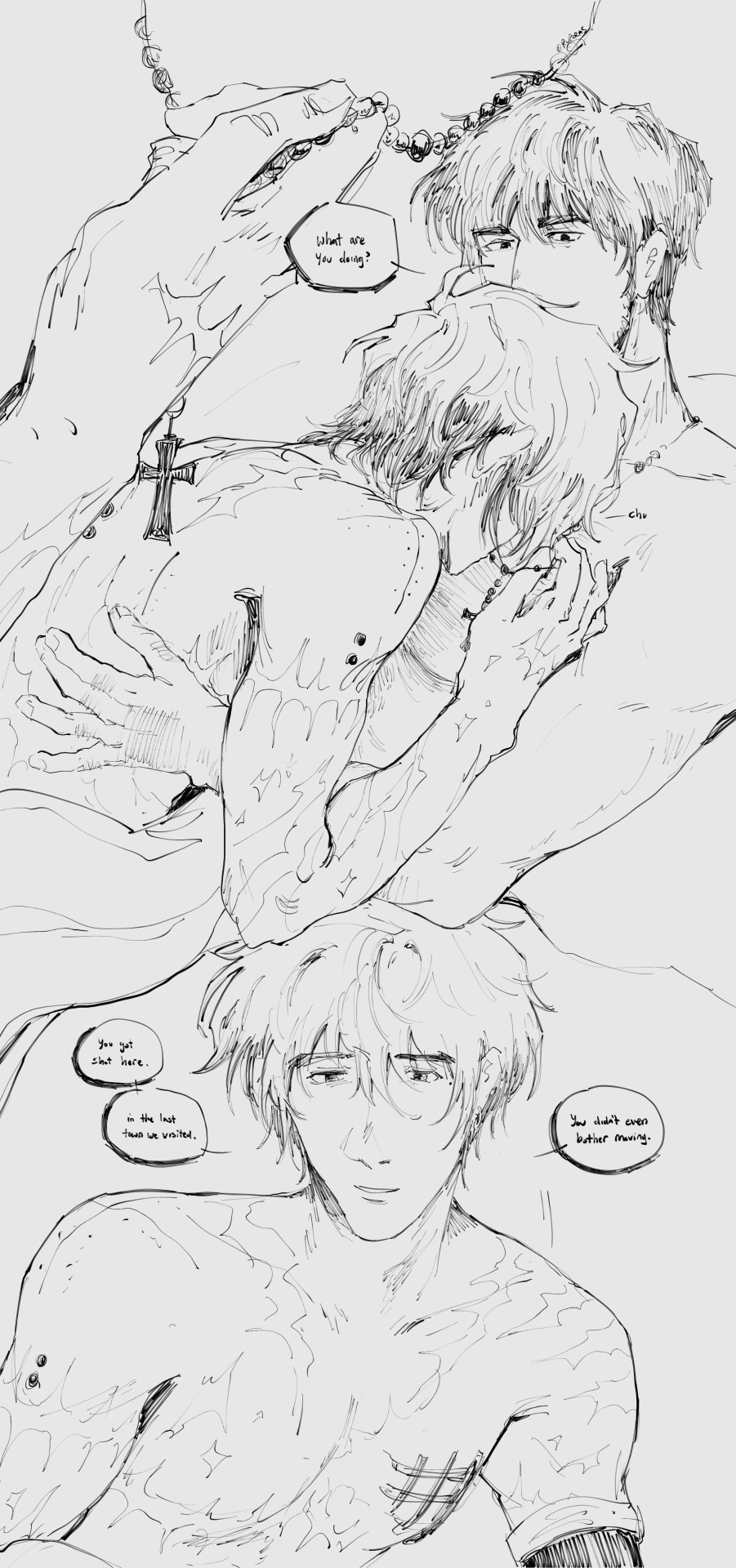


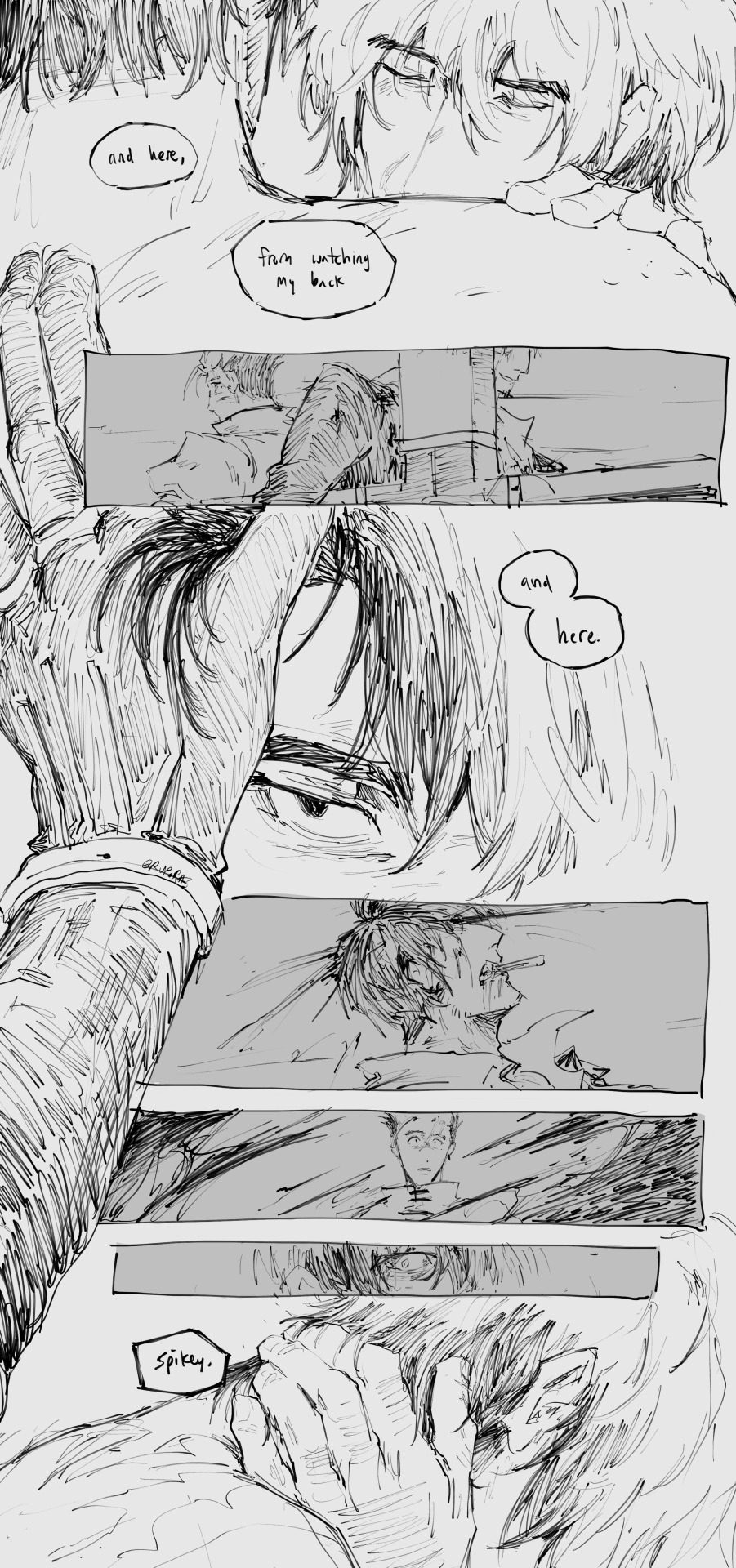
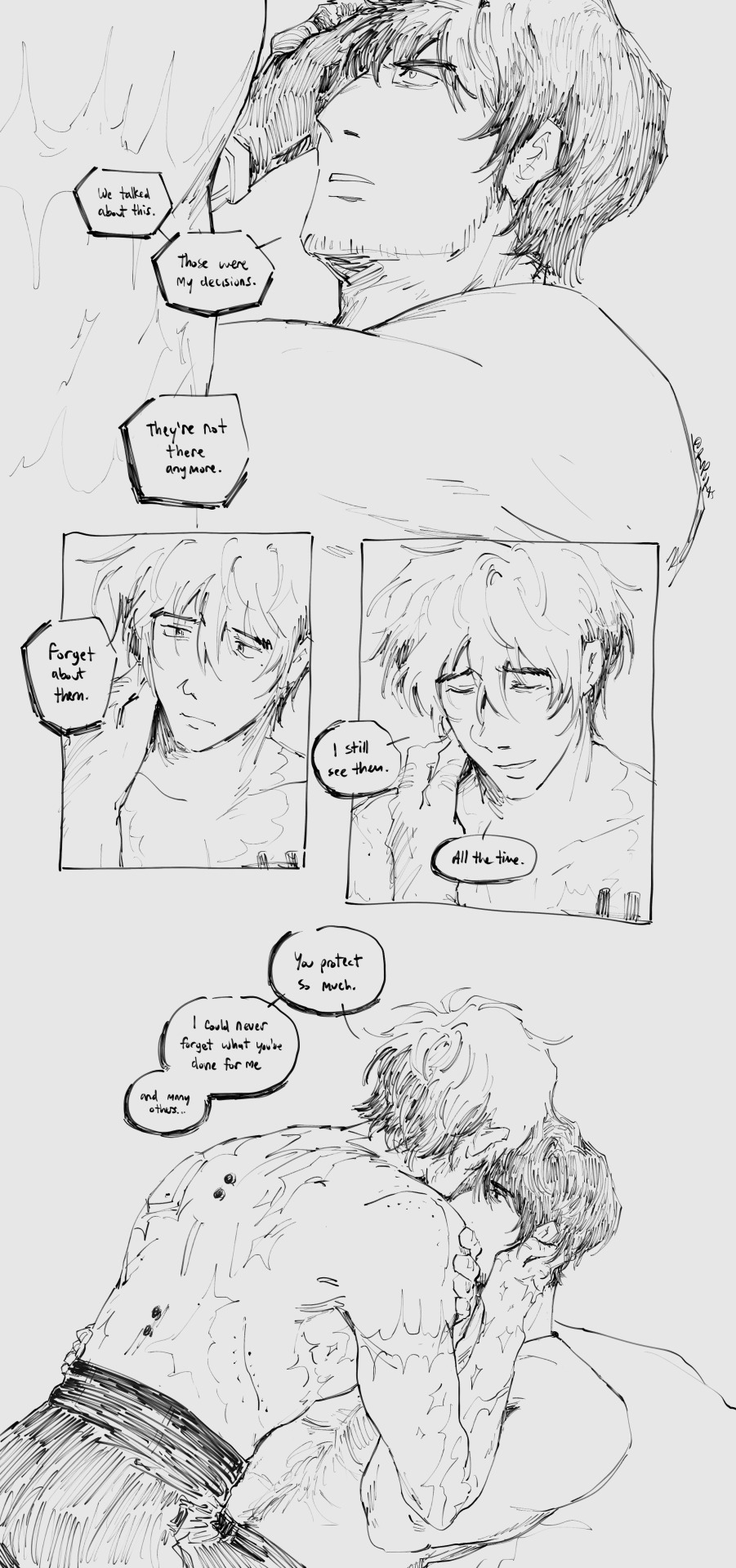
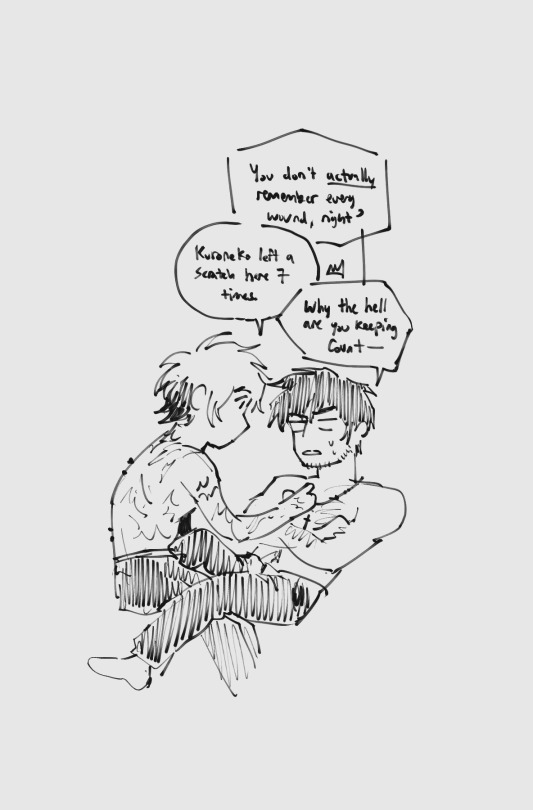
invisible scars (referenced previous talk here)
[ID: A colourless, digital Trigun comic of Vash and Wolfwood talking about Wolfwood's scars. They're both laying in bed and topless. Vash lays on top of Wolfwood, playing with the rosary around his neck. Then, Vash kisses a spot on Wolfwood's chest. Wolfwood asks, "What are you doing?" Vash smiles sadly, "You got shot here. In the last town we visited. You didn't even bother moving."
Vash props himself up over Wolfwood, who frowns slightly. Wolfwood is quiet for a moment before he says, "You remember that, huh?" Vash grabs Wolfwood's left wrist and brings it to his face. "And here." He kisses another spot there. "When you helped free the hostages from that robber..." Wolfwood dismissively says, looking away, "Was a lucky shot." Vash huffs, “Don’t brag. Jeez.”
Half of Wolfwood's expression is shown, eyes returning to Vash who is now sitting up, continuing to say, "And..." Vash goes on and kiss Wolfwood's right palm. "You got cut here, even though that girl was aiming at me." A moment from the past flashes, of Wolfwood grabbing a knife aimed at Vash, his hand bleeding.
At present, Vash moves down and puts another kiss on Wolfwood's right shoulder. "And here, from watching my back." Another memory flashes of Wolfwood and Vash back to back. Vash looks back as Wolfwood grins while holding Punisher, bleeding from multiple gunshots in his shoulder.
"And," Vash combs up Wolfwood's hair to reveal his forehead, "Here." A final memory shows Wolfwood with a regeneration vial in his mouth while getting shot on his temple. The next panel is framed in blood with Vash at the center, eyes wide and stunned in horror. The next panel is a closed up shot of Wolfwood's eye, locked on Vash's face.
Back to present, Vash’s head is bowed down as Wolfwood raises a hand to his nape and says, “Spikey.”
Wolfwood looks serious and frowns as he says, "We talked about this. Those were my decisions. They're not there anymore. Forget about them." Vash looks very sad before he smiles ruefully and says, "I still see them. All the time." He leans down so they touch foreheads. Wolfwood’s sorrowful expression can be seen as Vash says, "You protect so much. I could never forget what you've done to me. And many others..."
In the last image, they're drawn more cartoonishly. Wolfwood sweats and asks, "You don't actually remember every wound, right?" Vash points at a spot on his chest. "Kuroneko left a scratch here 7 times." Wolfwood, startled, says, "Why the hell are you keeping count—" End ID]
Credits for ID here and here
#vashwood#vash the stampede#nicholas d wolfwood#trigun#trigun maximum#another scars comic for one of the vw week days!!!! frankly i think about their scars WAY too often . most notably wolfwood's because#it really symbolizes a lot for him imo bc for vash it's a history of all the people that's ever harmed him betrayed him and the trust he has#given to humanity despite it all. its a beautiful reflection of his character and then u look at ww and presumably#since we dont really see him half naked Ever (shame) and i mean. i guess technically its a hc -- i assume he wouldn't have any scars bc#of the regen potions (which is why he doesnt have his t scars btw the regen pot took them away :pensive:)#in a way its like washing his hands of blood. giving him the body of someone who might never been involved in a fight never held a gun#but he knows thats not true yet he cant really do anything about it anyway bc he's still just human. if he stops taking the regen pots#he can't press forward. so its just a rinse and repeat and growing accustomed to whats inflicted on him because he knows it'll go away at#the end of the day. he's human but he's also not he's far beyond what could be considered a normal human but he still just is.#mortal but also not immortal. idk. i overthink about it a lot GMSKGMDK frankly i dont think it matters THAT much in the context of trimax#but it means a lot to me somehow. also thinking about how no matter how many times ww kills he's never numb to the sensation of it. maybe#the adrenaline gets to him for the beginning half but ive been rereading like.. vol 3? and that entire fight for ww#u can slowly see him spiral as he keeps on going on. anyway anyway. i love ww#ruporas art
4K notes
·
View notes
Text
An Ode to Yargı: Part 1
Yargı has been a life-changing show to watch. I haven't felt this way about a tv show - in any language - in a long time (or ever? if i think about it).
TV shows are unique in that they are vulnerable to being driven by ratings. Depending on the country, TV shows are either renewed season by season based on ratings and revenues and may only have 1 season of 16-17 episodes (most K Dramas), or in the case of Turkish dizis (like Yargı), driven by the ratings of each episode. Let me stop here and provide a disclaimer: I am not Turkish, I haven't been watching Turkish dizis for very long, and I probably don't understand the intricacies and complexities of how the Turkish dizi industry works. I only started watching dizis after stumbling upon a youtube fan edit for Nazli & Ferit from Dolunay during the COVID-19 lockdown in Spring 2020. The rest is history. However, it's not hard to see that because dizis mostly depend on the ratings of each episode, the story which the writers set out to tell can suffer as a result. This is not to say that dizis are the only tv shows to fall victim to this pattern. Even with season-by-season renewal, American shows suffer from this phenomenon as well. The first couple seasons of a show might be amazing with very crisp writing, but then the show steadily declines in the later seasons, show-runners change, cast members leave, and you really question why you're still watching the show. Since diving into dizis and learning the bare minimum about Turkish ratings, it seems this phenomenon is just more underscored.
But Yargı has been a game-changer. It's been absolutely beautiful to watch the writer's story play out so far, with so much attention given to all the details, and the actors have truly done an amazing job bringing it to life. At 17 episodes (over 34 hours!), I am still just as excited for the next episodes as I was when I watched the first couple of episodes. It's been extremely comforting to hear the writer (Sema Ergenekon, who is amazingly talented and a genius honestly) openly say that she has the story and the rest of the episodes mapped out, indicating a strategic plan with a definite endpoint. I don't think I could handle a situation where the show was extended for no reason and the plot stretches and suffers as a result. Yargı has truly earned its viewers' trust.
However, beyond the trust that Yargı has earned from me, the show and its fans are also teaching me a lot and subtly causing me to examine my own internalized ideologies, in a way that I can easily say few shows in the world have done for me.
On the surface, I find myself relating to Ilgaz and Ceylin and their struggles in ways that are more obvious. Ilgaz is the oldest and nothing but perfection has been expected of him. When he tells his father Metin (I lovingly refer to him as Metinhoe/Metintrash) that he had to grow up so quickly and was never allowed any mistakes, it really resonated for me. Ceylin, on the other hand, has been trying her best to sustain her family despite their trials and tribulations, and her strongest familial bond is with her younger sister, again reflecting certain aspects of my own life.
However, the beauty of Yargı is that the characters are much deeper than what we are initially exposed to, and more human than what most shows allow of their characters. The best example of this is Ceylin. Ceylin is a flawed character. She is scrappy and resilient, as life has forced her to be, and goes after what she needs, though not always in the most acceptable way. But she knows who she is and does not pretend to be anything else. I am actually so in awe of this characteristic of hers. She is also loving, supportive, compassionate, empathetic, merciful, and forgiving, but is convinced (thanks in large part to her family) that she isn't deserving of fulfilling and loving relationships, so she runs away from things. When women talk about wanting to see flawed female characters, THIS is what we mean. Ceylin's flaws are authentic, born out of her life experiences, and while inconvenient at times, they are highly relatable and honestly endearing because of that. She is NOT flawed for the purpose of being endearing to the male gaze (NOT a manic pixie dream girl or any of her variants). I love Ceylin and who she is because she inspires me to be strong, even when mistakes are made and life is going off the rails. Ceylin is beautiful because of who she is, not in spite of it, and it took seeing this character for me to realize how true that is for us as individuals - that our flaws don't necessary diminish us or make us less worthy of love.
Ilgaz is also a beautiful character, but one I have more questions about and am still understanding. I think this is because I have so deeply internalized the way male characters are generally portrayed that whenever Ilgaz does something outside that structure, I have to grapple with it and it takes me time to understand it. Ilgaz has been living a life in golden chains, but chains nonetheless. His parents worked hard to help set him up for a respected career as a prosecutor and as we learn more about Ilgaz, it's obvious that just because he is a very respected prosecutor -- and he is morally upright, dedicated to doing his job well -- his family (see: Metinhoe/Metintrash) expects his personal life to be equally black and white and by the book. However, when his life intersects with Ceylin's, we start to learn what Ilgaz himself values. Yes, he values integrity, honesty, and hard work, especially with regards to his job and the law, but he is also very loving and supportive. Unlike his father, he does not believe that integrity, honesty, and hard work are mutually exclusive with expressing compassion and understanding, especially when life gets hard. Like Ceylin, he seeks to understand his loved ones and does whatever is in his power to help them. He is the exact opposite of a toxic man.
Edit: Yargı is now on episode 51. Since then, a lot more thoughts have been thunk, so I will write a part 2. However, the overall message is still the same, watch Yargı for clear skin.
#yargı#yargi#ceylin x ilgaz#ceylin kaya#ceylin erguvan#ilgaz kaya#turkish dizis#ilcey#thoughts#quality show writing#flawed female characters#an ode
14 notes
·
View notes
Text
I saw “The Fablemans” a few days ago (it’s great), and as I watched it I couldn’t help but think of Spielberg/Kamiński‘s prior collaboration “West Side Story” (2021).
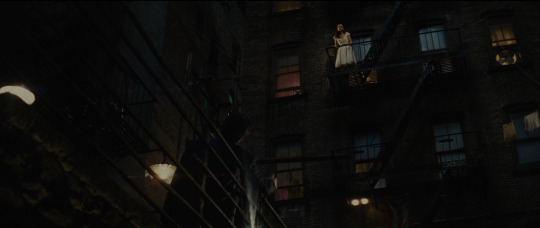
Their adaptation of the musical had an incredibly difficult task given how iconic the 1961 film is, particularly in its expressionistic use of color. For their spin, the two masters made it their own through some powerful use of shadows with light being used as representative of Maria. Considering what their adaptation (in Tony Kusher’s outstanding screenplay) does with Tony — adding a bit more darkness to his character — the aesthetic choices with their relationship emphasizes the idea that he is a beast of the underworld locked up until this light of love enters into his life. He’s denied his humanity until he sees it reflect off of him through her. It is rather beautiful. New York feels equal parts ground and stylized, fantasy and reality, lived-in and dreamlike. This conflict in the aesthetic of synthetic blues to warm yellows is the conflict within Tony — compassion and retribution. Notice how these colors as well as the presence/absence of light plays out in some of the screenshots below. Kamiński‘s cinematography is incredibly effective in motivating the arguments of the screenplay. These images they craft can stand alone in propelling the emotional weight forward.
Like all tragedy, there is a release found in the pain. Catharsis. The upper west side of the movie is undergoing forced evolution, gentrification. All the poors are being forced out so the rich can move in. Their neighborhood torn down for an arts center. Functionally, this is a dystopia. And this dystopia breeds sectarian conflict, racial strife, and outright bloodshed. Yet amidst all this suffering — love blossoms. Transcendent love. Compassion is the only thing that breeds hope within during times of great suffering. Compassion for the other, compassion for the enemy. Nothing can stop the death of the world, but the light of love can cause us to move out of the suffering. The “Beast” becomes a real boy again through true love. The two worlds become one. The flesh dies, the soul lives on. That bright soul, that light soul. That loving soul.
A few evenings ago, after I saw “The Fabelmans”, I flipped through “West Side Story: The Making of the Steven Spielberg film” and Spielberg ends the book with a quote that gets at the timeless of the story:
“The message of ‘West Side Story’ is what is going to live forever...What it’s about is what we are living in this country today—a time of division and distrust, and the waste of human life through violence, racisms, and xenophobia. And even though the story is a tragedy, like all great tragedies, including ‘Romeo and Juliet’ [inspiration for the original musical], ‘West Side Story’ suggests that hope can be born amid devastation and despair, and thanks to [Leonard] Bernstein and [Stephen] Sondheim’s score, there’s a feeling that despite all the sorrow and ugliness, love transcends...That’s why I wanted to tell this story right now. It is even more about now than it was about then.”
Let the light break through the underground cage we all lock ourselves up into from time to time.


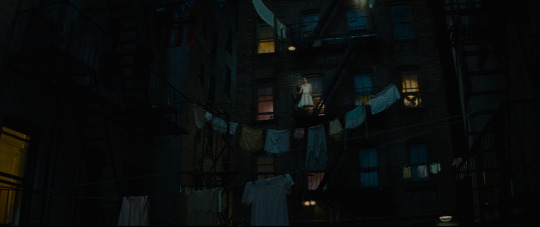
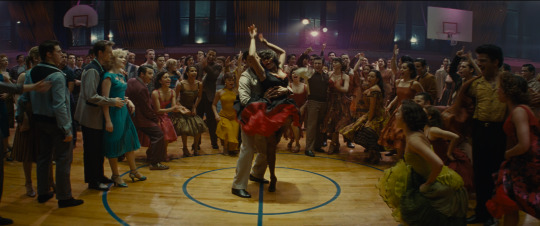
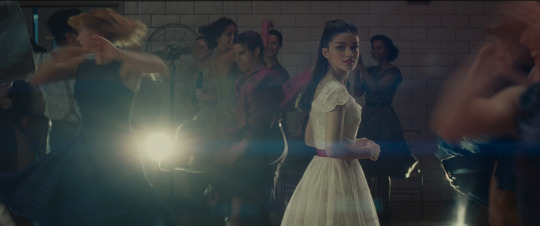
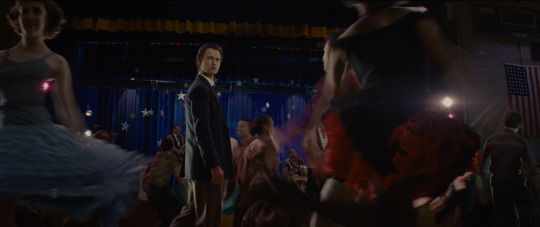
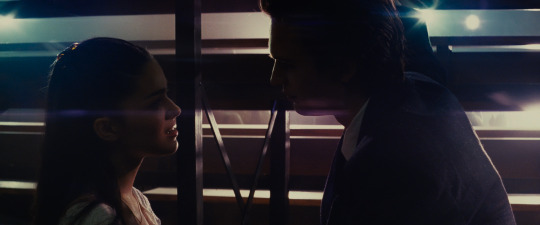

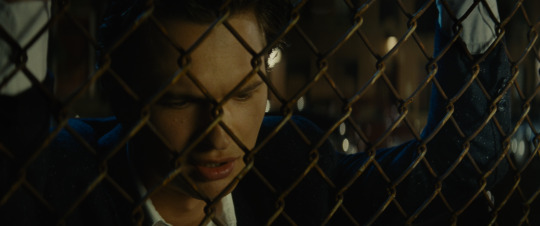
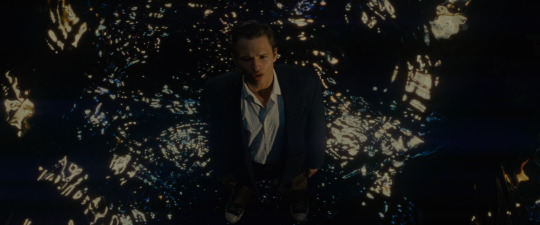





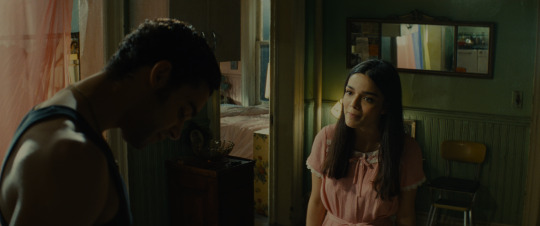

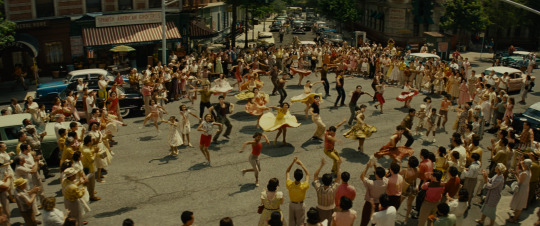


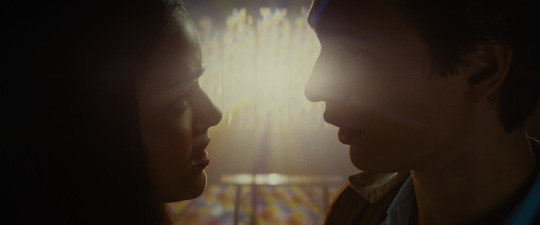






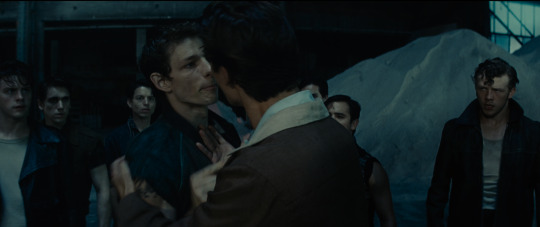
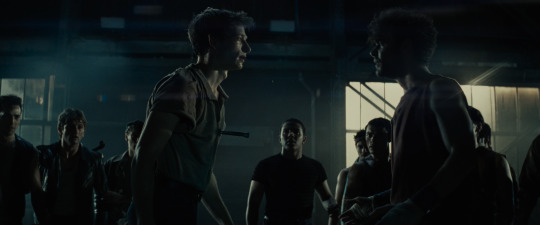
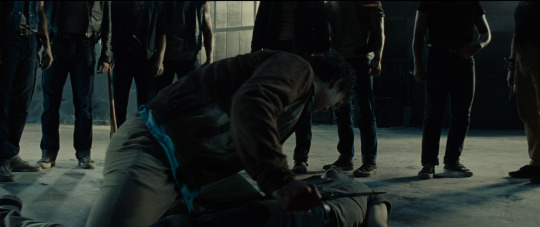

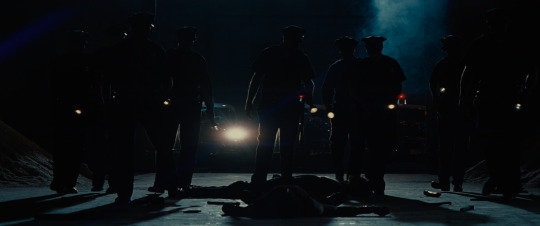

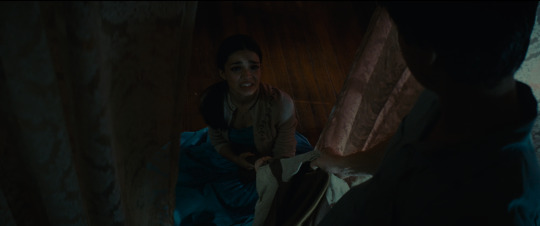

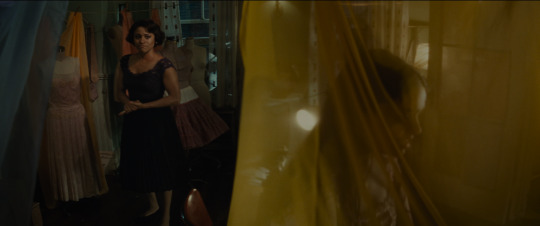
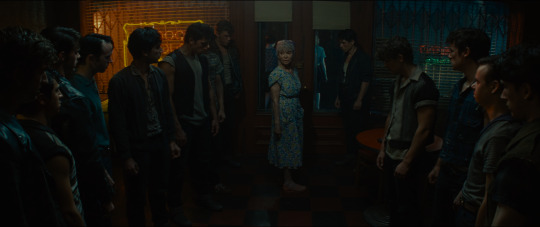
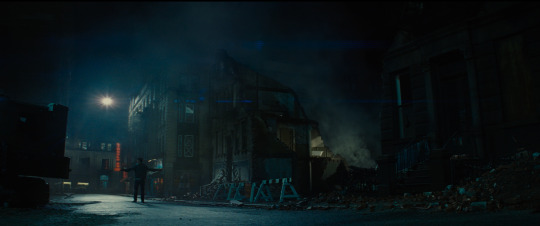
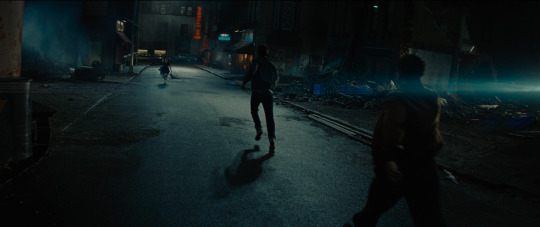


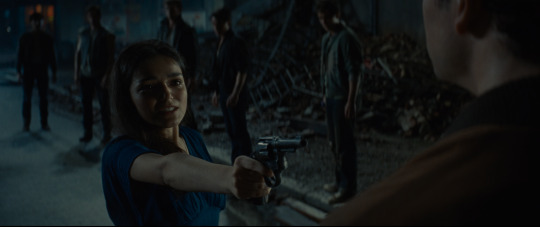
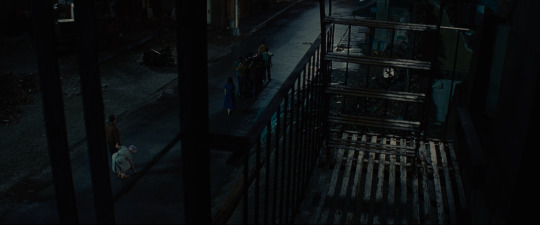
#steven spielberg#janusz kamiński#west side story#seriously kamiński was robbed of dp at the oscars last year#if he or spielberg win this year i'm treating as them winning for this masterpiece
8 notes
·
View notes
Text
Khalik Allah: How ethical is his approach?
Photographer Khalik Allah has earned praise for his distinctive and provocative approach to photography. He is well-known for his portraiture and street photography, frequently focused on New York City's marginalized communities. His images have been praised for being unfiltered, honest, and intimate, portraying the true character of his subjects. However, others have questioned whether his work is morally justifiable. It's possible to argue that the use of high contrast and black and white photographs reinforces prejudices about African American communities and the "ghetto" stereotype. In addition, some have questioned if he has his subjects' consent because of the manner he photographs and portrays them, particularly given that many of them look to be under the influence of drugs or alcohol. As people in an altered state might not be able to completely understand or accept the reproduction of their image, this raises further concerns about the validity of their consent. There have also been concerns about how correctly their experiences and viewpoints are reflected in the final result.

Examining the ethical considerations of photographers like Khalik Allah is crucial in a time when representation and authenticity are major topics in the media and in photography. It is vital to take into account the potential harm that might result from maintaining unfavorable preconceptions while shooting underrepresented communities, as well as to make sure that the individuals are appropriately portrayed and that their consent has been secured. It can be argued that Allah's use of high contrast and black and white photography maintains the "ghetto" stereotype and promotes inaccurate representations of African American neighborhoods, especially with Allah including sound-bites such as this quote from a drug addict: “This is pure hell for me, millions would just bring me more problems” (Hoffman). Given the extensive history of inaccurate and stereotypical portrayals of these communities in the media, this is especially problematic. The use of strong contrast in Allah's artwork can also be regarded as accentuating the subjects' otherness and further separating them from reality.

Supporters counter that Allah's purposeful aesthetic decision to employ high contrast and black and white photography helps to highlight the humanity and beauty of his subjects. His work is characterized by a raw and personal manner that is said to lower barriers between photographer and subject and enable a more accurate and honest portrayal. His work has been commended for its sincerity and authenticity, and he has received acclaim for his ability to give voice to the neglected and underprivileged people he pictures (Nogues). According to Allah himself, “the people who I photograph, most people wouldn’t stop and speak to them because they just want to get away from them as soon as they can”
In addition to questions about the ethics of his visual style, some have also raised concerns about the way Allah represents his subjects. It is important to consider whether the subjects of his photographs have given their consent to be photographed and whether the final product accurately represents their experiences and perspectives. This is particularly important in the context of marginalized communities, where the representation of their experiences has often been shaped by outside perspectives and distorted by stereotypes.
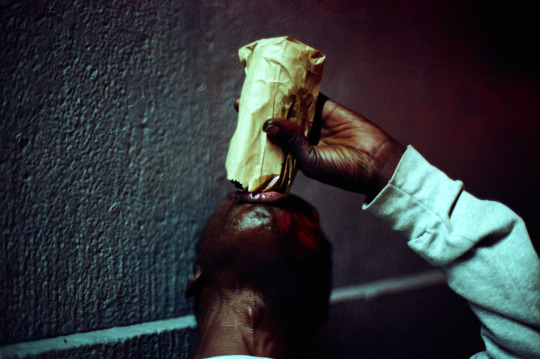
There is no doubting the influence and significance of Khalik Allah's work in the field of photography and filmmaking, despite these criticisms. He captures the essence of his subjects in a way that is uncommon in the mainstream media with photos that are strong, personal, and genuine. So much so that he always asks his subjects abstract questions while shooting them, steering clear of their pasts to eliminate all judgment from their relationship (Rapold). Artists like Khalik Allah play a key role in providing voice to oppressed populations and opposing the unfavorable and stereotypical depictions that have long been promoted in the mainstream media in a world where representation and authenticity are of the utmost importance.
In conclusion, the question of whether Khalik Allah's work is ethically sound and authentic provokes strong feelings from both fans and critics. Regardless of one's personal position, it is crucial to think about the ethical issues related to portraying marginalized cultures, as well as to make sure that the persons being photographed are appropriately portrayed and that their consent has been secured. We can endeavor to create a more equitable and just representation of underrepresented communities in media and beyond by carrying on these crucial conversations and evaluating the work of artists like Khalik Allah.
Sources:
Hoffman, Jordan. “Field Niggas Review – Hallucinatory Portrait of New York Street Life.” The Guardian, Guardian News and Media, 15 Oct. 2015, https://www.theguardian.com/film/2015/oct/15/field-niggas-review-hallucinatory-portrait-of-new-york-drug-addicts.
Nogues, Clotilde. “Khalik Allah's Tender Street Photography Spotlights the Humans of Harlem.” i, https://i-d.vice.com/en/article/m7g3bn/khalik-allah-harlem-photography-profile.
Rapold, Nicolas. “Khalik Allah's Movie Captures Harlem Faces and Voices by Moonlight.” The New York Times, The New York Times, 17 Apr. 2015, https://www.nytimes.com/2015/04/19/movies/khalik-allahs-movie-captures-harlem-faces-and-voices-by-moonlight.html.
3 notes
·
View notes
Note
Let me just wax-poetic about our favorite Gotham crime lord for a brief moment.
We all know there’s an unconventional (dare I say “ugly”) quality to Oz’s character design. And it’s not news that despite all of that he’s still the sexiest mofo alive. But, If I may say something hopefully not too radical, he has a sort of je-ne-sais-quoi about him. There’s a natural beauty that comes from his dark features (the deep eyes, and pushed back hair—even despite the fact that its thinning). His lips are delicate and soft, even with the scarring. And that quality is reflected in his eyes again too. When he laughs, there’s a boyish quality to his features. This man is pushing 50, yet he doesn’t exude “old” (even with the limp and grandpa wardrobe) And while he’s heavy (and yes, I know we all simp for fat boys here), his body is unequivocally hot. And not just to people who appreciate larger bodies. I don’t believe were he designed to be svelte or even just slightly portly that it would make him appear more “conventionally attractive”. That is because his weight is sensual. Just note the way the camera captures his more languid movements (I’m of course referring specifically to the close up shot of his plump delving inside his wallet). It’s Victorian. It’s regal. Need I say more? And on another note, while many people lust for the battered villain, it’s clear that his limp and scars were crafted by the design team in what they assumed would be a “non romantic light”. To make him appear less polished. Hardened. Dangerous. Yet Colin, with his passionate soul, transformed that physicality through an active emotional inner life. It’s clear that Oz hides behind a meticulously crafted wall of pseudo bravado and decadence to hide the insecurity and loneliness underneath. And (à la the misunderstood men of a Brontëan novel) there’s nothing more gothically romantic than that. The conventionally unattractive qualities of this man aren’t only handsome to some because “beauty is in the eye of the beholder”. Rather, this man, despite everything society would deem a shortcoming, is in and of himself handsome. Plain and simple. There needn’t be any mental gymnastic to get to that point. Like phantom of the opera, sometimes a character is created with such raw humanity that they can only be perceived by others are beautiful. It’s abstract art—Picasso, if you will. And Oz is a prime example of this (which can be partially credited to Colin’s portrayal and to the writing—especially in that wonderful deleted scene. But, of course, partial thanks most certainly go to artists like you who take the little you are given and continue to flesh out his character beyond of the world of the movie)💜
YES TO ALL OF THIS!!!!
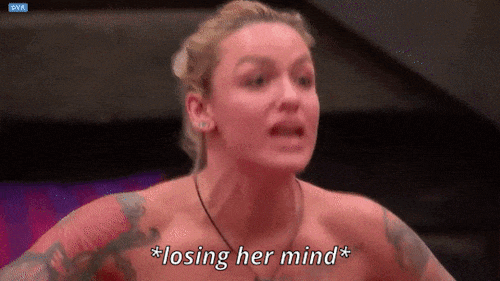
11 notes
·
View notes
Text
The Witch of Portobello by Paulo Coelho: Book Review
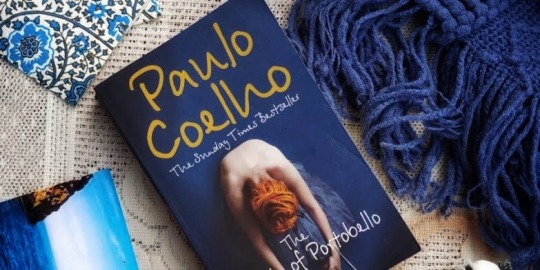
The Witch of Portobello is the second Paulo Coelho book I've read, the first was The Alchemy, which inspired me to read more of his writings. However, The Witch of Portobello was a fairly large book for me then, so I had to reread it from the beginning because I couldn't finish it the first time. It took a very long time to finish the book. The book's title can make it seem like a fantasy book, but that is not the case. It's a realistic book with characters and a place that reflects real life. Despite the fact that being in a trance is not a part of the commonplace, someone who attempts to enter one can be viewed with skepticism.
In this book, Coelho works with the return to the goddess religion, the interpretation of love, and the feminine part of the Divine within the theme of searching for one’s true self and opening to the energies of the world. The question central to the story is "How do we find the courage to be true to ourselves - even if we are unsure of who we are?" The work also expounds a selection of philosophies, which bear a certain degree of similarity to Coelho's teachings from previous novels and carry the characteristic imprint of his own ideas, as well as a citation regarding the ephemeral nature of desires, which appears in most of Coelho's novels.
The writer elucidates the opinion that the Church has deviated by its stringent rules to the point where it no longer serves Jesus Christ, or as put in his words in one of the interviews: "It's a very long time since they've allowed me in there
A mystery introduces the narrative. The hunt for Athena is ongoing as individuals recall and discuss their time spent with her. Athena was adopted by a family in Beirut after being born to an unmarried Romani mother in a gypsy clan in Transylvania. Speaking about significant events in her life, such as her early years, learning that she was adopted, working at a bank, and learning calligraphy in Dubai. Her adoptive parents treated her like one of their own and provided for all of her needs. She did, however, have a part of her that was dissatisfied with the state of affairs since she felt something was lacking from herself. most importantly, how she came across to others throughout all of these encounters. We learn about Athena from the perspectives of several people. When she goes to Romania to find her birth mother, she meets a Scottish woman who becomes her teacher in the search for the universal Mother, a kind of New Age paganism that promises a healing path out of the chaos of modern living. When Athena moves back to London, her popularity increases, and she develops a following as well as detractors, Christians who accuse her of Satanism and being a witch. At turns didactic and colorless, Coelho’s narrative captures nothing of the wonder and potential beauty of a life devoted to the spirit. Instead, Athena seems little more than a self-indulgent girl.
I like Athena's honesty about her life and opinions. How unadulterated she is, embracing her ignorance before living. We can see how she is embracing life while also resolutely overcoming every obstacle. She is unworldly yet incredibly brilliant, mysterious yet transparent, and loved by many while also being despised by many. I adore the way the author portrayed the character's paradox. The profundity of Paulo Coelho's works is what I adore most about them. Athena's narrative is given from a variety of viewpoints rather than from her own, which would have been the simplest method to convey her sentiments and emotions. Because of this, the book is intriguing and the character is mysterious. The author has the ability to convey important ideas in a subtle and effortless manner that will leave you feeling deeply affected.
There are several literary works in existence that may be used to describe a mirror of the author's life or a current example of human existence. Every piece of literature has a message that the authors intend to convey to the reader. One of them is Paulo Coelho, whose book The Witch of Portobello, which was based on the real-life account of a mysterious lady named Athena, was released in 2008. Paulo Coelho uses narrative storytelling techniques to tell this story, drawing on the perspectives of both persons who knew him intimately and those who knew him only passingly. The Witch of Portobello tale has the capacity to alter readers' perceptions of love, passion, joy, and sacrifice. The Witch of Portobello is similar to fragments of the testimonies of witnesses in documented narratives regarding the personage of Athena. In her search for her actual identity, Athena was enigmatic. Heron is a journalist who develops feelings for Athena. Andrea, a visual artist, believes that Heron was taken from Heron's hands by Athena on her own. Athena's ex-husband Lukas is the father of Viorel Athena, a kid they had together. Edda is a spiritual Athena and a former doctor who now teaches. Athena, the foster mother, is Shamira R. Khalil. Liliana, Athena's mother, who had the guts to fling herself from a cradle, and other characters. The narratives mention Athena's knowledge. It figures synthetically invisibly. Although it should have ended tragically, Athena's courage to be independent and true to herself was brutally murdered. In this story, the rigorous rituals of the Catholic religion are also criticized. When priest Giancarlo refused to give Athena the Eucharist because she had been divorced from her husband, Athena became enraged and denounced the Catholic church. Until Athena discovered new spiritual calm via calligraphy and dancing.
There are numerous characters in this novel, but I will just focus on two for the study. They are Edda and Athena. I use the showing method and the telling method to analyze the characters' characterization. The showing method entails the author stepping back, so to speak, to let the characters reveal themselves directly through their dialogue and actions, while the telling method is a direct method of character revelation. This method includes the following characterization through the use of names, which are frequently used to provide crucial clues that aid in characterization.
Athena became tough when She kept constantly destroying and rebuilding herself. From being lost to being found, from being divorced to finding new love, from working in a bank to selling real estate in the desert, everything in her life had followed the same pattern. One item alone remained undamaged, and that was her son. The one common factor was her.
“People think that a woman’s only dream is to get married and have children. And given what I’ve told you, you probably think that I’ve suffered a lot in life. It’s not true, and, besides, I’ve been there already. I’ve known other men who wanted to “protect” me from all those tragedies. What they forget is that, from Ancient Greece on, the people who returned from battle were either dead on their shields or stronger, despite or because of their scars. It’s better that way: I’ve lived on a battlefield since I was born, but I’m still alive and I don’t need anyone to protect me.” (Coelho, 2008: 26)
“I had a long, hard struggle with myself not to get up from my chair. Gradually, though, the anxiety gave way to contemplation, and I started listening to my soul – or intuition or primary emotions, or whatever you choose to believe in. Whatever you call it, that part of me had been longing to speak to me, but I had always been too busy” (Coelho, 2008: 71)
“Let me finish. In that journey where suffering seemed to be the only rule, I struggled for things for which there was no point struggling. Like love, for example. People either feel it or they don’t, and there isn’t a force in the world that can make them feel it. We can pretend that we love each other. We can get used to each other. We can live a whole lifetime of friendship and complicity, we can bring up children, have sex every night, reach orgasm, and still feel that there’s a terrible emptiness about it all, that something important is missing. In the name of all I’ve learned about relationships between men and women, I’ve been trying to fight against things that weren’t really worth the struggle. And that includes you.” (Coelho, 2008: 210)
According to the quote conversation, Athena is a strong lady who constantly aspires to rise above her circumstances. She even discovered new spiritual avenues, such as dancing with a vertex vantage point and calligraphy, to get serenity and love.
“The Shadow is our dark side, which dictates how we should act and behave. When we try to free ourselves from the Persona, we turn on a light inside us and we see the cobwebs, the cowardice, the meanness. The Shadow is there to stop our progress, and it usually succeeds, and we run back to what we were before we doubted. However, some do survive this encounter with their own cobwebs, saying: ‘Yes, I have a few faults, but I’m good enough, and I want to go forward.’ At this moment, the Shadow disappears and we come into contact with the Soul. By Soul, Jung didn’t mean ‘soul’ in the religious sense; he speaks of a return to the Soul of the World, the source of all knowledge. Instincts become sharper, emotions more radical, the interpretation of signs becomes more important than logic, perceptions of reality grow less rigid. We start to struggle with things to which we are unaccustomed and we start to react in ways that we ourselves find unexpected.” (Coelho, 2008: 171)
Everyone struggles to be satisfied with what they have. Apart from me. Apart from you. Apart from a few people who will, alas, have to make a small sacrifice in the name of something greater. (Coelho, 2008: 176)
The quote from Athena's narrator illustrates what it means to struggle because it shows how we may be resilient when facing challenges we know we can overcome in order to satisfy a new goal for a better existence. She was an unsatisfied soul who learned to suffer in silence throughout her life after being abandoned repeatedly by her birth mother, her husband, and the church she was so devoted to. She was searching for the meaning of life through calligraphy and dance, reaching the Vertex, and she passed on this energy, the key to reviving everyone else.
Athena developed into an ambitious lady when she set out to share what she had learned with others. At that point, she was speaking about eternity and bringing the soul to the fore. Through dancing, reaching the Vertex, calligraphy, and sharing this energy, the key to reviving everyone else, she was attempting to comprehend the purpose of existence. She then made the decision to share what she had learnt with others.
“‘Do you mean teach dance or calligraphy?’ ‘Those are things you know about already. You need to teach what you don’t know, what the Mother wants to reveal through you.’” (Coelho, 2008: 134)
The quotation dialogue explains that she decided to teach some people when she got back from Dubai about all the things she learned as the meditating of dance and calligraphy.
Athena had always intrigued me. Ever since she first started coming to the church, it seemed to me that she had one clear ambition: to become a saint. She told me – although her fiancé didn’t know this – that shortly before civil war broke out in Beirut, she’d had an experience very similar to that of St Thérèse of Lisieux: she had seen the streets running with blood. One could attribute this to some trauma in childhood or adolescence, but the fact is that, to a greater or lesser extent, all creative human beings have such experiences, which are known as ‘possession by the sacred’. Suddenly, for a fraction of a second, we feel that our whole life is justified, our sins forgiven, and that love is still the strongest force, one that can transform us forever. (Coelho, 2008: 30)
She’d just got back from Dubai with plenty of money and a desire to share everything she knew about the mysteries of magic. This time, she’d spent only four months in the Middle East: she sold some land for the construction of two supermarkets, earned a huge commission and decided that she’d earned enough money to support herself and her son for the next three years, and that she could always resume work later on if she wanted. Now was the time to make the most of the present, to live what remained of her youth and to teach others everything she had learned. (Coelho, 2008: 141)
In the quote, Athena's narrator reveals that once everything has been destroyed, she rebuilds it all. She was bringing the soul to the surface at that point because she had the ambition to go teach others something she didn't know. She was an unsatisfied soul who had learned to suffer in quiet throughout her life and was searching for the purpose of life. Despite success and luxury, she was never satisfied. Through dancing, reaching the Vertex, calligraphy, and sharing this energy, the key to rejuvenation, with everyone else, she was able to reconstruct what had been destroyed.
Edda is the one who taught Athena witchcraft. Edda is a generalist with a disposition that is open, enthusiastic, busy-minded, and confident. She also has a spontaneous attitude and is constantly upbeat. Until Athena received a new spirit, she was always there to support her in whatever way possible in her spiritual life. She studied witchcraft from Edda while relaxing and feeling good about the things we want out of life.
“The wood has started to speak,’ said Athena, as if this were something perfectly normal, and that was good, it meant that miracles were now becoming part of her life. ‘What is it saying?’ ‘Nothing at the moment, only noises.’ Minutes later, she heard a song coming from the fire. ‘Oh, it’s wonderful!’ There spoke the little girl, not the wife or mother. ‘Stay just as you are. Don’t try to concentrate or follow my steps or understand what I’m saying. Relax and feel good. That is sometimes all we can hope for from life.” (Coelho, 2008: 237)
“And what about the difficult moments?’ she asked. ‘That isn’t an intelligent thing to ask. Remember what you said just now: you are loved, wanted, protected.’ ‘I’ll do my best.’ Her eyes filled with tears. Athena had understood my answer.” (Coelho, 2008: 238)
According to the cited dialogue, Edda encouraged her to meditate while feeling at ease. Even the wood that has begun to talk may be heard by her. Their spirituality includes a desire to experience life and environment. Even more, she gave her advice and counseled her to have faith in her own ability to feel safe, protected, and loved. Edda's life was healed in a variety of methods, including witchcraft and her spirit's guidance.
Athena’s great problem was that she was a woman of the twenty-second century living in the twenty-first. Did she pay a price? She certainly did. But she would have paid a still higher price if she had repressed her natural exuberance. She would have been bitter, frustrated, always saying ‘I’ll just sort these things out, then I’ll devote myself to my dream,’ always complaining ‘that the conditions are never quite right. (Coelho, 2008: 10-11)
According to the quotation, Edda thought Athena was the ideal lady for the twenty-second century. She always tried her best to support her student while she conducted her own introspection. Although she is unsure of her sentiments regarding the friendship's reciprocation, she regards you as her friend. She made an effort to warn her that the world wasn't prepared for the kinds of changes Athena wished to bring about. She recalled having a few restless nights before deciding to give her complete freedom to follow her heart's desires.
Let's now discuss the setting of the book. By setting, we mean not only the physical location that frames the action but also the time of day or year, the climactic circumstances, and the historical era in which it occurs. In literature, setting is used to accomplish a variety of goals. There are five different types of settings. The reader's understanding of the term "setting" in literary works is the largest. Setting encompasses both the location and the moment the activity is carried out. Setting, at its most basic level, aids the reader in visualizing the action of the piece and lends the characters believability and an air of authenticity. Setting as background for action in this autobiographical novel begins when Athena lived in Lebanon, moved to London, and travelled to Dubai.
“She had come to London fleeing the civil war that had broken out in Lebanon. Her father, a Maronite Christian (Editor’s note: a branch of the Catholic Church, which, although it comes under the authority of the Vatican, does not require priests to be celibate and uses both Middle Eastern and Orthodox rituals), had started to receive death threats because he worked for the Lebanese government, but despite this, he couldn’t make up his mind to leave and go into exile. Then Athena, overhearing a phone conversation, decided that it was time she grew up, that she assumed her filial responsibilities and protected those she loved.” (Coelho, 2008: 24)
Transylvania serves as the backdrop for the events in this book's setting. Athena was adopted by a Lebanese family when she was a little child and the daughter of a Romanian woman who lived in Transylvania. When a civil crisis broke out in Lebanon in 2006, she was raided there. Despite being affluent and well-protected. It serves as the setting and back drop for the action.
Athena's relocation to London is then explained by the setting of place that serves as the backdrop for the action in this book.
The following day, he began taking unexpected steps, and two weeks later we were on a boat bound for London. Later, we would learn that, although there are no reliable statistics, during those years of civil war about 44,000 people died, 180,000 were wounded, and thousands made homeless. The fighting continued for other reasons, the country was occupied by foreign troops, and the hell continues to this day. ‘It’s going to last for a long, long time,’ said Sherine. Unfortunately, she was right” (Coelho, 2008: 22)
When finally she landed in London, that moment served as the backdrop for the events in this book. In this tale, they appear to have traveled to London by ship as refugees rather than as beggars. The Lebanese population is dispersed over the world, and her father quickly discovered a means to restart his firm, and life continued. Since dancing was her love and she was able to attend reputable institutions, Athena opted to pursue an engineering degree after completing secondary school. After visiting Dubai, she returned to London to tell her parents that she was looking for her Transylvanian biological mother. On her way she met a woman named Edda, the woman had taught her with witchcraft.
“This moment arrived almost a year later. By then, Athena was already known in Dubai and recommended customers to dine in my tent, and through them I learned that her career was going very well: she was selling pieces of desert! One night, the emir in person arrived, preceded by a great retinue. I was terrified; I wasn’t prepared for that, but he reassured me and thanked me for what I was doing for his employee.” (Coelho, 2008: 82)
“I learned calligraphy while I was in Dubai. I dance whenever I can, but music only exists because the pauses exist, and sentences only exist because the blank spaces exist. When I’m doing something, I feel complete, but no one can keep active twenty-four hours a day. As soon as I stop, I feel there’s something lacking. You’ve often said to me that I’m a naturally restless person, but I didn’t choose to be that way. I’d like to sit here quietly, watching television, but I can’t. My brain won’t stop. Sometimes, I think I’m going mad. I need always to be dancing, writing, selling land, taking care of Viorel, or reading whatever I find to read. Do you think that’s normal?” (Coelho, 2008: 88)
Given that Athena is set to take a month off, it could be a good idea for her to send her other salespeople to a calligraphy class. One of the many means Allah, blessed with His Name, presents to us is calligraphy. It teaches patience and respect, as well as objectivity and elegance, but we can acquire all of those things through dancing.
Now let's go on to the story's narrative. To examine this novel, I will use five plot types which are exposition, rising action, falling action, and resolution.
Exposition in this novel occures when Athena born in Romania of gypsy descent, the adopted daughter of Lebanese parents, with a privileged upbringing in Beirut. She has a small boy and is divorced. She works in a bank and resides in London. Sherine Khalil is her true name. She has a strong religious vocation as a young kid and claims to have seen angels and saints, which both amazes and concerns her parents.
“Please, don’t call her Athena. Her real name is Sherine. Sherine Khalil, our much-loved, muchwanted daughter, whom both my husband and I wish we had engendered. Life, however, had other plans – when fate is very generous with us, there is always a well into which all our dreams can tumble. We lived in Beirut in the days when everyone considered it the most beautiful city in the Middle East.” (Coelho, 2008: 14)
“Once they were living in London, her parents invited her out to supper at one of the most expensive restaurants in the city, and explained, very carefully, that she had been adopted. Athena pretended to be surprised, hugged them both, and said that nothing would change their relationship.” (Coelho, 2008: 25)
The quotation explains when Athena real name is Sherine Khalil. And she even wants to make her parents impress cause of her even Athena knows that she is an adopted daughter. After Athena’s mother reveals that Athena’s adopted, but they always loved her like their own child. However, they have no idea how to deal with her strange behaviour at times. Athena’s different. She’s restless, adventurous and sometimes wild like a wind and sometimes strong and independent.
The rising of action occurs when She goes to a London University to pursue Engineering at the age of 19 but it’s not what her heart wanted. She simply decides one day that she wants to leave college, get married, and have a child. She chooses to marry young and gave birth to a boy named Voriel with Lucas Petterson. They subsequently split to give Voriel a better life and to let go of their financial problems, but their marriage didn't endure. Athena begins creating her new life after being left all by herself with a young child to care for. This may have happened in this case because the mother herself had been abandoned and wanted to show her child all the love she had never experienced from her birth mother.
“This is the universe I’ll have to live with for the rest of my days. I’ll get married, have children, and the past will become a distant memory, which will, in the end, make me ask myself: How could I have been so blind? How could I have been so ingenuous?” (Coelho, 2008: 6)
“The next day, I told Athena that I wanted a divorce. She asked me why. ‘Because I love you. Because I love Viorel. And because all I’ve done is to blame you both because I had to give up my dream of becoming an engineer. If we’d waited a little, things would have been different, but you were only thinking about your plans and forgot to include me in them.’ Athena said nothing, as if she had been expecting this, or as if she had unconsciously been provoking such a response.” (Coelho, 2008: 38-39)
The conflict occurred when Athena was at the Church, she was said by Saint Father Giancarlo Fontana a dear friend that she cannot perform one of the activities in the Catholic Church due to her divorce, and she got Eucharist. She then became enraged, cursed at the church, and vowed never to visit again. She had abandoned her adoration of God and had been separated from it. Their friendship was then broken off. She then starts out as a single mother and uses dancing to get over her issues. She subsequently moved into an apartment where she started learning an old traditional dance called "in quest of the Vertex" from Parvel Poldeibeski, the flat's owner. She always had a great day thanks to this dance, which helped her to relax. When she taught others this dance at work, her coworkers tended to function better and show appreciation for Athena more frequently.Peter Sherney, the bank manager, was so impressed that he asked during a meeting for this to be done in other banks. She and Viorel traveled to Dubai where she studied calligraphy since she wanted to pursue her aspirations and see the world. Later, Athena returned to London to inform her parents that she had to travel to Transylvania to look for her birth mother. She went inside a restaurant and met Heron, a man who was filming a documentary on the nation. As the music started to play, Athena started performing her signature dance, which got everyone in the restaurant's attention. Owner Visho was shocked by this. Visho was aware of Athena's mother and her previous residence. When he learned that Athena was her daughter, he made the decision to take her to her. They got to know each other and remained with her for a week; they enjoyed seeing each other. She eventually began studying witchcraft with Edda, and it was through this that she honed her abilities in prophecy and mind reading.
“I know now what happened to Athena, and I wonder: Did it all start there, or was it already in her soul? I think of the many Athenas and Lukáses in the world who are divorced and because of that can no longer receive the sacrament of the Eucharist; all they can do is contemplate the suffering, crucified Christ and listen to His words, words that are not always in accord with the laws of the Vatican. In a
few cases, these people leave the church, but the majority continue coming to mass on Sundays, because that’s what they’re used to, even though they know that the miracle of the transmutation of the bread and the wine into the flesh and the blood of the Lord is forbidden to them.” (Coelho, 2008: 46)
“I was glad she wasn’t forcing me to make decisions that went beyond my capabilities or my principles. But I must confess that I had a personal interest in that whole story, because I, too, dreamed of finding some way of ‘recycling’ my potential. I promised that I’d do what I could, and Athena began to describe the long, esoteric dance she performed in search of the so-called Vertex (or was it Axis, I can’t quite remember now). As we talked, I tried to set down her mad thoughts in objective terms. An hour proved not to be enough, and so I asked her to come back the following day, and together we would prepare the report to be presented to the bank’s board of directors.” (Coelho, 2008: 63)
When Edda asked Athena to send the students back to London, falling action begins. She met Andrea Mccain, an actress who is Heron's girlfriend, while she was in London. Andrea and her coworkers learned from her how to meditate before undertaking performances and other witchery-related activities. After she gained fame, she started instructing a large group of individuals in London. Later on, she started hearing rants and death threats from people who claimed that she was teaching people witchcraft and that doing so was a method to get closer to the devil.
“It was probably gipsy witchcraft. And at the same time, the image came back to me of the little girl at school, who said she’d seen ‘a woman in white’. ‘Don’t get caught up in things like that, they’re the De vil’s work.” (Coelho, 2008: 126)
“‘Firstly, I wish to state that I’ve been receiving death threats. Secondly, I want you to promise that, even if I die, you will wait five years before you allow anyone to come else to listen to this tape. In the future, people will be able to tell what is true and what is false. Say you agree; that way you will be entering a legally binding agreement.’” (Coelho, 2008: 252)
“’As I was saying, I’ve been receiving death threats. I’ve been getting anonymous phone calls. They insult me and say I’m a menace, that I’m trying to restore the reign of Satan, and that they can’t allow this to happen.’” (Coelho, 2008: 253)
“’I’m not afraid of death. If I were to die today, I would carry with me moments that few people my age have had the chance to experience. What I’m afraid of, and this is why I’ve asked you to record our conversation today, is that I might kill someone.’” (Coelho, 2008: 254)
The conflict was resolved when Athena fought back and continued to make threats, but more people kept showing up and causing disturbances. The majority of Athena's demonstrations took place on Portobello Road. The problem was constantly escalating in size. A call was made to Heron a few months later informing him that Athena Khalil had been brutally killed.
I decided to write a series of articles on the reawakening of the Mother, which provoked a number of offensive letters accusing me of ‘promoting paganism’, but which were otherwise a great success with our readership. Two months later, when I was just about to have lunch, a colleague at work phoned me. The body of Sherine Khalil, the Witch of Portobello, had been found in Hampstead. She had been brutally murdered. (Coelho, 2008: 261)
This is the kind of novel that will transform the way readers think about love, passion, joy, and sacrifice. We have come across many incidents where women who follow their passion by breaking all the expectations of society are being excommunicated by labeling them as witches, and we are also familiar with the historical events of witch hunting which is mentioned in the novel as well. Athena was someone who realized her true femininity and she always followed what her heart said.
The novel also gives the message to follow our passion and do what makes us really alive, if we do so we can achieve spiritual ecstasy or a state of trance. If you are a fan of Paulo Coelho, you should definitely read it.
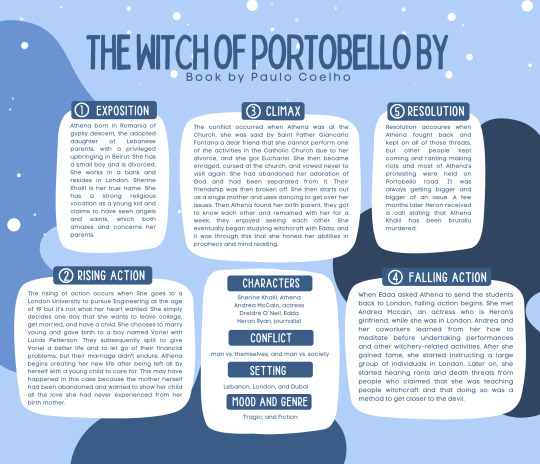
3 notes
·
View notes
Text
Media Market Research (and why its undermining all the things you love)
Trying to understand what is dysfunctional about Hollywood is an epic task, and the answers are like the stars – arguably infinite. Hollywood is dysfunctional for literally more reasons than I could count.
But market research plays a fairly heavy role in its dysfunction (IMO) and the time has finally come for me to add my professional two cents about this issue. (This rant of mine has been building for a while, FYI. Hence why it is so...comprehensive. There is a tl;dr section towards the bottom, if you want the high level summary)
***
For the last 4+ years I’ve worked in the field of market research, almost exclusively with major media makers like Warner Bros., NBCU, AMC/BBCA, Viacom, FOX (before Disney acquired them), A+E, etc. (this past year I quit the job where I was doing this work for a variety of reasons, many of which will become clear as you keep reading, but I am still listed as a consultant on the company website):
https://www.kresnickaresearch.com/who/ (Rachel)
And just for comparison, here is a Halloween selfie I took 4 years ago and posted on my blog, so you can see I am who I say I am.
I know a fair amount about how market research on major media franchises is conducted and how it influences production, and a lot of these choices can also be at least somewhat tied back to the massive flaws in the market research industry and its impact.
***
First, at the highest level, you need to understand market research in general is not well-conducted much of the time. Even the people doing a reasonably good job at it are VERY limited in doing it well because of financial constraints (clients don’t want to spend more than they have to), time constraints (clients want everything done as fast as humanely possible) and just the inherent problems within the industry that are decades old and difficult to fix.
For example, all market research ‘screens’ participants to make sure they qualify to participate (whether it is a mass survey, a focus group, a one-on-one interview, etc.). So, we screen people based on demographics like race, gender, age, household income, to get representative samples. But people are also screened based on their consumption habits. You don’t want to bring someone into a focus group about reality TV if they don’t watch reality TV. They aren’t going to have anything useful to say.
However, a lot of the people who participate in market research have made a ‘side-gig’ out of it and they know how to finesse the process. Basically, they’ve learned how to lie to get into studies that they aren’t a good match for because most market research is paid, and they want the money. So, a lot of TV and film market research is being done on people who don’t actually (or at least don’t regularly) watch those shows or movies or whatever but have learned how to lie well enough in these screening processes to make it through.
And because of the aforementioned time and money issue, clients don’t want to spend the time or money to actually find GOOD participants. They just accept that as an inevitable part of the market research process and decide not to let it bother them too much.
So, a fair number of the people representing YOU as a media consumer are people who may not be watching Supernatural (for example) at all or who watch a rerun occasionally on TNT but haven’t been watching consistently or with ANY amount of investment whatsoever. You can see why that creates very skewed data.
But that’s just the tip of the skewed iceberg.
***
Second, media market research is conducted in line with the norms of market research more broadly, and this is a huge problem because media is a very atypical product. How people engage with media is far more complex and in depth than how they engage with a pair of jeans, a car, or a coffee maker.
There are only so many things that matter to people when it comes to liking or not liking a coffee maker, for example. Is it easy/intuitive to use? How much space does it take it on my counter? How expensive is it? Does it brew the coffee well? Maybe does it match my décor/kitchen aesthetic? Can I make my preferred brand of coffee in it? The things you as a consumer are going to care about when it comes to a coffee maker are limited, fairly easy to anticipate in advance, and also easy to interpret (usually).
How people mentally and emotionally approach MEDIA? Whole other universe of thing. Infinitely more complex. And yet it is studied (more or less) as if it is also a coffee maker.
This is one of the many reasons I decided to leave the media market research field despite my desire to have some ability to positively influence the process. As so often seems to be the case, I fought the law and the law won. I could never make the other people I worked with in the industry understand that the questions they were asking were not all that useful a lot of the time and they weren’t getting to the heart of the matter. They were just following industry standards because they didn’t know any better and none of them want to admit they don’t REALLY know what they’re doing.
Which leads me to point 3.
***
Most of the people doing this research don’t have any expertise in media or storytelling specifically. They are typically trained as social scientists in the fields of psychology, anthropology, sociology, or math/statistics. And many of them do not have any kind of specialization or education in media/storytelling beyond the English classes they took in high school and the one Media Studies course they took as an elective in college. Most of them have a very unsophisticated understanding of narrative structure, thematics, tropes, subtext, etc. They mainly think in terms of genres at the VERY broadest level.
Also, not infrequently, they don’t watch or have much knowledge of the shows they are supposed to be doing research on, beyond what they’ve read on IMDb or Wikipedia or what is generally common knowledge. Unless they by chance happen to watch the shows themselves (which often they don’t) they often know very little about the shows they are crafting these questions about. Again, partly because they think it is like the coffee maker, and you don’t need to understand it in any depth to research it. (I know this must sound insane to you as avid media consumers, but that is the general attitude among those who do market research)
There is such a lack of sophistication in how people in the business side of the industry understand media and storytelling. Most of them are either MBAs or social scientists and their training has not prepared them to examine fictional works with the kind of depth that people in the Humanities (who are specifically trained to study texts) have. Somehow, despite the fact that the Humanities is all about understanding texts, that is the one discipline they make almost no use of in the business side of Hollywood.
And boy howdy does it show.
***
Point 4 – average consumers CANNOT ARTICULATE WHY THEY LIKE THINGS. Particularly media things.
I know this sounds condescending, but it is my honest observation. It is unbelievably hard to get people to have enough self-awareness to explain why they actually like things, especially things as mentally and emotionally complex as media.
What typically happens when you ask people why they like a TV show or movie, for example? They will tell you what they most NOTICE about the TV show or movie, or what is distinctive to them about it (which may or may not have anything to do with what they actually LIKE about it). They will say things like “I like the genre”, “I think it’s funny”, “The car chases are exciting”, “I want to see the detective solve the puzzle.”
Sometimes you can get them to talk about what they find relatable about it, if you push them a little. But often they leave it at either the level of literal identity (young black woman), basic personality traits (she’s a social butterfly and so am I) or situations they’ve personally experienced (I relate to this story of a man losing his father to cancer because I lost a close family member to cancer).
But the vast, vast, vast majority of them can’t go to the deeper level of:
a) Why X representation of a young black woman feels accurate/authentic/relatable and Y representation doesn’t
b) Why it matters to me that X,Y,Z aspects of my personality, identity, experience get reflected in media whereas I don’t really care about seeing A,B,C aspects of my personality, identity, or experience reflected in media
c) How and why they are relating to characters when they can’t see the literal connection between their identity/experience and the character’s identity/experience. (For example, many people have argued that women often relate to Dean Winchester because a lot of his struggles and past negative experiences are more stereotypical of women – being forced to raise a younger sibling on behalf of an actual parent, being seen and treated as beautiful/sexually desirable but vacuous/unintelligent, his body being treated as an instrument for a more powerful group to quite literally possess, etc. Part of the reason Supernatural has always been such a mystery/problem for the CW and Warner Bros is they could never crack the code at this level. Never.)
Part of the reason they can’t crack these codes is average people CANNOT give you that kind of feedback in a survey or a focus group, or even an in-depth interview (much of the time). They just don’t have the self-awareness or the vocabulary to get it at that level. Let alone asking them to articulate why Game of Thrones is compelling to them in an era where wealth disparity is creating a ruling class that is fundamentally incompetent at maintaining a just/functional society, which is especially concerning at this particular moment, given the existential threat we face due to climate change.
And the truth is, that IS part of what people – even average people – are responding to in Game of Thrones. But what they’ll tell you when you do market research on it is: they like the dragons, they like the violence, they relate to Tyrion Lannister being a smart mouth, maybe they’ll say they like the moral ambiguity of many of the conflicts (if they are more sophisticated than average).
But the ‘Dean Winchester is heavily female coded despite his veneer of ultra-masculinity’ or the ‘Game of Thrones is a prescient metaphor for the current political dynamics and fissures of modern western society’ is the level you ACTUALLY need to get to. And most market research can’t get you that because the people ASKING the questions don’t know what to ask to get to this level, and most of the respondents couldn’t give you the answers even IF you were asking them the right questions (which usually you are not)
And I’m not saying average people are dumb because they can’t do this. But it requires practice, it requires giving the matter a great deal of in-depth thought, and most people just don’t care enough about it to do that while taking a market research survey.
(I know this is going to feel counter-intuitive to people on Tumblr. But you have to remember, you are NOT average media consumers. You are highly atypical media consumers who have far more self-awareness and a much more sophisticated engagement with media than the average person watching TV. If you didn’t, you probably wouldn’t be here talking about it in the first place)
Point 4.1 – People also lie/misrepresent their own experiences to market researchers because they want to maintain certain self-narratives.
You have no idea how many people would get disqualified from our surveys for saying they watched less than 5 hours of TV a week. And sure, that might actually be true for a few of them. But if you watch TV with any regularity at all (which most people in modern America do) you probably watch more than 5 hours a week. The problem is, people think it makes them sound lazy to say they watch 15-20 hours a week, even though that’s about 2-3 hours a day (which actually isn’t THAT high).
People lie and misrepresent their behaviors, thoughts and feelings because it can be socially uncomfortable to admit you do what you actually do or feel how you actually feel, even in the context of an anonymous survey, let alone a focus group or a one-on-one interview. People want to make themselves look good to THEMSELVES and to the researchers asking them questions. But that makes the market research data on media (and lots of other things) very questionable.
For example, one finding we saw more than once in the surveys I was involved in conducting was people would radically downplay how much the romance elements of a story mattered to them, even large portions of female respondents. When we would ask people in surveys what parts of the story they were most invested in, romances ALWAYS came out among the lowest ranked elements. And yet, any passing familiarity with fandom would tell you that finding is just WRONG. It’s wrong.
People are just flat out lying about how much that matters to them because of the negative connotations we have around being invested in romance. And never mind the issue of erotic/sexual content. (I don’t mean sexual identity here, I mean sexy content).
The only people who will occasionally cop to wanting the erotic fan service is young men (and even they are hesitant to do so in market research) and women frequently REFUSE to admit that stuff in market research, or they radically downplay how much it matters to them and in what ways. There is still so much stigma towards women expressing sexuality in that way.
Not to mention, you have to fight tooth and nail to even include question about erotic/sexual content because oftentimes the clients don’t even want to go there at all, partly because it is awkward for everyone involved to sit around crafting market research questions to interrogate what makes people hot and bothered. That’s socially awkward for the researchers doing the research and the businesspeople who have to sit in rooms and listen to presentations about why more women find Spock sexier than Kirk. (Which was a real thing that happened with the original Star Trek, and the network couldn’t figure out why)
Aside from people not have enough deeper level self-awareness to get at what they really like about media content, they also will lie or misrepresent certain things to you because they are trying to maintain certain self-narratives and are socially performing that version of themselves to researchers.
***
Point 5 – Qualitative data is way more useful for understanding people’s relationships to media. However, quantitative data is way more valued and relied upon both due to larger market research industry standards and because quantitative data is just seen as harder/more factual than qualitative data.
A lot of media market research involves gathering both qualitative and quantitative data and reporting jointly on both. (Sometimes you only do one or the other, depending on your objectives, but doing both is considered ‘standard’ and higher quality). However, quantitative data is heavily prioritized in reporting and when there is a conflict between what they see in qualitative versus quantitative data, the quant data is usually relied upon to be the more accurate of the two.
This is understandable to an extent, because quantitative surveys usually involve responses from a couple thousand participants, whereas qualitative data involves typically a few dozen participants at most, depending on whether you did focus groups, individual interviews, or ‘diaries’/ethnography. The larger sample is considered more reliable and more reflective of ‘the audience’ as a whole. However, quantitative surveys usually have the flattest, least nuanced data, and they can only ever reflect what questions and choices people in the survey were given.
In something like focus groups or individual interviews or ethnographies, you still structure what you ask people, but they can go “off script.” They can say things you never anticipated (as a researcher) and can explain themselves and their answers with more depth.
In a survey, participants can only “say” what they survey lets them say based on the questions and question responses that are pre-baked for them. And as I’ve already explained, a lot of times these quantitative surveys are written by people with no expertise in media, fiction, or textual analysis, and so they often are asking very basic, not very useful questions.
In sum, the data that is the most relied upon is the least informative, least nuanced data. It is also the MOST likely to reflect the responses of people who don’t actually qualify for the research but have become good at scamming the system to make extra money. With qualitative research, they are usually a little more careful screening people (poorly qualified participants still make it through, but not as often as with mass surveys, where I suspect a good 35% of participants, at least, probably do not actually qualify for the research and are just working the system).
Most commonly, when market research gets reported to business decision-makers, it highlights the quantitative data, and uses the qualitative data to simply ‘color in’ the quantitative data. Give it a face, so to speak. Qualitative data is usually supplemental to quant data and used more to make the reports ‘fun’ and ‘warm’ because graphs and charts and stats by themselves are boring to look at in a meeting. (I’m not making this up, I can’t tell you how many times I was told to make adjustments on how things were reported on because they didn’t want to bore people in the meeting).
(Sub-point – it is also worth noting that you can’t report on anything that doesn’t fit easily on a power point slide and isn’t easily digestible to any random person who might pick it up and read it. The amount of times I was told to simplify points and dumb things down so it could be made ‘digestible’ for a business audience, I can’t even tell you. It was soul crushing and another reason I stopped doing this job full time. I had to make things VERY dumb for these business audiences, which often meant losing a lot of the point I was actually trying to make)
Point 5.1 – Because of the way that representative sampling works, quantitative data can be very misleading, particularly in understanding audience/fandom sentiments about media.
As I’m sure most of you know, sampling is typically designed to be representative of the population, broadly speaking. So, unless a media company is specifically out to understand LGBTQ consumers or Hispanic/Latinx consumers, it will typically sample using census data as a template and represent populations that way. Roughly 50/50 male/female. Roughly even numbers in different age brackets, roughly representative samplings of the racial make-up of the country, etc. (FYI, they do often include a non-binary option in the gender category these days, but it usually ends up being like 5 people out of 2000, which is not enough of a sample to get statistical significance for them as a distinct group)
There is a good reason to do this, even when a show or movie has a disproportionately female audience, or young audience. Because they need enough sample in all of the “breaks” (gender, race, age, household income, etc.) to be able to make statistically sound statements about each subgroup. If you only have 35 African American people in your sample of 1000, you can’t make any statistically sound statements about that African American cohort. The sample is just too small. So, they force minimums/quotas in a lot of the samples, to ensure they can make statistically sound statements about all the subgroups they care about.
They use ratings data to understand what their audience make up actually is. (Which also has major failings, but I’ll leave that alone for the minute) With market research, they are not usually looking to proportionately represent their audience, or their fandom; they are looking to have data they can break in the ways they want to break it and still have statistically significant subgroups represented.
But that means that when you report on the data as a whole sample – which you often do – it can be very skewed towards groups who don’t make up as large a portion of the show’s actual audience, or even if they do, they don’t tend to be the most invested, loyal, active fans. Men get weighted equally to women, even when women make up 65% of the audience, and 80% of the active fandom.
Granted, they DO break the data by gender, and race, and age, etc. and if there are major differences in how women versus men respond, or younger people versus older people, they want to know that...sometimes. But here’s where things get complex.
So, if you are doing a sample of Supernatural viewers. And you do the standard (US census-based) sampling on a group of 2000 respondents (a pretty normal sample size in market research). ~1000 are going to be female. But with something they call “interlocking quotas” the female sample is going to be representative of the other groupings to a degree. So, the female sample will have roughly equal numbers of all the age brackets (13-17, 18-24, 25-34, etc.). And it will have roughly 10% non-heterosexual respondents, and so on. They do this to ensure that these breaks aren’t too conflated with each other.
(For example, if your female sample is mostly younger and your male sample is mostly older, how do you know whether it is the gender or the age that is creating differences in their responses? You don’t. So, you have to make sure that all the individual breaks (gender, race, age) have a good mix of the other breaks within them, so groups aren’t getting conflated)
But what that means is, Supernatural, whose core fandom is (at a conservative guess) 65% younger, queer, women, gets represented in a lot of statistical market research sampling as maybe 50-100 people, in a 2000-person survey. 50-100 people can barely move the needle on anything in a 2000-person survey. Furthermore, usually in the analysis of data like this, you don’t go beyond looking at 2 breaks simultaneously.
So you may look at young female respondents as a group, or high income male respondents, or older white respondents, but you rarely do more than 2 breaks combined. And the reason for that is, by the time you get down to 3 breaks or more (young, Hispanic, women) you usually don’t have enough sample to make statistically significant claims. (It also just takes longer to do those analyses and as I explained in the beginning, they are always rushing this stuff). To do several breaks at a time you’d have to get MUCH larger samples, and that’s too expensive for them.
And again, I want to stress, this type of sampling isn’t intended to sinisterly erase anyone. Kind of the opposite. It is intended to make sure most groups have enough representation in the data that you can make sound claims about them on the subgroup level.
The problem is that it can create a very skewed sense of their overall audience sentiment when they take the data at ‘face value’ so to speak, and don’t weight segments based on viewership proportion, or fandom engagement, etc.
Point 5.2 – Which leads me to my next point, which is that fandom activity that doesn’t have a dollar amount attached to it doesn’t make you a ‘valuable’ segment in their minds.
One of the breaks they ALWAYS ask for in data like this is high income people, and people who spend a lot of MONEY on their media consumption. And they do prioritize those people’s responses and data quite a bit.
And guess what – young women aren’t usually high-income earners, and although some of them are high spenders on media, high spending on media and media related merch skews toward higher income people just because they HAVE more disposable income.
Older white men are usually the highest income earners (absolutely no surprise) and they are more likely in a lot of cases to report spending a lot on the media they care about.
Having expendable income makes you more important in the eyes of people doing market research than if you’ve spent every day for the last 10 years blogging excessively about Supernatural. They don’t (really) care about how much you care. They care about how much money you can generate for them. And given that young audiences don’t watch TV live anymore, and they give all their (minimal) expendable income to Netflix and Hulu, you with your Supernatural blog and your 101 essays about Destiel is all but meaningless to many of them (from a business standpoint)
Now, some of them kind of understand that online fandom matters to the degree that fandom spreads. Fandom creates fandom. But if the fandom you are helping to create is other young, queer women with minimal income who only watch Supernatural via Netflix, well, that’s of very limited value to them as well.
I don’t want to suggest they don’t care about you at ALL. Nor do I want to suggest that the “they” we are talking about is even a cohesive “they.” Different people in the industry have different approaches to thinking about fandom, consumer engagement and strategy, market research and how it ought to be understood/used, and so on. They aren’t a monolith.
BUT, they are, at the end of the day, a business trying to make money. And they are never going to place the value of your blogging ahead of the concrete income you can generate for them.
(Also, highly related to my point about people lying, men are more likely to SAY they have higher incomes than they do, because it’s an ego thing for them. And women are more likely to downplay how much money they spend on ‘frivolous’ things like fandom because of the social judgement involved. Some of the money gender disparity you see in media market research is real, but some of it is being generated by the gender norms people are falsely enacting in market research– men being breadwinners, women wanting to avoid the stereotype of being frivolous with money)
***
In sum/tl;dr:
Point 1 – Market research in general is not well conducted because of a variety of constraints including time, money, and the historical norms of how the industry operates (e.g., there being a large subsection of almost professionalized respondents who know how to game the system for the financial incentives)
Point 2 – Media is a highly atypical kind of product being studied more or less as if it were equivalent to a coffeemaker or a pair of jeans.
Point 3 – Most of the people studying media consumption in the market research field have no expertise or background in media, film, narrative, storytelling, etc. They are primarily people who were trained as social scientists and statisticians, and they aren’t well equipped to research media properties and people’s deeper emotional attachment and meaning-making processes related to media properties.
Point 4(etc.) – Average consumers typically don’t have enough self-awareness or the vocabulary to explain the deep, underlying reasons they like pieces of media. Furthermore, when participating in market research, people lie and misrepresent their thoughts, behaviors, and emotional responses for a variety of reasons including social awkwardness and preserving certain self-narratives like “I’m above caring about dumb, low-brow things like romance.”
Point 5 (etc.) – Quantitative data is treated as way more meaningful, valuable, and ‘accurate’ than qualitative data, and this is a particular problem with media market research because of how varied and complex people’s reactions to media can be. Also, the nature of statistical sampling, and how it is done, can massively misrepresent audience sentiments toward media and fail to apprehend deeper fandom sentiments and dynamics. There is also a strong bias towards the responses of high income/high spending segments, which tend to be older and male and white.
Side but important point – Research reports are written to be as entertaining and digestible as possible, which sounds nice in theory, but in practice it often means you lose much of the substance you are trying to communicate for the sake of not boring people or making them feel stupid/out of their depth. (Because god forbid you make some high-level corporate suit feel stupid)
***
What can be done about this?
Well, the most primary thing I would recommend is for you to participate in market research, particularly if you are American (there’s a lot of American bias in researching these properties, even when they have large international fanbases). However, some international market research is done and I recommend looking into local resources for participation, where ever you are.
If you are American, there are now several market research apps you can download to your smart phone and participate in paid market research through (typically paid via PayPal). Things like dscout and Surveys On the Go. And I know there are more. You should also look into becoming panelists for focus groups, particularly if you live near a large metropolitan area (another bias in market research). Just Google it and you should be able to figure it out fairly easily. Again, it is PAID, and your perspective will carry a lot more weight when it is communicated via a focus group or a dscout project, versus when it is shouted on Twitter.
However, that’s merely a Band-Aid on the bigger issue, which I consider to be the fact that businesspeople think the Humanities is garbage, even when they make their living off it. There is virtually no respect for the expertise of fictional textual analysis, or how it could help Hollywood make better content. And I don’t know what the fix is for that.
I spent 4 years of my life trying to get these people to understand what the Humanities has to offer them, and I got shouted down and dismissed so many times I stopped banging my head against that wall. I gave up. They don’t listen, mostly because conceding to the value of deep-reading textual analysis as a way to make better content would threaten the whole system of how they do business. And I mean that literally. So many people’s jobs, from the market researchers to the corporate strategists to the marketing departments to the writers/creatives to the C-level executives, would have to radically shift both their thinking and their modes of business operation and the inertia of ‘that’s the way it’s always been done’ is JUST SO POWERFUL. I have no earthly idea how to stop that train, let alone shift it to an entirely different track.
BTW, if you want the deeper level of analysis of why I can’t stop rewatching Moneyball now that it’s been added to Netflix, the above paragraph should give you a good hint
657 notes
·
View notes
Text
The Strategy

Pairing: Zeke Jaeger x Reader
Synopsis: The forest was the last place you thought you'd find yourself infatuated with someone you barely knew - especially not your cocky prisoner.
Themes: angst, flirting, guilty love, big plot twist
Warnings: kissing and suggestive language, bullying / teasing, mentions of death, some anxious thinking, light alcohol and tobacco use, profanity. reader uses she/her pronouns. s4 spoilers.
Word Count: 5.7k
Anon (🐸)'s Request: Hi ! Can I request a Zeke x fem reader imagine/one-shot? Reader is a captain for the survey corp and long time veteran. She is really intelligent and is a strategist for the corp. They kind of hate each other but have a lot of chemistry but start bonding before the forest incident. Sorry if that isn't specific enough and too vague.

On occasion, you tended to be so logical that it ruined your life. There was no room in your mind for daydreams, love, or speculation. Fate was false - most things in life were completely arbitrary. That was the way you’d trained yourself to think. Not because you enjoyed it, only because it made it easier to survive.
This way of thinking is a result of your lifetime with the Corps. The award of a Captain’s position was the fruit of your labor, along with being revered for your ability to strategize. Many of the most important and most successful missions in recent years had been planned by you. But, the bubbling tension and division within the walls have thrown you for a loop. You’ve attempted to collaborate with Levi in recent weeks to try to pin down any conflict - anything you could do to calm the storm and keep your comrades safe would be worth it.
Instead of being able to act on whatever plans you’d developed, you’d been assigned to the most bizarre mission you’d ever taken part in: babysitting some man in his late twenties, all the way out in a forest filled with towering redwood trees. This mystery man was apparently not to be trusted, he was Eren’s half-brother from Marley and the holder of the beast titan. He’d done tremendous damage to the Corps in the past. His intentions and motives now remained mysterious, but one thing was for sure: his loyalties lied with Eren, not with the Scouts.
You were disappointed and terrified all together. Being so far away from the action left both you and your comrades vulnerable. But, Levi insisted you needed to confine this man far away from society. And although you were a captain, whatever Levi says usually goes.
The forest wasn’t so bad upon your arrival. Damp pine needles that covered the ground coated the air in a sweet aroma. The blanket of shade given off by the trees was temperate in the summer heat. The tents you’d been provided with were sturdy, insulated, and a dark shade of green that complimented the woodland setting. Above all, you were accompanied by 30 trained soldiers and a shipment of high-quality Marleyan wine.
The entirety of your first day in the forest was spent unpacking and setting up your living quarters. Stars now peak through the canopy of branches above, and a cold breeze ruffles the millions of leaves surrounding the camp. The air was chilly despite the heat that blazed earlier in the day.
The cot you’d assembled in your tent is comfortable enough, but the grey sheets you’d just stretched over the mattress still smell stale. You conjure up the idea of going for a walk while your blankets air out. The musty scent sure wasn’t going to lull you to sleep.
Your timid feet crunch on the ground through the forest for a while, away from the camp. The mist of your breath is tangible in front of your face - the light jacket you’d brought wasn’t going to be enough to keep your goosebumps at bay. It’s much more intimidating out here at night than you’d expected. Darkness brought mystery to the gaps between each tree. And the sheer amount of trees beyond the campsite is dizzying, their height is even more difficult to process. They add a sense of company to your walk, although you can’t tell if they are peaceful observers or prying sets of eyes.
It’s surprisingly quiet out here, no animal or human alike made noise at this hour. The silence leads you to pick up on the echo of a fire crackling somewhere. You’re suddenly a bit excited - you’d figured everyone would have gone to sleep by now.
You spot a comforting orange glow coming from the other side of the distant campsite, offset from the main groups of tents. Maybe someone else’s sheets needed time to breathe too.
The light grows brighter as you trek towards it. It leads you to a humble tent and a fire pit with two rusted metal chairs placed on either side of it. In one of the chairs sits a blonde man in a white shirt, with his back turned to you. He has his nose in a poorly bound book - its stitching is frayed and the pages look wilted, as if they’d been dropped in water before. A cigarette smolders in his free hand.
Your feet crunch into the ground a little harder as you approach in an attempt to avoid startling him. The man looks up to you once you’re finally facing each other. His face is foreign to you. Round glasses on his nose reflect a golden luster from the fire in front of him, blurring your view of his grey eyes slightly. Blonde waves are parted down the middle of his head, tousled a bit too perfectly. He has a well groomed beard that compliments his structured face and strong biceps that peak through his shirt sleeves.
He’s handsome, classy, alluring. Nothing like the usual around here.
“Hi, I’m Captain Reader,” you say with a small smile.
“Reader, huh?” he says, folding his book closed, “I think I’ve heard that name somehow…”
“Oh, possibly. I’m a long time captain. I do a lot of strategic work as well, and it's not exclusive to the Scouts. So my name tends to get around.”
“My name is Zeke,” he replies, returning the smile. “It’s nice to meet you.”
Zeke… did that sound familiar? You couldn’t decide.
You take a seat in the other chair across from the fire, warming your hands once you get comfortable. The embers lit in front of you are only a sad little bundle of sticks, clearly in need of more fuel. Zeke rolls his shoulders back as his eyes focus in on your frame. His attention is definitely not on the book anymore. His body language almost tells you he likes what he sees - he’s open, relaxed, observant. The cigarette has gone a bit limp in between his fingers.
You’re guilty of curiosity too, as your eyes prod his figure. There must be something in the air.
“What’s that book about?” you question, “it looks… well loved.”
He chuckles. “It's a little fantasy piece, actually. Not something I’d usually find myself reading, but I’ve read it a hundred times now. It’s about a maiden who buys her way to heaven, and a prince who rescues her from the consequences.”
“Interesting…” you say, “how does someone buy their way to heaven?”
“With something far more valuable than money,” he explains. You wonder if the sultry undertone he added was all part of your imagination. It was a little grumbly, suggestive.
“And what would that be?”
“Not sure, still trying to figure that one out,” he remarks, bringing the cigarette up to his lips. Light from the fire gets trapped in the smoke and travels up through the dark air as he exhales.
“You’re gonna ruin your lungs if you keep doing that, Zeke,” you joke.
He chuckles again, “So she’s pretty and caring. Guess I’ve lucked out.”
You feel a little heat rush to your cheeks. This innocent, flattered, puppy-love feeling: you hadn’t felt this way in years. You really wish you could just brush it off, it wasn’t something you were used to. Instead, you let your mind wander for only a second - it would be a nice pastime to have a summer fling with someone in this forest. You were more than tempted. It would get your mind off of the impending doom you tended to feel in chaotic times like this. You could live a bit for once.
And the beautiful man in front of you could be the perfect candidate.
“Hmm, it’s convenient that you think so,” you reply, crossing your legs.
“Convenient? For you, or for me?” he questions. “Looking to get something out of your time in this forest, Captain?”
You pause. He’s bold. “Depends… what about you?”
Zeke lifts the book up slightly in his hand and flips it over to examine its withered back cover, “Not sure, maybe I’ll finally experience whatever this book is talking about. Something so desirable I could cheat my way into heaven with it.”
No. His tone wasn’t your imagination.
“I have a feeling you’ll end up being the prince that has to deal with someone else’s fuck-ups instead,” you laugh.
His lips curl back into a smile as he starts to laugh with you. “Doesn’t sound out of character,” he replies.
His pretty blonde hair ruffles a bit as the wind picks up. And shit - is that wind bitter. The miniscule fire wasn’t doing it’s best to warm you. You notice your limbs are shaking, too much for your jacket and hands to conceal. Zeke surely notices too, he’s been eyeing you this whole time after all.
“Here,” Zeke offers, pulling a thick corduroy coat off of the back of his chair.
“No, no. You should wear that. I’m alright,” you protest, rubbing your hands over your arms vigorously to try to stop your shuddering.
Zeke gets up from his seat anyway and crosses the gap between the two of you. You look up to him once he’s standing over you, embarrassed. Two big hands drape the hefty fabric over your shivering shoulders. You immediately feel warmer as your body heat gets trapped underneath it.
“Thanks,” you mutter, pulling on the jacket to adjust it on your arms.
The wind still howls as Zeke goes back to his metal chair. He sits down casually, taking another drag of his cigarette as his eyes move back to you, lingering on you gently -- like he feels satisfied or nostalgic. Your features looked so beautiful in the faint orange light of the fire, as the only focal point in his vision while darkness clouded everything behind you. He couldn’t help but stare.
“I do mean it,” he says as he exhales, “that you’re pretty.”
His words hang there for a moment. They wait for you on a hook, persuading you to take his bait. So he could reel you in.
“Trying to flatter your superiors huh? Well that’s one way to get what you want,” you retort.
“Who says you’re my superior, Captain Reader?” he jokes.
You laugh at him.
“Don’t take this the wrong way,” you begin, “but I’ve never seen you around before. Are you from another branch of the military?”
Zeke pauses, letting out a huff of air.
“You know, with a reputation like yours, one would think you’d know your enemies a little better.”
Your face drops from a smile that rested high on your cheeks to a shocked, open-mouthed glare. You’re frozen. Why didn’t you assume…
“You’re the other Jaeger…” you trail off.
Zeke brings the cigarette back to his mouth and flips his book back open in response.
You stare down into the fire, unsure of what to do or say next. You were mortified. Maybe saying nothing was the answer - you’d already dug yourself into a hole by flirting with your prisoner. And damn, did Zeke deliberately let you. He knew who you were. He wanted you to feel this way. He led you on.
Who was supposed to deal with your fuck-up now?
You stand up, keeping your eyes on the ground.
“Goodnight, Zeke,” you say quietly, dropping his coat onto the chair.
You move quickly through the dark air that nips at your ears, back to the safety of your tent.
***
“Don’t go off and be an idiot,” Levi warns.
You assure him you wouldn’t, pouring a big glass of wine for yourself with a smile spread across your face.
Levi had been more than reluctant to let your soldiers bring this wine, but you’d done some convincing. This forest had been boring for the past few days. Laughing over a few drinks would be a sure way to liven up the crowd. You were just excited to finally get a taste of this Marleyan wine that everyone had been raving about.
You hadn’t seen Zeke since that night three days ago. Unfortunately, you couldn’t get him off of your mind. Partially because you were horribly embarrassed. And angry. You couldn’t believe you’d walked into his trap like that, practically offering yourself to him as a subject to humiliate. You were sure he’d enjoyed every bit of it.
And the other reason you couldn’t get him off of your mind…
He was a bit gorgeous. And you loved the way he talked to you, how it made you feel. Even though your time with him was so short, you secretly wanted more. You cursed yourself for thinking about him like that after all the harm he’d done to the Scouts. All of it made you sick - it was wrong, it made you feel like you had dirt on your hands.
But what if you tried to talk with him again? Just to sort your feelings out. Then you could be free to forget about him. This time, you would control yourself. You knew who he was now, and what it meant to be speaking with him. You were allowed to speak with him, you just had to be careful if you were going to proceed. None of you could trust him.
But the curiosity was still killing you.
You swirl the wine around in your glass as you dig the toe of your leather boot into the soft ground - trying to decide.
Anxious feet move below you before your mind is ready for them to, back toward Zeke’s tent.
It was nearly sundown, and beautiful purple rays beam through the forest, shattered from full display by hundreds of tree branches. The air was warm tonight, so there would be no need for Zeke's jacket again.
Once you see his camp, you notice he’s back in the same chair again. He’s still reading that torn-up book, this time with a pencil in his hand. He scratches little notes onto the pages here and there.
He looks up once he hears the familiar sound of your boots. The eyes behind his circular lenses scan you, lingering on the glass in your hand. You wonder if you should have brought him one.
“Hi, Zeke,” you say softly, making your way to the chair across the empty fire pit.
“Captain, thought I’d never see you again,” he says, a false excitement stuck in his voice.
You keep swirling your wine around in its glass, waiting for it to air out so you could take your first sip. It smelled divine, so fruity and fresh, in contrast with the earthy smells that the forest gave off.
Zeke looks up to you over the top rims of his glasses, unimpressed. You raise your glass to your lips, almost ready to tilt it back and let the chilled, burgundy wine rush into your mouth.
“That’s sluggish if you,” he remarks.
You pause, letting the cool glass linger on your bottom lip.
“What?” you bark, pulling the glass from your mouth.
He looks back down at his book, “No Marleyan strategist - or any good strategist for that matter - would drink in front of their adversaries. It makes you look sluggish.”
You just gape at him. He’s probably having fun while trying to irritate you. Two could play.
You put your arm out in front of you and flip the glass over, pouring the wine onto the wet dirt below. It splashes up onto your boots as it streams from your cup and runs down to spill into the fire pit.
“Happy?” you grumble, tossing the glass into the dirt. “Probably shitty wine anyway, considering you two come from the same place.”
He snickers, “Not quite. I was hoping you’d just hand the glass over.”
You regretted trying to talk to him now.
“Fine,” you sigh, getting up from your spot and turning back toward your tent. “Keep scribbling in your stupid book.”
“Actually, I was writing the two of us into the story.”
You’re sure he’s just pushing your buttons further - trying to lay another trap for you and capture you in another awkward moment of infatuation. But his words cause you to pause in your steps for a second.
“And what are we doing?” you question.
“We just cheated our way into heaven.”
“Creep,” you grumble before continuing to walk.
***
You hadn’t gone near that wine since. You had a grudge against it now, it completely ruined the mood last time you saw Zeke. But it had sure lightened the mood for everyone else, probably a little too much. Everyone except for Levi, of course. It was nearly impossible to change his mood.
In the meantime, you were still victim to unwarranted thoughts of Zeke in your head. This almost felt like a schoolgirl crush, how he bullied you a bit. This was more like torment, actually, considering you were trying to get him out of your head. But it didn’t change the fact that you liked what you saw.
Lately he was always reading that book and jotting down notes in it. And he rarely left his little corner of the campsite except for when he went on walks sometimes. You’d admire him from afar, careful never to let your eyes meet with his.
You’d take the images of him now burned into your brain back to bed with you, and stare up to the dark tent ceiling above. You’d fantasize about what it would have been like to meet Zeke in another life. One where the two of you weren’t enemies trapped on two different sides of a war. Where you didn’t feel guilt for your interest in someone who had jeopardized you and your comrades. Where the two of you were free to know one another.
You couldn’t pinpoint what kept driving this involuntary curiosity you felt towards him. It was tiring, honestly. But you wanted his company. Maybe you just wanted company in general -- it's not like you got along with him or anything.
Should you fix that? Did you even want to fix that? Would a peace offering be doing too much?
He did mention he wanted your glass of wine…
So one night, you cave. And you march over to the wooden cart that held dozens of cases of wine, an empty glass for Zeke in hand. You’re shocked to see only four measly bottles remain, laying on their sides in the only wooden case left. You could have sworn the shipment was full only a few days ago, but this camp had been set up for weeks now. Everyone here must be just as bored as you were, and several times more thirsty.
You pry open a cork and pour a few inches of wine into the glass, stopping to waft the crisp aroma into your nose. The air tonight was crisp too, it was cooler than it had been in recent days. You were adamant about remembering a jacket this time. The journey to Zeke’s tent feels long under the moonless sky. Hesitancy, followed by regret, pools into your brain as the dim light from his campfire comes into view.
Grow some balls, you’re convincing yourself that all of this means more than it really does. You’re bringing him a glass of wine for God’s sake.
There’s still time to turn around though… you could just finish the glass on your own. Out of range for him to bully you for it.
But he’s sitting there so prettily. He has his boots up on the rocks surrounding the fire pit, careful not to burn their soles in the flames. His blonde locks are pushed back slightly, giving you more room to look at his smooth face. And he’s certainly not busy, just reading his old book. Maybe he still had some compliments left for you despite all the bickering you two had done. Maybe he-
“Haven’t tried any of that ‘shitty’ wine yet, have you?” he questions. You hadn’t even noticed how close you are to him now. You’d gotten lost in him on the way.
“No…” you grumble, “it's for you. A peace offering.”
You stick your hand out. He receives the glass, lifting it up to examine it before taking a big drink.
“Ah,” he breathes, clearly satisfied. “It’s disgusting, Captain. Really.”
You stifle a laugh. “Everyone else seems to think so too. It’s all nearly gone.”
“Hmm,” he says, taking another sip, “None for you, I guess. Might as well just let it run out.”
“I think I will,” you mock, turning away from him to go sit in your chair,
The sizable fire Zeke had put together tonight was quick to thaw the chills on your arms. You really didn’t need your jacket after all, and opted to lay it over the back of your chair. The two of you sit there in silence for a while, taking in each other’s presence, observing the dying light in the forest.
Zeke looks at you eventually. Your eyes instinctually dart away.
“What made you want to come see me again?” Zeke asks.
You frantically search for an answer. You need to be careful.
“Boredom,” you reply flatly.
“You think so?” His attitude is back to how it was the first night you’d met. He’s engaged, focused, yet comes off so casual laying back up against his seat like that. He enjoys toying with you, like a cat to its prey.
Be careful.
“Don’t like my answer or something?”
That wasn’t exactly careful.
“No. You’re just not being honest.” He breathes that last word out like he needs to get a rise out of you, then he nonchalantly takes another drink while he waits for you to respond. Your mouth is open the slightest bit; you’re nervous, angry. He’s in your head now. He was reading you like that overused book of his.
“Then what do you want to hear from me?” you question. There’s thankfully still a false calmness in your voice.
“Just the truth. It’s not that complicated.”
You were sweating in front of this fire now. What was the truth? That you were interested in him? That you wanted nothing to do with him?
Be honest.
“I guess I just like your company,” you admit. Your eyes fall to the rocks lining the fire pit.
***
The discussion became pleasant after that, surprisingly. You guess you just needed to own up to how you felt. Your admittance caused some of the anger and tension tugging between the two of you to subside. The conversation was calm, collected, bouncing around from subject to subject: from the book, to life in Marley, to life in Paradis, to your occupation, and back to the book. Most of it was uneventful, but you liked that. It made it easy to pretend you were talking to him on the first night again, before you found out who he really was.
You left his camp with a giddy smile on your face. You’re on your way back to your tent now, after saying your goodbyes to Zeke. It was late, and you needed to be up early to have an important conversation with Levi. And god forbid he found out about any of this business between you and Zeke. Even though nothing was serious, it would come off unprofessional. And rightfully so.
You’re so lost in thought by the time you’re opening your tent door that you didn’t realize your arms were cold. The jacket you brought was probably still hanging off the chair at Zekes fire pit. It would look suspicious if you left it there and one of the other soldiers happened to see it.
You go back quietly, careful not to let anyone hear your footsteps. A couple of scattered thoughts weave their way into your head on your journey - what if this was another ploy of his? An attempt to get you back where he wants you, this time late at night. But how could it be? You were the one who left your jacket there. If anything, this was your own attempt to lead yourself back to him. Did you want him that badly… deep down?
When you reach your chair, you find it to be empty. You check around its sides, back, and underside - no jacket in sight. Out of the corner of your eye, a sliver of light shows from under the tarp serving as Zeke’s tent door. He’d probably noticed it and taken it inside with him after you’d gone home.
Halfheartedly, you meander to the tent door. You tap on it once the limited glimmer of light from inside touches the toes of your boots.
“Zeke? Do you have my jacket?” you whisper, still flicking the tarp to get his attention.
No answer.
Cold air stings your exposed skin as a draft swoops down through the camp. You also were wary of any observers that happened to be out this late at night. There was no telling what it looked like you might be doing outside his tent at the moment. The more uncomfortable you became out here, the more impatient you got.
“Zeke!” you hiss, whipping your head around your shoulder to double check your surroundings.
Still nothing but silence on the other side. Had he fallen asleep already?
The urge to pull back the tent door hits you. It would only take a moment to retrieve the jacket, then you’d be on your way.
Once again, making this a bigger deal than it really is.
But that didn’t matter. It felt like a big deal. That’s what every situation that involved him felt like. A big, complicated, multidimensional deal.
Be careful.
That wasn’t the answer either. Being careful was a good tactic when it came to strategizing your next moves in war. It was sometimes rendered useless when dealing with love. This was out of your control. And that was ok. That was what compelled you toward him - the mystery, the rush.
Let go.
You grip the tarp, it crinkles under your stiff fingers as you pull it back. A rush of warm air hits you, along with the light of a few oil lamps. And Zeke… shirtless. Sitting on his unmade bed with your jacket in hand.
The sight of his sculpted body in front of you sets a nervous, unprepared spark off in you, causing you to shut the door fast and stumble inside. And all at once, there you were - back in Zeke’s grasp. You accepted that wanted to be there.
“My jacket... ” you say, staring hard at the fabric in his hands, trying to avoid eye contact with his bare chest.
He stands up in silence and comes to your side, raising the jacket up once he gets real close to you. Oh no, he’s draping it over your shoulders again, slowly this time around, taking his time to stare into your puppy dog eyes. Dammit - the hot cheeks, the butterflies, the embarrassment. All of it was back now, in an instant he had you feeling like puddy in his hands. The two of you stare at each other as his hands adjust the jacket around you, stopping to play with one of the buttons on the front.
“You’re forgetful,” he mumbles, still focused on the button on your chest. His tone is sweet and quiet, a small smile appears out of one corner of his mouth.
You weren’t breathing, or thinking. Just looking down innocently at the hand that was so close to you.
“I’m not… normally,” you say quietly.
Zeke’s hands move to grip each side of the front of your jacket gently. His eyes move up from the hands placed on your jacket, and back to you. To your lips. You part them at the realization, swallowing the lump that suddenly appeared in your throat.
He shifts further in towards you, tugging on your jacket the slightest bit.
One cohesive thought rises up in the blankness of your brain. You want to kiss him.
The urge was mutual. Your lashes flutter against your cheeks a few times before you shut them, turning your head slightly to the right. Zeke follows your lead. You feel warm fingertips touch your chin and guide you to his soft pair of lips. His other hand abandons your jacket and comes down to meet your waist, slowly sliding to the small of your back. You melt into his touch, pulling yourself in closer. Chills go down your neck at the sensation of being in his arms, at his mercy. It feels so right, so warm and gentle. You want to keep going - so bad. You want him to hold you, touch you, kiss you harder.
But only for a moment.
You pull away once the guilt hits your core, gently touching your fingers to your lips.
Zeke stares at you, his eyes a bit wider than normal. His arms have gone limp at his sides without having you to occupy them any longer. You can tell there’s something on the tip of his tongue, something that might save the situation and bring your lips back to his. You didn’t want to hear it.
“It’s wrong. This is all wrong,” you say, backing up into the tent door behind you.
You think of the war. You think of your duties. You think of who Zeke really is. Any fluttering in your stomach was gone now, instead it was filled by tinges of regret.
“You’re right. It is,” he responds. He walks back over to his bed and sits on the quilt ruffled at its end. He runs a hand through his hair as he turns his head away from you. “I figured you’d be smart enough not to kiss back.”
You were almost too shocked to notice how much his words burned. Your mouth hangs open as your eyes squint at him a bit. Emotion courses through you as your mind crashes down from the high you were just on. You needed out of this tent.
You grip the tarp resting against your back and fling it open. You felt lost, speed walking away from Zeke’s tent and toward the center of camp. The night concealed the confusion on your face, but only for a minute. A fire glows near your tent, lighting up your surroundings - its Levi. You try your best to avoid him, changing your course to avoid his eyes.
“What are you doing awake, Reader,” Levi questions dully.
You don’t let out any response other than stopping in your tracks.
“Is everything... alright?”
“I just,” you search for anything appropriate, any excuse for your apparent distress, “don’t like being in this forest.”
You both go quiet for a moment, listening to the snapping of thin branches in the fire.
Levi breaks the silence, “That’s actually what I was going to mention to you tomorrow. The MP’s need you for something. I was going to give you the choice to go back, or stay here.”
Going back. Maybe that was the right answer you’d tried so hard to find.
***
You shove all of your belongings into your suitcase early the next morning. It didn’t take you long to decide you needed to abandon this mission. Nothing between you and Zeke would ever work out, and your feelings for him were only a burden to everyone here, and yourself.
You lug your bags to a horse and cart that had been set up for you, tossing them over the cart’s walls and into the back.
Climbing up into the front seat, you notice a gift waiting for you - that overused book. Zeke must have finally figured out how to fake his way into heaven.
You decided to read some of it on the way back.
Zeke sure had written his own story inside of it. All of the notes he’d scribbled in the margins were in another language, presumably from Marley - a secret story you’d never get to understand. Only for him to know.
***
You heard news of what happened in the forest a few days after you arrived home. You couldn’t process it at first, instead you just sat in disbelief and denial. Then the ‘what ifs’ set in. What if you had stayed? Maybe you could have stopped Zeke from doing all the damage he decided to cause. The tear-filled anger set in after that.
There was only one chapter of his book left now. You felt disgusted looking at it, a reminder of everything you’d felt for him. You needed to sit yourself down and get through it so you could finally throw it away - and finally forget about him forever.
You come to the final page. It was intended to be blank, a sort of protectant between the ink on the last page and the back cover. But instead, there’s a penciled in note. From Zeke.
His writing in your language was messy and shaky. You assumed he could read in your language, but may not be practiced in writing in it. This was probably the first message he’d ever written in it. All for you.
—
Dear Captain Reader,
I tend to avoid feeling guilty for much. I probably won’t feel guilty for everything I’m about to do to your soldiers in this forest.
I did feel guilty, however, when I saw your beautiful face that night you found me alone in the forest. And then I realized you were caring, brilliant, and a strategist that was far smarter than I was.
Well, this was my attempt at strategizing.
Pulling you in and then pushing you away. I hoped the guilt and confusion would make you leave. Make you think you were unfit for the assignment, too distracted by me. Heartbroken, even. Anything to get you out of here.
Now, I’m not too sure there will be anyone to rescue you. I won’t be able to again. Take care of yourself. Stay sharp.
I hope you enjoyed the book. I was really never a fan of the ending.
Zeke
—

Author's Note:
Dear anon: You gave me a lottt of free rein with this one, so I hope it was ok ●﹏● (and not too angsty and complicated lol. You said they kinda hate each other but theres chemistry and I just ran with it. Oopsies.) This was one of my favorite fics to write, ever, I think! I had a lot of fun with the dialogue especially. Thanks so much for the request, and thanks to everyone else for reading! Lots of love - Shep :)

#aot zeke#snk zeke#zeke yeager#zeke x you#zeke x reader#zeke x y/n#zeke imagine#zeke fanfiction#zeke angst#aot angst#aot x reader#zeke jaeger#zeke yeager x reader#zeke yeager x you#zeke jaeger x reader#attack on titan#aot fanfiction#snk fanfiction#tw:mentionsofdeath#tw:alcohol
254 notes
·
View notes
Text
welcoming song | song mingi
genre: supernatural, horror
characters: vampire!mingi ft. vampire!jongho
description: After a millennium of imprisonment for crimes, the dark, powerful, and vampiric Lord Song returns home and catches up with his life that passed him by.
word count: 4.5k
warnings: violence, murder, explicit mentions of a dead body, blood
author’s note: happy birthday mingi and welcome back from your hiatus!! I hope your day is amazing, special, and you enjoy it to the fullest <3 and now onto evil vampires.
taglist: @itsapapisongo @mangomingki @irehlevant @blueprint-han @doievoir

For thousands of years, the Song mansion had withstood the test of time. Nestled in the dead-center of a lush forest, the mansion had proved itself to have incognito techniques as only few ever found it. Lucky travelers and explorers would get to experience the towering and magnificent architecture of the home, the addicting fragrances of the flowers that seemed to never die, and the unnaturally clear pool of water that looked to be the drink of the gods. All of this was available for them to drink in, and yet they were still thirsty, for if the outside was as glorious as it was, surely the inside would prove similar.
No sooner did these travelers step foot on the marble staircase leading to the doorway did the hidden arrows built into the bird feeders release and rob them of life. Wild bears and decomposers alike took delight in the delicacy of human flesh lying quite literally at their front door. When the mess was cleaned by the hungry animals, the stage would again be set for another unsuspecting victim to be drawn in by the beauty of the mansion. Because while the mansion had the looks and was clearly adept at drawing people in, the mansion was not to be entered by anyone other than the owner. And he hadn't stepped inside in over a thousand years.
The travelers were correct in assuming that the inside of the mansion was beautiful. Much like how the outside of the mansion lured in curious travelers to the front porch only to be transported to the doorstep of the afterlife, the inside swarmed with even more beauty. But this beauty was not soft and warm like the outside. It was as sharp as a blade, and just as piercing as an animal's teeth gnawing on meat.
There were over fifty vampires in this mansion, each adorned with fangs and priceless clothing. The vampires had been living inside the Song mansion since the days where it was new, and they worked hard to conserve its attractive looks. Though their hearts didn't beat, they moved with the swiftness of the most nimble humans and worked endlessly for the hope that one day, Lord Song would return.
Every golden piece of pottery was glimmering at all times, and the floors were like mirrors because of how reflective they always were. Cleaning in this household was no issue because of the sheer amount of vampires that were in this mansion, but there was also never anyone to mess up any of their work. The pillows were always too fluffed and the fireplace too kindled, and this was like that because of the hope that Lord Song would return. The mansion had to look spotless and perfect, to tell him that even after a thousand years, his servants were still as servile to him as they had been before he had been taken from them so unexpectedly.
But unbeknownst to the vampires, the anniversary of one millennium had passed and the prison sentence for a man was finally lifted. Black and buckled boots made their way through the forest, a cloak of the same color billowing behind the wearer. The traveler inhaled sharply when he saw the immortal beauty of the mansion, and increased his speed to the front porch. As usual, the sharp arrows shot out from their hiding places to pierce the newcomer, but the newcomer knew of this trick. After all, he was the one that had installed it.
A pale hand shot out and caught the sharp arrow. His eyes swiveled to the left to glance at the point of the arrow that was only inches from his face, inspecting it. Then, with a swift flick of his wrist, the arrow was snapped in two.
Mingi Song had arrived home at last.
His knock at the door sent reverberations across the entire mansion, and every vampire snapped their heads to the direction of the sudden noise. There hadn't been a knock at the door in a thousand years.
A small child with a mop of black hair and eyes as big as tennis balls clung to his mother's dress and stared at the door. His small fangs dug into his teeth and he huddled in close to his mother in fear. "Did the arrows-" he whispered, but his mother cut him off.
"The arrows never miss."
She said this with a shake in her voice, and all of the vampires could hear it. All eyes, red, black, yellow ones, were glued to the door and this mysterious visitor that had somehow bypassed their impenetrable security.
Finally, a vampire woman with long and silky black hair stepped forward towards the door in a move of bravery. Her hand shook as she grabbed the cold handle of the brass doorknob. She turned around and looked at her vampiric brethren. When Lord Song had been taken to jail because of his war crimes, none were given an estimate of when he would return. Many thought he had died. The majority held it within themselves that he would return someday. This person at the door, whoever they were, was not just some traveller. They could have been another vampire from the Song family taking ownership over them, or an entirely different vampire that wanted to kill them all or take them for their own.
But none of them truly expected Lord Song to be at the doorstep.
The all-familiar sight of his crimson red eyes caused most of the children vampires to burst into bloody tears. Mothers and fathers gathered them in a hug to soothe them, but couldn't close their mouths while they gaped at their Lord Song.
Prison had hardened him, but in the same way that polish on metal made the hard material shine even brighter. Despite being immortal, he looked older, but he had a new glint to his sharp, red eyes that suggested that the recklessness of his youth had subsided. His hair had been a tangy orange upon his arrest, and now it was a dark and jet black that rested over his forehead. He was tall as ever with a commanding presence that was frightful to enemies and comforting to friends.
His crimson eyes glanced over all of the vampires in his walkway. Some had been on the second floor and were frozen over the banister at his sight.
"Lord Song," a vampire finally said. "You've returned."
Mingi held out his arms and enveloped a child running towards him, smiling as he spun her around and she giggled with glee. "You all seem well," he said, and many of the vampires began to fan themselves to stop tears from running.
He placed the child back into the ground and walked forward. His knee connected with a small and wooden table by the entrance to the foyer, and the potted plant that had been placed on it tipped and shattered onto the floor.
Mingi's eyes were wide with shock, but this only caused even more tears and happiness within the crowd of vampires.
"Lord Song, I'll clean it up!" a woman cried.
"I will! It's my pleasure!" Another sobbed.
A millennium of meaningless dusting, sweeping, and wiping for anticipation of Lord Song now had meaning. And for the vampires of Lord Song, cleaning was the least they could do to show their admiration and loyalty to him.
A child pushed away from his mother and, disregarding a dust pan and broom another vampire had ran in with, began picking up the glass pieces with his bare hands. Blood prickled on his palms before spilling out onto the floor as he cleaned.
Mingi, surprised only moments ago, was grinning at the child. "Why, thank you," he said softly, then stepped over the child like he was a toy in the way of his steps. His long and black cloak brushed over the child's head without concern. Some of the vampires had fallen to their knees. Others averted their gaze to hide the tears of happiness in their eyes.
"Lord Song," a man sobbed. "I've missed you. You've returned."
"Tell us of your troubles that you faced while you were gone so that we might soothe you," another suggested, wiping away their bloody red tears with a white cloth.
Mingi surveyed all of them with his eyes, his hands stuffed into the pockets of his pants. "I'd like that," he said after a minute. "You all have kept this home in perfect condition. Let us have a drink while I tell my tales." He smiled with a glimmer in his eyes. "There's much to say. A millennium, however short that is in our lifetime of forever, is still long."
The beautiful and enormous dining hall, which had been bare and dull for a millennium, was waking back up with Lord Song's presence. The vampires cracked open aged blood and ushered Mingi into the hall with the grace of a palace servant. One pulled out his seat for him, while another was unfastening his traveling cloak and black gloves. The rest ogled at him like he was a magnificent piece of art in a museum.
Fancy glasses that hadn't seen light in so long were shining by the light of the chandeliers and candles. The cool, crimson liquid in the glasses swirled around as the vampires amused Lord Song with stories and tales that had been thousands of years in the making. A little boy excitedly told Mingi about the new species of bacteria that had spread around the mansion in the course of six months over three hundred years ago, and his mother told the story of the wild pack of bears that had nearly ransacked the house, stopped only by the mansion's poisonous and lethal breed of ants that lived in the lawn. But it all ceased when the binder of suitors was brought to the table.
A vampire with a monocle and poster straighter than a board dumped a six inch binder in front of Mingi with no preamble. He adjusted his tie while Mingi raised his eyebrows, and the rest of the vampires grinned at him with their fangs expectantly.
"Much time has passed during your absence," the monocled vampire began, and Mingi recognized him as one of the sparse British vampires in the mansion because of his accent. "We had grown bored of boredom during your absence. Days and years passed us by with a wink. Isolation can make you do many things," he said, and tapped the binder with his pointer finger.
"This is a matchmaker binder," he began, and Mingi's eyes widened as the vampire flipped it open and he was greeted with tens of faces on each page. There must have been thousands of pages. "We weren't sure if you liked men or women, or both, so we have everyone," he said casually, and flipped from a grouping of women to a section of men.
"My God," Mingi breathed. "Pray tell, why-"
"She's pretty, isn't she?" The vampire asked and pointed to a woman in the binder with dark hair down to her shoulders.
"Yes," Mingi began, but the vampires were too excited to let him speak.
"I like this one," cut another one, pointing to a man with blonde hair and a large smile. "He's also a Lord. I would marry him if I wasn't so low class."
"This one looks like he could kiss me until the sun rises," a girl sighed and pointed to a man in the binder. "And then we'd evaporate together. That's love, isn't-"
"Enough," Mingi said abruptly, pushing away the binder from himself and silencing the vampires. "Enough," he repeated, rubbing his brow.
"What's the matter?" The original vampire that had given him the binder asked. A hundred pairs of eyes leaned in closer for his response.
"Why did you do this?" Mingi sighed, looking at all of his vampires with contempt. He lifted the glass of blood to his lips and took a long drink. A hundred pairs of eyes watched every last drop dribble into his mouth, and then he set down the glass. "This is childish."
At that, many of the vampires sunk into each other in embarrassment. The monocled vampire coughed. "You are a fine man," he said simply. "We thought it would be a good idea to get you interested in the vampires available so you may extend the Song family for millennia to come. Many vampires of your class in recent years have found that marriage is a wonderful experience to behold in life."
"And as soon as I got back from my imprisonment was your best time to tell me about this?" Mingi snapped and the monocled vampire bowed his head in shame. "I was hoping to share my stories, not engage in some mindless and useless talks about love."
The vampires hung their heads. "I'm sorry, Lord Song," the monocled vampire lamented, sliding the enormous binder off the table and securing it in his arms. "We won't bring it up again."
A little vampire, a girl that looked no more than eight years old, appeared next to Mingi. "Lord Song," she spoke in a voice that was small but had hundreds of hidden years behind it, "tell us your stories now."
The room hushed and chairs squeaked across the floor as the vampires leaned towards Mingi. A thousand years was not even a twentieth of a vampire's lifetime, but it was still long. Eager ears awaited to hear the experience that Mingi had gone through during his time in jail.
Mingi cleared his throat and surveyed them all once again. Jail had been terrible and boring. It was the price he had paid for the crimes he had committed as a younger and reckless vampire, but he couldn't say that he regretted doing any of it. Mingi had taken himself and all two hundred of his servants to town after town, mowing through houses and draining the residents of their blood. The screaming of the townspeople had only made their own blood curl, and blood with adrenaline tasted richer. Despite being a dead being, Mingi had never felt so alive in that moment. It had been a display of power, a display of the awesome and terrible Song family that had roamed for eons.
But no one else had found it funny, especially the supernatural council that had reigned at the time. Mingi's name protected him from the worst of punishments, but not even he could squirrel himself out of an extended period behind bars. His servants had been sent back to his home and had been locked in with no idea of when Mingi would return, and Mingi had rotted in a cell for a thousand years. It wasn't all bad, though - there were vampires like him, burning with the desire to escape but burdened all the same with exhaustion and the cage that surrounded them. Mingi had lots of time to reflect on his actions, and he had come to the conclusion that if he was to do such an event again, he'd have to be much more discreet about it.
But now he was home. Mingi described the bad conditions of the jail to his enraptured crowd, preached about the terrible clothing he had to have on his back and vocalized the terrible treatment that the jail had given him. With every word, the shock on the vampires' faces melted into anger and sadness.
"Lord Song," many of them sobbed, "we are so sorry you had to go through that."
"What's done is done," Mingi murmured. "Stop crying. It's over now. Rejoice that I'm back."
And amongst the sudden cheers that yes, Lord Song had returned, Mingi smiled. A sliver of fear had baked inside of him when he had been released. He had been concerned over the thought that his brigade of vampires had deserted him. After all, a thousand years inside of a house with nothing to do was not an enjoyable time. But his stupidly obsequious servants had stayed locked in the house all the same.
The arrows at the front of the mansion only hurt those coming towards the mansion. They could have left any time they wanted to. But Mingi relished in the idea that they knew fully well of the arrows that were awaiting if they ever decided to come crawling back. His servants were locked in, and Mingi now knew with confidence that the leash he had on them was tighter than a double-knotted knot.
He raised his empty glass and savored the multiple vampires that tripped over chairs and table legs to reach his glass and refill it. He had them wrapped around his finger.
The next week allowed Mingi to be acclimated back into his home. The couches he rested on gave him peace and restfulness that he had forgotten he could feel during his time on the rock-hard floors of the prisons. The constant vampires that were begging to wait on him was also a complete change from before. But while his servants entertained him and kept him company, Mingi longed to talk to someone on his own caliber. So the next day, Jongho was on his back doorstep.
Only friends knew that the back door was the correct door to enter if they liked to keep their brains inside their head, and even then Lord Choi was smart. "Mingi," Lord Choi exclaimed when he was brought to the dining hall by Mingi's servants and saw him at the table. "It's wonderful to see you once again."
Like all vampires, Lord Choi hadn't aged a day since Mingi had last seen him. The only noticeable difference in his features was his now slicked back dark hair that gave him a more mature look, a look he never would have attempted thousands of years ago. He still had muscle on his arms, if not more, and his black and large eyes that seemed to catch every visual in Mingi's mansion had grown softer, more tempered. Something had tethered him down, and Mingi was curious to find out what it was.
The two of them circled one another in a hug, patting each others' backs as they laughed at their reunion. "How long has it been?" Jongho laughed when they broke apart. "A thousand years?"
"A thousand years," Mingi repeated. "What have you gotten yourself into?" He asked as Mingi's servants led the two of them to their seats at Mingi's long dinner table and sat them down. He expected Jongho to launch into a terrible and exciting story about a murder spree - he was famous for those when Mingi had last known seen him.
But Mingi was wrong. Jongho was more than happy to talk about his disciplined and mild travels he had done around the world. While a glass of red liquid was poured out for him and Mingi, he talked about his travels around Europe, Asia, and most recently, North America.
"I was most impressed by the humans' ability to be clean," he said as he took a long drink of his blood. "A bit of a shame because blood was so much easier to obtain when humans threw the carcasses of each other outside of doorsteps when plague raged. And I quite enjoyed the phase of blood-letting. But now, at least there's no more human feces for me to step upon when I stroll through the neighborhoods in London. I call that a win."
"You'll have to tell me about that," Mingi said and raised his eyebrows. Vampires didn't need to use the bathroom or sleep, but Jongho was glad to explain the modern wonder of indoor plumbing.
"And I think Ireland was my favorite place to visit," Jongho continued. "I was there about two-hundred years ago. Met some interesting humans, I had a book written after me as well. You may know of the book."
"Quite highly of you to think that I was allowed to read in prison," Mingi said, not unkindly, and Jongho laughed.
"Just a little book about vampires. Written by Bram Stoker."
"Never heard of it," Mingi said, and Jongho once again shook his head.
"We need to go on a trip together at some point," Jongho smiled. "To get you accustomed to the new world. You would be surprised how much human innovation has happened in the millennia you missed."
Jongho went on to continuing his life story that Mingi had missed, and Mingi was amazed to listen. Prison had been hard. It had been boring and harrowing, but he had survived, in the end. But he couldn't help but feel a pinprick of jealousy as Jongho described his tales and freedom he had, even if his adventures weren't as violent as he would have guessed. Jongho, like Mingi, had taken his vampire servants many times through towns for blood feasts. But Jongho had perfected the art of subtlety and remaining underneath the radars of watchful vampire councils that made sure none of them stepped out of line. He had found a way to let his innate vampire desires tear through himself and never subject himself to the horrors and pain of prison.
Mingi listened, but his ears turned greener as Jongho continued on about his life.
It wasn't until Mingi's servants arrived with that too-familiar courting binder of vampires did Jongho stop talking. Mingi opened his mouth to shoo them off, but the book was placed in front of Jongho and the vampire that had placed it cleared her throat.
"We hope you don't mind, Lord Choi, but we've come up with a few potential suitors, both male and female, that you may be interested in," she said, giving a bright smile to Jongho. Jongho's mouth twitched and he burst into laughter.
"Lord Choi?" The vampire asked, gasping. "Is something wrong?" Mingi looked at his servant and Jongho, equally as confused as she was.
"No, nothing," he said, "it's just that I'm married already."
"You're what?" Mingi choked and the vampire flushed with what little blood she had left in her body.
"Married, like I said, you missed a lot," Jongho said and reached in his coat pocket for a piece of paper. He threw it on the table, and it was a photo of a bright and smiling woman with blonde hair. "This is Analise, my beloved of almost seven-hundred years."
"Seven-hundred years?" Mingi gaped. The female vampire that had given Jongho the binder was already dragging it away from him, her face hidden by her hair.
"Yes, and she's wonderful," Jongho said casually, shrugging. "It's simply the way of life. I'm sure you'll find someone."
Mingi made a mental note to go back to his own binder later. "I never thought you'd get married," he said, and Jongho smiled.
"And neither did I. But sometimes, you just meet someone," he sighed, then looked at Mingi. "I haven't felt the need to go out and ravage towns or humans now that I have her. She keeps me occupied and happy."
Mingi's question as to why Jongho seemed more calm was finally answered, but it was accompanied by bubbling discomfort. "She must be truly amazing," he said through his teeth.
"She is," Jongho sighed, and then went into stories about her. The stories warped back into tales about his travels around the world, and soon night had fallen across the sky. Jongho couldn't have left the mansion earlier because of the sun and he hadn't brought a cloak, but now the moon could aid him in walking back into town.
"Be sure to come with me to Australia," Jongho said and hugged Mingi before he left. "It'll be lots of fun." And then he smiled, and Mingi's heart broke at how soft he had become.
"Of course," he said, giving a painful smile. Jongho grinned and left the mansion through the back door.
Mingi was back with his thoughts. He watched Jongho walking away through a window and retreated to his study. He sat down at his desk to write something on a piece of paper with a quill. When he realized all of his ink had dried up over the course of a thousand years, he begrudgingly took his glass of blood from earlier and wrote one phrase onto the paper using it: never to be sanguine.
It was a phrase that he and the rest of the vampires at the prison had learned and repeated to each other. Because while sanguine meant blood-red, it also meant that a person was blindingly optimistic and cheerful. And Mingi ached to never, ever, become like that. To be optimistic, to be sweet and kind and cheery, was to ignore the inhumanity of being a vampire. It was to align with humans more than vampires, their own kind. He had lost Jongho to the sanguine nature.
"Not like Jongho," he said, his hand shaking as he finished the end of the word sanguine. "Never like him." Because if prison had taught him anything, it was to be patient, it was to be quiet.
It was to be unassuming. Mingi rushed to his vampires. He must have seemed shocked, because the vampires nearly fell to the floor into a bow. "I need that matchmaker binder," he said. "My binder. The one you tried to give me a few days ago."
"But Lord Song," the vampire said, quivering, "you didn't even want-"
"I want it now," Mingi growled and the vampire shook. He left and came back a minute later with the book in his hands. Mingi yanked it from his arms and stormed back into his study.
Analise had made Jongho soft. The vampire council must have seen this, they must have known this. He flipped through the book until he found a page of attractive people.
A partner was exactly how Mingi could keep going with evil misdeeds and remain under the radar of the council that could reprimand him. The council must have had the impression that a partner would tame him, just like Analise had done with Jongho. And even if his partner ended up hating him for who he was and the actions he did, he could pay them a handsome sum to keep quiet. It was the perfect disguise.
"Marriage," Mingi murmured, and looked at his bare ring finger. A ring would allow his greatest diabolical plans that he had thought of in prison to come to life. He stood up and walked out of his study with the proposal of proposing in his mind. "The secret to staying hidden is to hide in plain sight."
#ficscafe#prism.nw#kdiner#ateezlovenet#destinyversenet#ateez#mingi#song mingi#mingi imagines#mingi drabbles#mingi fic#mingi oneshot#mingi blurb#ateez blurb#mingi fanfic#ateez fanfic#vampire!mingi#vampire au#supernatural#anne's writing#f: ateez#f: mingi
74 notes
·
View notes
Text
Spirited Away
Credit to @/bakugoukatsuki-rising for posting the original. I took a look at Audrey’s tweet of the interview with Horikoshi concerning his art for the exhibition, and immediately set out to watch the movie Spirited Away for context.
If you haven’t watched it, I highly recommend it. I was crying before the climax even happened.

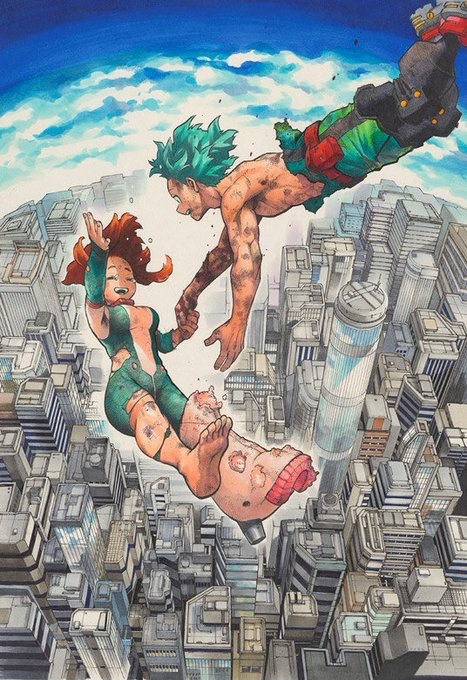
When Horikoshi said to pay attention to Uraraka and Deku falling, I was confused. They’re obviously falling, and while there’s plenty of symbolism in the act of falling, I wasn’t convinced that it was everything that was going on here.
Horikoshi also said that this artwork took him the longest, and because of that, and the implication that this was inspired by a film, there was something tugging at my gut telling me there was more. So I sat down at 2am through a near 3 hour film, I wanted to know the context behind some of the things I saw.
I noticed some details in the work prior to watching the movie:
Uraraka is crying while smiling
Deku isn’t crying, which is a huge deal
They’re severely wounded and yet seem content
The world around them is completely intact
They both have floating quirks, and aren’t using them. They’re falling on purpose.
These details just weren’t adding up to me, I couldn’t explain it. Looking at this art work makes me want to cry, and I couldn’t even tell if I wanted to cry because I was sad or happy. It felt like a moment of mourning and acceptance, not loss.
And then I watched the movie.
Oh Horikoshi, you’re terrible at being subtle. The painting is supposed to be a direct reflection from a scene in the movie:
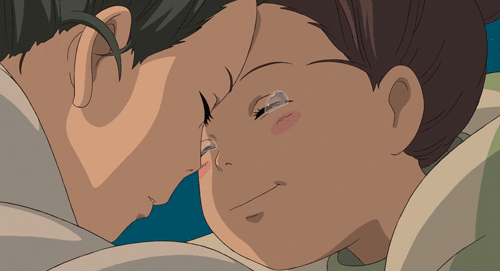
Spirited Away at its core is a movie about unconditional, endless love and generosity. Studio Ghibli films in general are an amazing way to explore the different facets of love that people are capable of.
There aren’t any immediate comparisons to make between the spirit world and the quirk society, there are completely different takeaways from these two settings. The same is applicable to the relationship between Kohaku/Chihiro and Izuchako.
Izuchako is a story about the most tragic form of unrequited love. A love that is difficult to exist not because it can’t be felt between them but because of the burden Izuku carries, and the promise Ochako made to herself.
On the flip side, Chihiro feels that she has always loved Kohaku, even before they met in the spirit world. Kohaku has also always loved her, because despite forgetting his own name, he never forgot Chihiro’a even after years had passed.
As individuals, the characters couldn’t be more different. Kohaku is a powerful lost spirit in search of learning the ways of Yubaba. Izuku was born powerless in a world full of superpowers. Kohaku appears to be cold and arrogant to those around him while caring on the inside. Izuku wears his heart on his sleeve, and openly cares about everyone he meets.
Chihiro is a young girl who was given everything she needed by her parents. Ochako grew up in poverty and picked up habits to ease the monetary burden on her parents.
So while their relationship and characters seem to be vastly different from each other, it certainly means:
There was something about the falling scene that compelled Horikoshi to draw Izuchako.
So what is the significance of this scene?
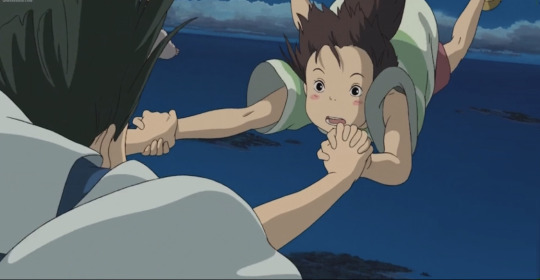
There are certainly many ways to symbolize the act of falling, but what was the context here?
Chihiro revealing Kohaku’s real name to him causes his dragon scales to scatter like petals, and they begin to fall from the sky together. Kohaku reaches out to her in his now human form and grasps her hands, and they share the story of how they met.
The falling here symbolizes freedom and celebration. Kohaku is perfectly capable of flying, but he takes a moment of complete joy, complete freedom, and shares that moment with Chihiro. They are not afraid of the world beneath them, Chihiro trusts Kohaku with her entire being, and Kohaku would never let Chihiro go. There was no reason to be afraid of falling.
The freedom here is that now Kohaku knows his real name, he’s gotten the power of his life back, and he can be freed from the spirit world. More than anything it solidifies that he and Chihiro will meet again someday.
And then, Chihiro says this:
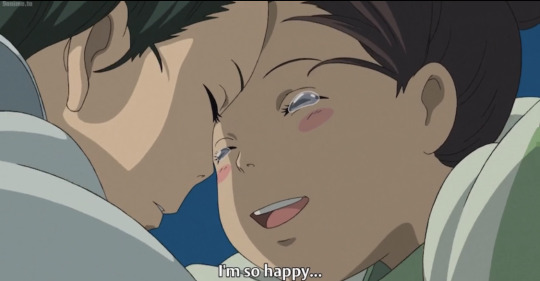
I personally don’t believe that Chihiro was letting go of Haku in this moment. This was the consolidation of their love for each other. Chihiro always wanted to be reunited with her parents and go back to the human world. This was the moment they realized they’d be able to see each other again.
Later, when Kohaku promises they’d meet again and he tells her to walk away from the spirit world and not look back once, she listened. Her only chance to see him again was to turn back and look before she left, and while she almost did for a second, she forced herself not to. She trusted they would meet again, and left the spirit world without looking back.
The details I noticed before watching the movie clicked in my head.
In the Izuchako painting, the world around them is completely intact because it’s meant to be. It means the world is at peace in this moment. Or that it didn’t matter what was going on, but considering how much care was out into depicting such a perfectly untouched world makes me think it was meant to be seen as peaceful, especially how he painted the sky.
They are falling despite having the capability of flight because that moment belongs to them, and them only.
Their wounds are the physical manifestations of the scars they bear from their journey to become heroes.
And they’re content because:
It feels like Izuku is saying “It’s okay, I’m here.”
And Uraraka is saying. “I’m so happy you are.”
In any case, this is just my interpretation of it. There are HUNDREDS of them all bearing equal weight: this could mean Uraraka letting go of her feelings just as much as it could mean them falling in love. There are people saying Chihiro was letting go of Kohaku because she was going to return to the human world, which is also possible. All of them, they’re all beautiful theories but this is the one I stick to because it feels right in my heart.
As for the reason I felt mourning, it was just my own bkdk heart breaking.
#jmeta#mha#my hero academia#ochako uraraka#midoriya izuku#izuchako#izuchaco#izuocha#deku#boku no hero academia#bnha
165 notes
·
View notes
Text
Sharon Carter: A Study in Selfishness
The Falcon and the Winter Soldier spotlighted some hard truths. Beyond its real-world parallels, it’s changed our perspective on the MCU. And on the heels of the finale, we can’t help but reflect on how we got here.
It feels like ages ago that an alien invaded Earth believing it was his right to do so. This madman imposed his will upon a whole planet. He wielded god-like power over an entire species. He took the lives of countless people, leaving the rest to pick up the pieces of their shattered lives.
In doing so, he became one of the most beloved characters in the MCU.
So why is it that many of the people who adore a monster are now so disappointed with Sharon Carter?
Easy. Loki is a man.
Angels and Demons
Relax, everybody. This is not an anti-Loki treatise. I’m writing this post with a Loki poster behind my chair, a Loki mug on my desk, and a Loki t-shirt on my back.
To be fair, it helps that the God of Mischief is played by one of the most charming, attractive men in Hollywood. But Emily VanCamp is no slouch. She’s a beautiful, talented actor who elevates any project. So why are people upset that she’s the Power Broker?
Women aren’t supposed to veer from familial or cultural expectations.
Women aren’t supposed to put themselves first.
Women aren’t supposed to seize power in a man’s world.
The events of Civil War alone had a tremendous impact on the characters we love. Sam and Bucky’s respective ordeals changed them forever, and The Blip forced them to adapt even further. So many people are praising their growth in the TFATWS finale, and we’re among them. But it’s frustrating to then see comments like these:
“Omg wtf is wrong with Sharon? That is NOT who she is!”
“Since when is Sharon evil? That ain’t her.”
“Sharon is totally a Skrull. The Sharon we know would never turn her back on everything she stands for.”
Guess what, folks? Just like Sam and Bucky, the Sharon we once knew no longer exists. She, too, changed and grew - right out of the box that the patriarchy built for her. And people don’t know how to handle it.

Double Standards
Misogyny is so deeply woven into the fabric of our society that a lot of people, women included, often don’t see it. But it’s in almost every facet of daily life, leaching into our brains like a toxin. And TFATWS called Marvel out on it by illustrating a simple fact:
Men and women who behave in the same way are treated very differently.
A man who tramples others for a promotion is ambitious. A woman is a conniving bitch.
A man who sleeps around is held up as a ladies’ man. A woman is looked down upon as a whore.
A man who logs extra time at the office is a good provider. A woman is neglecting her family.
Despite centuries of fighting for our right to exist, women are still brainwashed to be and be seen as lesser than men. We’re expected to conform to roles meant to keep us subservient. We’re told that caring for others is more important than caring for ourselves.
Sharon Carter received the same cultural programming. And it’s likely that she felt familial pressure (either explicit or implicit) to follow in Aunt Peggy’s footsteps, whether she wanted to or not.
And follow she did.
Sharon joined S.H.I.E.L.D. She fought armed HYDRA agents. Then she sacrificed her life, her career, and her freedom for the greater good. And what did she get for it?
The same thing women always get when they put everyone else’s best interests ahead of their own.
She got fucked.
A Matter of Perspective
Let’s pretend the TFATWS finale had gone differently. The Power Broker is a previously unseen bad guy, a Wilson Fisk type. After the U.S. government branded her as a fugitive and the Avengers forgot her, Sharon has just been trying to survive in Madripoor.
Nonetheless, she helps Sam and Bucky neutralize Karli. Sam secures Sharon’s pardon and she reclaims her former post as a dutiful C.I.A. agent.
Talk about disappointing; that would be like watching a woman return to a man who beats her.
In reality, Sharon is revealed as the Power Broker. After the people for whom she gave everything betrayed her, she built a lucrative business from scratch using a canny brain and the skills S.H.I.E.L.D. taught her.
Now for those who are incensed by Sharon’s turn because she’s selling weapons, please see Exhibit A:
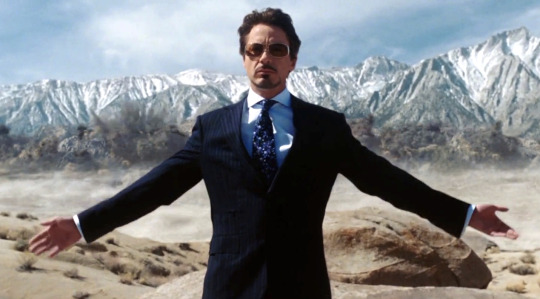
Even after Tony Stark stopped manufacturing weapons for the U.S. government, he continued making them for S.H.I.E.L.D. If memory serves, he also created a sentient murder-bot that leveled a city before nearly annihilating mankind.
Tony’s intentions were noble, but that didn’t make him any less responsible for a humanitarian disaster. The Sokovians would have been well within their rights to demand Tony’s arrest and incarceration.
But we love Tony, so we don’t like to go there.
And speaking of the U.S. government, let’s be real. American politicians wouldn’t condemn Sharon for illegally selling weapons to dangerous groups. They’d condemn her for cutting into their own profits.
If there’s one thing the U.S. government excels at, it’s creating and arming terrorists. Sharon’s just running their playbook.
Redefining Selfishness
In all fairness, some people’s disappointment over Sharon’s arc has nothing to do with sex and everything to do with heroism. For this discussion, see Exhibit B:

Ever since Steve Rogers got his happy ending with Peggy Carter in Endgame, the Marvel fandom has been divided into two camps.
Camp 1: Steve is a selfish bastard who abandoned his family, his country, and the world when they all needed him the most.
Camp 2: Steve did more than enough for his family, his country, and the world when they all needed him most and deserved his happiness.
I will always be a card-carrying member of Camp 2, which is one reason I exited my Endgame theater as a human ball of snot.
Steve Rogers gave enough for his country even before he was defrosted. He liberated a POW camp behind enemy lines. He defeated Red Skull. He saved countless lives by crashing the HYDRA bomber into the arctic, sacrificing his own life in the process.
And when he was resurrected after 70 years, did he stop and smell the roses? Read a book on the beach?
No. He saved the world. Again, and again, and again.
It’s incredibly noble that a life with Peggy is all Steve wanted. Think about Michael Bay’s uber-patriotic Armageddon. Those roughnecks had quite the list of demands for saving the world, all of which seemed perfectly reasonable because, hello, they were saving the world.
So what does this have to do with Sharon Carter? Well, if you’re in Steve Rogers Camp 1, you likely see Sharon as a selfish bitch. I’ll make the same argument in her defense:
She’s given more than enough for others. She has every right to now put herself first.
We as women need to redefine selfishness. It’s been weaponized against us for far too long. We have to reframe it as a positive concept whereby we simply make our needs a priority in our own lives.
If more women embraced selfishness, we would be unstoppable.
Oh, and if you’re in Steve Rogers Camp 2 but still disappointed in Sharon Carter, you’ve got some hypocrisy on your chin. Might want to wipe that off.
A Final Note
Alice Walker, who knows a thing or two about feminism, once said, “The most common way people give up their power is by thinking they don’t have any.”
When the name “Power Broker” was first dropped on The Falcon and the Winter Soldier, it felt cheesy. But now it seems like the perfect title for a woman who not only refused to give up her power, but actively sought more.
Sharon Carter is unequivocally selfish, but that doesn’t make her evil or even wrong.
It makes her one powerful woman. And we can’t wait to see her again.

#Sharon Carter#Power Broker#Peggy Carter#Agent Carter#SHIELD#HYDRA#military industrial complex#Captain America#Captain America The First Avenger#Captain America The WinterSoldier#Captain America Civil War#Steve Rogers#Avengers Endgame#Endgame#Avengers#Battle of New York#Loki#Loki Laufeyson#God of Mischief#Tom Hiddleston#Iron Man#Tony Stark#Stark Industries#Ultron#Age of Ultron#Sokovia#feminism#womens rights#womens empowerment#female empowerment
63 notes
·
View notes
Text
Our 2020 Drama Recs
What a year 2020 has been - a time of tumultuous change, anxiety and reflection. During this time, dramas have certainly become a safe space for comfort and entertainment. Fortunately, we’ve also seen more and more quality dramas released in 2020!
As we head into 2021, here are our top 2020 dramas picks:
1. Winter Begonia 鬓边不是海棠红
recommended by Admin JY

The story of two seemingly polar opposite characters in 1930s China - a feisty traditionally-trained Beijing opera star and a wealthy Western-educated businessman in a setting where Western influence meets Chinese traditions. Yet when they finally cross paths, their parallels in fact draw them closer to each other. The main characters shine and sparkle both as independent characters with their own depth, flaws and quirks and with their ever-so-natural chemistry interacting with each other, in what could be the most healthy and balanced relationship dynamic I have ever seen between leads.
Winter Begonia presents brilliantly written three-dimensional, human yet relatable characters growing with each other through a time in history of change and uncertainty, in addition to great acting, beautiful costume design, production value and showcase of Beijing opera. If you are looking for a show with drama, history/culture, comedy, family, action (and tragedy), look no further than Winter Begonia for an entertaining yet reflective story of growth filled with all the *feels*.
2. A Murderous Affair in Horizon Tower 摩天大楼
recommended by Admin JL
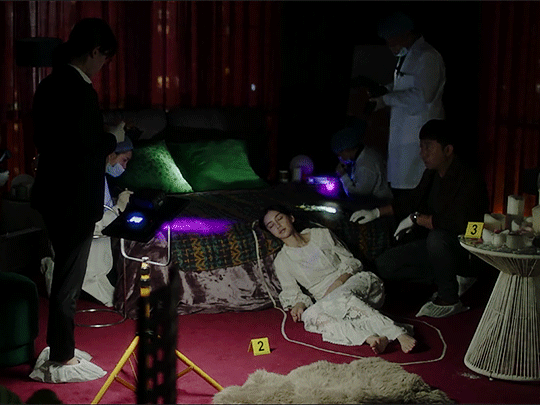
What’s your idea of a feminist drama? An ensemble of badass, confident female cast kicking ass and bonding with each other? For Horizon Tower, it is to be concealed in a mystery. Two detectives take us through the life of an attractive cafe owner after her death, retracing it through the eyes of people new to her and old ones who had known her well. They all have various things to say about her - each have a different piece of the full picture. What part of the truth do we trust? How do we, or can we judge her? While women are often expected to be the “perfect victim”, Horizon Tower says, the simple truth is, a victim is a victim, and a crime is a crime, regardless the conduct of the victim.
Horizon Tower is a sophisticated, brilliantly written and directed story. It’s fast-paced, compelling as it plays with multiple facets of the truth. There is no simple dichotomy - of black vs white, of women vs men. Instead, it fundamentally embraces the complexity of human nature - which is what makes it feminist. For me, this drama will stay in my heart as one of the most powerful and brilliant feminist stories to exist. In a time of feminist movements, it feels extra important and meaningful for China to have produced such a drama this year. Thank you for being the voice we all needed, Horizon Tower!
Watch the official episodes, subbed, on Youtube.
3. Hyena
recommended by Admin JY

Not quite simply a law drama, nor a “badass” law drama turned into a sweet romance drama - Hyena is great for its culmination of confident writing featuring strong and unique characters that break stereotypes, balanced with a refreshing focus on morally ambiguous law cases.
Just as much as the focus was placed on the well-paced and exciting stakes in the legal cases featured, the drama always gave space for the characters’ legit explosive chemistry to shine through and be developed further. While KDramas have been attempting to write “badass” female leads, Jang Geum Ja always stayed true to her anti-hero and morally grey character, with her gaudy, loud masculine style, unscrupulousness and shameless ambition to the end - a truly strong and admirable female lead who may not be fully likable. Yoon Hee Jae as the male lead also deserves praise as a more sensitive and softer portrayal of a privileged and powerful male lead, without ever overshadowing others or overstepping his boundaries.
Even as someone who struggles to watch purely-law/detective dramas, there was much to appreciate and enjoy from this drama, with its quality acting, writing and even memorable OST that can only be fully appreciated by watching.
4. The Bad Kids 隐秘的角落
recommended by Admin JL
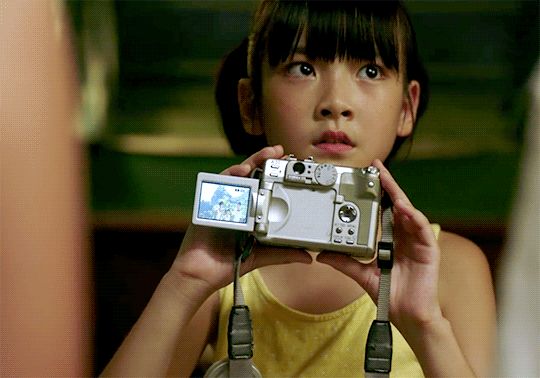
This is China’s year of high quality, sophisticated suspense dramas! Alongside Horizon Tower, The Bad Kids is certainly the one which had first carved out that status. Before it was named one of the Best International TV Series of 2020 by Variety, it had already achieved a phenomenal status in China with plenty of good fun memes and incisive meta created.
The success of The Bad Kids, in my opinion, represents creativity and the heart for storytelling triumphing over rigid, spartan censorship. It’s a testament that witty and thoughtful writing is what you need to tell a good story - and even censorship can’t get in the way of this (sometimes). It told a compelling and introspective story threading into moral fallibility while opening up questions to audience about what we perceive and know. This is a rare accomplishment when so many other recent cdrama stories are increasingly sanitised. The auteur-level of directing was vital in shaping the experience as well, down to the quirky selection of music.
So, do you believe in fairytales or reality? :)
5. Brutally Young 十八年後的終極告白
recommended by Admin JY

How far would you go to hide the secrets from your past to protect your present? - that was the simple but solid foundation that this HK Drama delivered.
A group of high school friends are forced to reunite after 18 years to unravel the mystery of a recently discovered corpse, related to their shared pasts. Through this premise, mystery and suspense unfolds as the characters’ complex motivations and hidden pasts are revealed.
Despite the wide ranging cast, many characters are given good depth and personal arcs for development, and even decent romance feels. The pace of the story is also kept tight and remains consistent and realistic throughout. Definitely an unexpected dark horse from TVB’s 2020 lineup, worth checking out!
6. Candle in the Tomb: The Lost Caverns 鬼吹灯之龙岭迷窟
recommended by Admin JL

Okay, after two heavy suspense dramas from me, is there anything more lighthearted to watch? I’m usually not an action/adventure fan, but I’ve been a fan of the remakes of Candle in the Tomb directed by Fei Zhenxiang along with his team, following after the prequel adaptation last year, The Wrath of Time.
This time, we have Pan Yueming as Hu Bayi, forming the Iron Triangle with Pangzi and Shirley, embarking on a tomb-raiding treasure-hunting adventure. Director Fei makes action digestible and fun to watch, on top of the witty script, great character-writing and performance - true to canon (as far as possible). As far as old fans of the franchise and new ones of the drama know, this is the best remake so far. I’m looking forward to the next instalment, The Worm Valley, likely out early 2021!
Watch the official episodes, subbed, on Youtube.
-
Let us know what your picks for 2020 are!
Written and gifs by Admin JY and Admin JL, unless stated otherwise.
#cdrama#cdramanet#kdrama#winter begonia#a murderous affair in horizon tower#the bad kids#hyena#candle in the tomb the lost caverns#brutally young#hkdrama#drama#鬓边不是海棠红#摩天大楼#隐秘的角落#十八年後的終極告白#鬼吹灯之龙岭迷窟#shoujoinvestigation#sji: recs#sji: year in review#admin: jy#admin: jl#year: 2020
140 notes
·
View notes
Text
I know that Rook’s birthday has passed, but I saw a post today asking why Rook speaks French and I did look into this in an Rook Analaysis essay that I wrote for his birthday but didn’t post it here. So that post kinda made me want to post it to explain or hopefully look more into his character.
Rook Hunt is a mysterious and attractive character. Despite his unusual habits, he’s a true gentleman but is often seen as having strange characteristics. Here I will attempt to look into Rook’s character design to celebrate his birthday!!
Rook so far in the game is the only character we see speaking a language from our world, French. Some have found this confusing or unnecessary but actually, Rook speaking French makes perfect sense. Rook comes from Afterglow Savannah, a land based on the movie, the Lion King just like it’s NRC dorm counterpart. The Lion King is said to take place in Africa, specifically Kenya. Inspiration on the landscapes in the movie was from the animators visiting Kenya (Bake, 2019). French is the official language of 11 countries in Africa and the secondary language in 10, making it the 5th most spoken language in the world (Chutel, 2018). Kenya is one of the countries with french as its main language. Since rook comes from Afterglow Savannah, it’s natural that he would have qualities matching the area just like Ruggie and Leona who also come from the same place. But unlike them, Rook resides in the Pomefiore dorm, therefore he holds qualities for both of these. Therefore, Rook does not come from France or represent France, he is based on Africa and most likely comes from the twst version of it which would be Afterglow Savannah.
Although Rook is not French, many white Africans in Africa, especially South Africa originated from France, Germany and the Netherlands in 1652 (jyu.fi). It's common for some twst characters to be a mix of cultures and themes. Rook is one example of this, he’s a blend of Afterglow Savannah and Pomefiore as he comes from Afterglow and is based on the hunter from Snow White. Snow White is said to be based in Germany, specifically Germany during the Holy Roman Empire (esri). Germany is one of the three main countries previously mentioned, that majority of white Africans came from, which suits Rook’s appearance. Rook’s hats also resemble fashion from this time as well as matching his Snow White counterpart. As seen below:
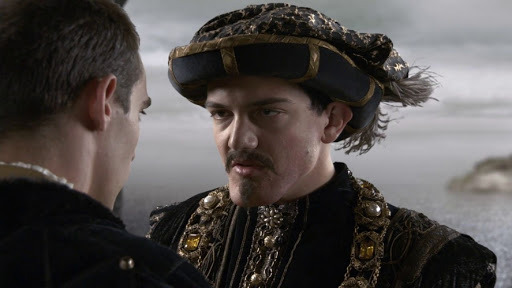

Rook’s hair also appeals to both the hunter from Snow White and the matching time period. These hat styles were worn by those of higher class and by Rook wearing it, reflecting his position as deputy dorm leader of Pomefiore.
The 14th century was a time of vibrant poetry explosion fitting Rook’s personality. An example of a famous poet from this time is Dante, famously known for writing “The Divine Comedy” (Interesting Literature). He chose to write in Italian instead of Latin which was common during these times. French and Italian are both known as “romance” languages that both derived from Latin, which was the language of the Holy Roman Empire during this time (Language TSAR). When it comes to Rook giving out nicknames, these too fit the time period as it was common for people to be named after their place or qualities which is what Rook is seen as doing. An example is Riddle who he calls “Roi de Roses” which means “King of Roses” which fits the style of names of those of the high class (Benicoeur and Gwynek, 2003).
Bows were very common and practical in armies from the 12th to 16th centuries despite barely being recorded in history (Towens, 2019). This reflects perfectly onto Rook due to how little we know about him and the little trace he leaves behind which pairs well with his stealthy personality as a hunter but also shows his side as a “soldier” or a “guard” to Vil, his beliefs of beauty and possible other things we aren’t aware about. The main role of professional archers were for defense but were also used as mercenaries during crusades. Rook fits both of these as he plays the role of Vil’s defense and the protector of beauty wanting to cherish it. He can also be seen as a double edged sword as even though he stands by Vil, many have speculated that he may at some point betray Vil or help Neige doing what he believes to be most advantageous. Archery symbolises “aligning with the target” (Girvin, 2013) which means to give support towards something. Rook is seen as taking more supportive roles throughout the game by helping other students like Epel as seen in Leona’s lab coat story, helping him make a potion for his class (Twisted Wonderland Wiki). It can also mean to become the heart of a community, be truthful, in their times of need to be the voice of their minds to help solve their problems. Rook being honest can also be reflected in his arrows as they symbolise the sharp and accurate truths they contain, this can be seen in Vil’s lab coast story as he blatantly calls Vil “fat” with the intention of helping to increase his beauty, which despite his protests, Vil is seen appreciating (Twisted Wonderland Wiki).The archer is linked with the Centaur and Sagittarius (ironically his birth sign) which represents having insight which can be linked to Rook having knowledge of other students and of other things that normal people would not. Rook is known to freely speak his mind with what we see as with intentions of helping them even if his words or actions may be seen as weird or out of place, but in the end they have the effects he was aiming for or benefit the person in some way. Also “that hearts align in embracing the perfection of that targeting” (Girvin, 2013) which is poetic in Rook being a hunter and calling himself the “Hunter of Love.” An archer remains cool and observes from afar, becoming the symbol of honour, precision and patience.
In the Spanish caves of Cova dels Cavalls, they found etched carvings of archers estimated to be from about 7000 years ago (Stanley, 2020). They were believed to be a form or hunting magic ritual to manifest good hunting, this fits well with Rook being a magic user in the game and makes him wielding a bow make sense as well as again representing his Snow White counterpart. Archery and magic connections as referenced when Rook is in battle as he summons his magic attacks with an arrow releasing maneuver, as seen below:
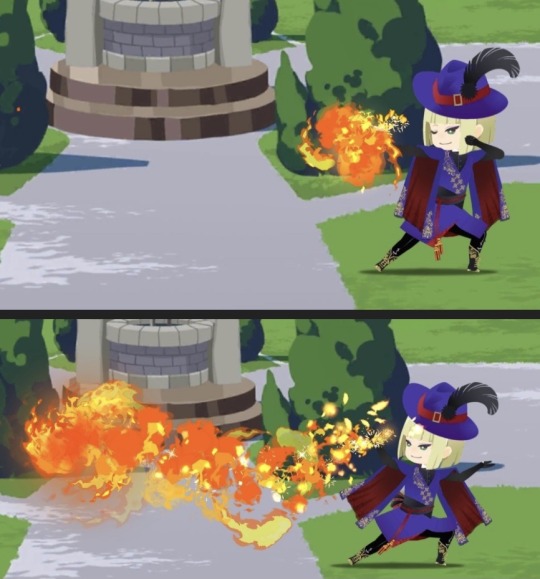
This can also reference his love for art, arrows bound in one of the first forms of art for centuries and also shows their use and endless help throughout time. A metaphorical and physical weapon just like with Rook, attacking metaphorically with his words and physically with his arrows/magic. Arrows are meant to be simple yet two dimensional (with its pointy and flat ends), Rook too is portrayed as being simple yet ironically he is also not. Two dimensional as in maybe despite all our theorising, he may just be a simple man who loves beauty yet there are still many unanswered questions about him and his past. However this can be said for other characters in the game as well, so perhaps Rook Hunt is just a simple man with weird qualities? That is still to be discovered. “The durability of the arrow metaphor, as with archery in general, looks unlikely to go anywhere soon,” (Stanley, 2020) this is a simple symbol linked with archery which can further be associated with the idea of Rook being simple and not as complicated as we believe. Rook being able to use light and dark magic can reflect this as humans are neither dark or light, they are simple beings with desires and goals that can be either good or bad. Rook too has his desires that some might perceive as odd, his goals are simple to (as seen in the wish upon the stars event) see all the beauty in the world.
In Japan, Zen archery (or Kyudo) where the goal was to “achieve a balance among mind, body, and bow, which gives rise to a unity that links the spirit to the target,” (Encyclopedia.com, 2020). Which again reflects Rook’s ability of using both types of magic, showing his inner peace and balance and ability to use both types of magic. He is a character that we don't see explode or express vivid emotions which could be linked with his hunting too. Bow and arrows have been known as symbols of good luck against evil in Japan since immemorial. We will probably see this in action during Vil’s overblot as that will be the evil to defeat in Chapter 5 alongside the other characters.
The word “rook” has multiple meanings, like crows. Many have associated this and Rook’s poem about Crowley as them being signs of a possible connection between the two. Although this theory is very interesting and I would love for a twist like this, Disney is honestly too stupid to make a story as wonderful as that, but I could be wrong (please prove me wrong Disney). On the other hand it could symbolise Rook’s knowledge of everyone and how he could be aware of some of Crowley’s secrets or the secrets/mysterious of the school. They tend to be watchful creatures with great insight, which can be said the same for Rook as he observes other students and has knowledge of things that others normally do not have. Crows are also associated with transformation and change (Clifford, 2020) which could represent Rook helping Vil and Epel, along with others to bring forth their beauty. There is also a well known nursery rhyme about crows, as seen below:
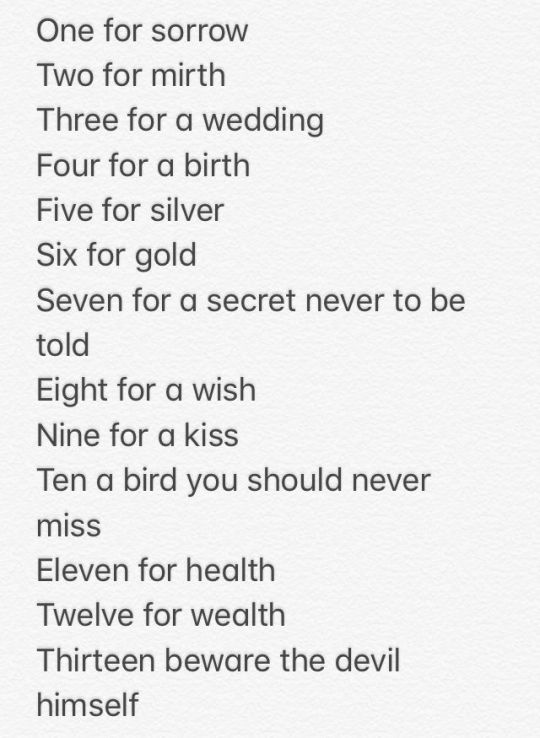
Although the history behind the rhyme is not that clear, the seventh line does hold some connection to Rook’s wide range of secrets that he knows and holds himself. Rook is also used for loud and sociable people or animals who love to talk, Rook is known for his loud and expressive persona that fits this description. Rook can also mean cheat, which could link to him sabotaging Vil to save Neige. The name is given to those with dark hair which is clearly not Rook (with his blond locks) but could refer to his hunter counterpart instead.
Rook is famous for his golden bob that is quite the debate. However bobs have a deep history. In the 20th century, bobs used to symbolise independent, progessive people encouraging a more daring personality during those times. Movies have been the main reason for the spread and back in style of the bob. Rook embodies a free personality with his odd attire in the dorm that symbolises beauty (hunting boots and hats) showing his more bold side that can also be seen by his freely open speech. Joan of Arc is the main inspiration of the bob that was brought back by Antoine, a celebrity hairdresser, which he showed in his salon in 1909 (V is for Vintage, 2012). Although she wore it for more practical meanings, she still stands for representing the people and doing what she believed in. It’s likely though that the bob was more inspired by the hunter’s hair style for Rook yet it still represents daring and progressive people which Rook is commonly known for with his views and actions.
In conclusion, Rook Hunt is an odd yet interesting character. He is neither complex or simple. We still have much to learn about him which we hopefully will in the coming chapters and his birthday event. Although his character design may seem strange, in the end they make perfect sense when looking at the connections they all have towards the game and it’s details. I hope that this managed to clear up Rook’s character and explain more about him. However, there are a few attributes that are still questionable which if Disney has any concept of storytelling, they will explain...I hope for Rook’s sake. His stalking and obsession could be linked to how he sees himself as nothing much and viewing others as better or more beautiful, in that case he’s got some emotional package. Still does not excuse his actions. These tendencies might also be them expanding on a hunter stalking and keeping track of their prey, in this case for Rook it would be people he finds interesting. In the end he’s one of the many wonderful boys we have to learn more about and love.
References:
Baker, Craig. 2019. 25 Surprising Facts about the Lion King. Mental Floss.
https://www.mentalfloss.com/article/57386/30-facts-about-lion-king
Benicoeur, Arval and Gwynek, Talan. 2003. Fourteenth Century Venetian Personal Names. S-gabriel.org.
https://www.s-gabriel.org/names/arval/venice14/
Chutel, Lynsey. 2018. French is now the fifth most spoken world language and growing—thanks to Africans. QuartzAfrica.
https://qz.com/africa/1428637/french-is-worlds-fifth-spoken-language-thanks-to-africans/#:~:text=French%20remains%20the%20sole%20official,second%20official%20language%20in%2010.
Clifford, C Garth. 2020. Crow Symbolism & Meaning (+Totem, Spirit & Omens). World Birds.
https://www.worldbirds.org/crow-symbolism/
Encyclopedia.com. 2020. Sport and Religion. Encyclopedia.com.
https://www.encyclopedia.com/environment/encyclopedias-almanacs-transcripts-and-maps/sports-and-religion#:~:text=Throughout%20human%20history%2C%20sports%20and,their%20primary%20means%20of%20communication.
Girvin, Tim. 2013. The Symbolism Of Archery. Girvin.
https://www.girvin.com/the-symbolism-of-archery/
Interesting Literature. The Best Fourteenth-Century Poems Everyone Should Read. Interesting Literature.
https://interestingliterature.com/2019/11/the-best-fourteenth-century-poems-everyone-should-read/#:~:text=The%20fourteenth%20century%20was%2C%20in,vibrant%20language%20for%20vernacular%20poetry.
Jyu.fi. Ethinic Groups. Jyu.fi.
https://www.jyu.fi/viesti/verkkotuotanto/kp/sa/peop_ethnicgrps.shtml
Stanley, John. 2020. Archery HIstory: Arrows of the Imagination, Art and Culture Symbolism. World Archery.
https://worldarchery.org/news/178453/archery-history-arrows-imagination-art-and-cultural-symbolism
Twisted Wonderland Wiki. Leona Kingscholar/Personal Story/SR Lab Coat. Twisted Wonderland Fandom.
https://twisted-wonderland.fandom.com/wiki/Leona_Kingscholar/Personal_Story/SR_Lab_Coat
Twisted Wonderland Wiki. Vil Schoenheit/Personal Story/SR Lab Coat. Twisted Wonderland Fandom.
https://twisted-wonderland.fandom.com/wiki/Vil_Schoenheit/Personal_Story/SR_Lab_Coat
Towens. 2019. Arrows in the Middle Ages. Bow International.
https://www.bow-international.com/features/arrows-in-the-middle-ages/
V is for Vintage. 2012. The Bob: History of a Hairstyle. V is for Vintage.
https://visforvintage.net/2012/04/03/history-of-bob-hairstyle/
#I'm sorry this is soo long#it's 6 pages omg#I included references to the sites I mentioned#sorry if I made any mistakes#this was based on what I found on google so blame google#anyway Rook's deserves to have a week long birthday so it's a pass lol#rook hunt#I actually wonder if there is more i could mention next time muhahahahah#twst rook#I love u roookkkk#twst#twisted wonderland
213 notes
·
View notes
Note
Hi JWB, analysis anon here. OMG, every time ai visit your blog, I have so much to savour and enjoy! Really in awe and wonder of the quality of your work and creativity! Well, I was pondering over the role of religion in the IPK universe—- while they did show divine miracles in Khushi’s case, Anjali being the most overtly religious one is shown to be the worst sufferer! Quite an exception in the ITV world, don’t you think?
Hello Dearest Analysis Anon!
Aaaaahhhh what's with all the love today? I'll melt into a puddle!!!!!!!!!!!
Thank you - bohot bohot - for all the love.
The role of religion in the IPK universe
I think IPK was very pragmatic and honest in its way of dealing with religion - which is fantastic and very progressive. I've rarely seen shows post IPKKND have such a healthy relationship with religion tbh. Through subtle, smart ways the show showed some very important themes:
- People can chose to be an atheist or a devotee, what matters is each respects the other's choice. Arnav, although initially judged by Khushi for not believing in God, is never shown to 'transform' and believe in God. Rather Arnav learns to be kinder to those who do believe in God and Khushi realizes that religion alone is no measure of one's character and morality considering Shyam and Dadi are fairly religious.
- God helps those who help themselves. While the show beautifully left Arnav alone with his atheism, it is interesting to see how the characters who believed were treated. Buaji, Khushi and Payal keep getting assistance/good luck not just because they pray regularly, but for working their butts off to get things done. Khushi is constantly working hard to keep things afloat. Payal does everything to support her sister and keep the harmonious balance in the family.
- No devotion can help if one is blind. Anjali's blind faith is a warning on what can happen if we choose to not see things. Yes she's devoted and religion plays a massive role in her life but no God can help you if you choose to not see things for what they are.
- No one is punished for being an atheist. A lot of shows tend to show that if a person did not believe in God, then by events and pain the person will be forced to accept God exists - something that Khushi challenged Arnav with. What's beautiful about this is that IPK, in a way, gets religion right. God, irrespective of religion, does not have ego. This is a very human trait to force people to bow to our beliefs. So in a way I'm glad that Arnav never had a reflection of 'oh God does exist'. His pain and suffering (later in life) is due to external factors and his own deeds - not because of 'God is teaching him a lesson'. No 'God' does that, humans do though. Also Arnav is not ‘punished’ for trying to be ‘God’, he gets all the yelling for breaking another person’s privacy and trying to control another person’s life because that person rattled his ego.
- Religious or not, you have to face the consequences of your actions. God does not 'fix' everything. Khushi suffers for keeping Shyam's truth away from Anjali - a truth that could've saved Anjali a lot of pain. And look at karma, Khushi's misplaced actions endanger Anjali's life so it leads to Payal's marriage being threatened. Anjali suffers for believing in Shyam despite her own flesh and blood telling her the truth of his evil ways. She goes against her good judgement to include Shyam in her life and that costed her her child. Arnav continuously suffered multiple heartbreaks and his own relationship was always at the brink of breaking given how he often disrespected and hurt Khushi and their relationship.
- If you believe in God, you'll find a way through your faith. If you're an atheist, you'll find a way through logic. Most importantly, you'll find a way if you're smart *lol* this is especially evident during the kidnapping track. Both Arnav & Khushi finds means to get through the trouble with the help of things they believe in. Khushi's faith in Devi Maiyya leads to the chunri falling on Shyam's shoes which she follows through her instinct and intelligence. Arnav's presence of mind and quick thinking helps him give a vital clue to Khushi - which was the restaurant with Laad Governor written on it.
- And true, Anjali suffered the most despite being the most religious - but she also had miraculous saves from accidents that would've literally killed anyone else. She keeps on cheating death - electric shock, scorpion, doused in ether, car accident and a dangerous miscarriage.
So yes, I love the way IPK dealt with religion (largely) because I see religion in the same way as well. I love my faith but I don't see the logic of doing something stupid and thinking 'God will fix everything'.
Well this did become very lengthy - thanks for the interesting ask!
Much love,
- JWB
#ask#analysis anon#ipkknd#iss pyaar ko kya naam doon#religion#analysis#ipkknd analysis#queue farak padta hai
32 notes
·
View notes
Text
atop the wall, wisdom cries out [One Piece, Robin] -- oneshot
Robin-centric character study || 1052 words
She has the split-second to wonder if all great turning points in history are like this—destiny at the mercy of a momentous decision—
(Written for the OP Tarot Project High Priestess and Eight of Wands cards.)
High Priestess
Upright: Intuition, insight, sacred knowledge, things yet to be revealed, reflection.
Reversed: Secrets, information withheld, disharmony.
Eight of Wands
Upright: Movement, action, alignment, abrupt changes, quick decisions.
Reversed: Delays, frustration, resisting change, internal alignment.
Explanations of references in the end notes.
Warnings: canon-typical violence
(On Ao3)
===/\===
.
(1) Lesson: A cup of water is not yours until you drink it. Likewise, knowledge.
All scholars of Ohara memorise via the method of loci, and Nico Robin, at eight years old, is no exception. Her favourite is a temple hewn from stone, a wise king's magna opus as reconstructed from academic blueprints. There, she stores the lessons she learns: a kind elderly lady still calls for the marines in the night after she's fed you; a knife in the hands of a frightened child can still slit a soldier's throat; a powerful man is still not quite immune to the intrigue of a beautiful woman.
She drinks deeply from the cup of knowledge and suffering, and two pillars form in the forefront of the temple. The first is who she has always been—the pursuit of good things, knowledge for knowledge's sake, building up, preserving, and leaving a legacy for all humanity. The other is who she discovered she was when the world government placed a bounty on her head—an immovable strength, manifesting in guile, bloodshed, and conquest.
Her surprise is only at how readily she accepts these as her foundation—the twin load-bearing columns of the woman she now is.
.
===/\===
.
(2) Aphorism: Scientia potestas est. (Translation: Knowledge is power.)
"Read it," demands Crocodile. Then he raises a hand to call her to pause and adds, almost smugly, "Out loud."
He thinks he's clever. Robin smiles. He's not stupid, but Robin is really, really clever.
She hadn't intended deception when she'd first sought out the most comprehensive history of Alabasta. (Three archaic hand-scribed manuscripts and a yellowed but hardly-used guide. It was technically restricted access, though that hardly mattered in the face of Robin's devil fruit.) She had merely wanted to know—the first pillar of Nico Robin.
She recites this knowledge from memory, trailing her fingers along the runes of the poneglyph before her, retrieving the words verbatim as she walks through the temple rooms in her mind. She fully expects Crocodile to interrupt her, to point to one word or the other and demand its meaning. She already has the textbook explanation on why translation is an imperfect art on the tip of her tongue. She doesn't get that far.
He's never been a patient man, especially when it comes to failure.
.
(3) Quote: Death never takes a wise man by surprise; he is always ready to go.
He deals her a mortal wound and leaves her to bleed out in the collapsing tomb of this country's kings. The age-old stone crumbles and groans, weary and slow to return to dust. She closes her eyes and waits.
It's surprisingly peaceful.
.
.
(4) Comment: As implied ibid, "life is full of surprises".
(5) Fallacy: Appeal to pity.
Straw Hat Luffy saves her and she demands 'why' but receives no answer. As she dusts herself off, she decides a fitting consequence for his unwelcome charity. She invites herself to his crew.
A strange group—they actually accept her, welcome her into their lives and their home despite being enemies three days before.
Over time, she learns that if she drops into a light doze below deck beside Nami, the next morning will come with warmth, the smell of breakfast wafting in from the adjoining kitchen, and that strange, unconditional acceptance.
.
(6) Study: Repeated exposure to similar situations without negative stimuli result in dissociation of situation and stimuli.
.
. . . and she is . . . happy?
.
(7) Supra (4).
.
===/\===
.
(8) Truism: Nothing lasts forever.
(9) Quote: Only a fool can be happy.
The government finds her, as they have many times before. This time, however, she can't bring herself to offer these people as sacrifice in her place. She tries desperately to think of an alternative to the offer laid before.
She becomes the illusion of stillness, there is no stillness in her. Her mind is structure and movement all at once—the earth in revolution beneath the temple's foundation stone. Her mind moves as the celestial bodies, a million miles a minute, yet imperceptible. She is perfectly grounded as the centrifugal force tears her apart.
A lifetime ago, she was taught to smile when she wants to cry, so she smiles now. A mind built by the wisest men in history and it yields no solutions, so what use is it? What use is she? She's only good for secrets, sabotage, and smiles like sweet poison.
Even the greatest temple cannot stand forever.
.
(10) Quote: The only way to have a friend is to be one. Nb. This implies friends are worth having. Comment: The author agrees.
(11) Quote: There is nothing worth living for, unless it is worth dying for.
(12) (Non-)issue: Hobson's choice.
(13) Principle: Occam's razor.
.
She takes the offer.
.
===/\===
.
(14) Policy: No man left behind.
The friends she tried to save came for her. They stand in proud defiance of the authorities that have wronged her all her life, figures of would-be legend backlit by the sun, their shadows stark and black, bridging the deep chasm she stands on the other side of, alone.
It borders on the absurd. They shouldn't have, it makes no logical sense. And yet, there they stand.
.
(15) Quote: When we are no longer able to change a situation, we are challenged to change ourselves.
She fails to understand and finds that for once, she does not need to know. Equally illogical hope wells up in her. (The temple is shored up, its glory to be restored. Not yet, but in the future promised.)
"Say you wanna live," shouts Luffy, and he waits for her answer, as if he has all the time in the world. As if time itself will yield to his force of will.
It almost does. The mad rush of adrenaline blocks all noise except the rush of blood in her veins, her captain's voice ringing in her ears. She has the split-second to wonder if all great turning points in history are like this, destiny at the mercy of a momentous decision, all the world in bated breath.
She doesn't stop to wonder if she dares. The second pillar of her identity commands her to be bold.
.
(16) Proverb: Fortune favours the bold.
"I want to live," she cries across the divide—
.
—and—
.
(17) Supra (4).
.
.
—she is saved.
.
.
.
===/ENDNOTES\===
At the risk of these notes being longer than the actual fic (I got too hyped by the thought of pseudo-academic formatting and used way too many probably-obscure references), here's helpful notes so you don't have to ask google:
the method of loci— (loci being Latin for "places")— is a strategy of memory enhancement which uses visualisations of familiar spatial environments in order to enhance the recall of information. The method of loci is also known as the memory journey, memory palace, or mind palace technique.
magna opus— Latin for "great work", especially the greatest achievement of an artist or writer.
aphorism— an observation which contains a general truth/ a concise statement of a scientific principle, typically by a classical author.
ibid— a citation signal to refer to a single work cited in the note immediately preceding. The abbreviation of ibidem, being Latin for "in the same place".
supra— a citation signal used to refer to an earlier-cited authority. Supra is Latin for "above".
truism— a statement that is obviously true and says nothing new or interesting.
nb— a citation signal to draw the reader's attention to a certain aspect or detail of the subject being discussed. The abbreviation of nota bene, which is Latin for "note well".
Hobson's choice— A forced or false choice. It is believed that the phrase derives from Thomas Hobson (1545–1631) who ran a horse rental business in England. He rented out horses but insisted that customers took the horse nearest the stable door. The choice his customers were given was "this or none"; making it effectively Hobson's choice of horse. — (source)
Occam's razor— Occam's razor (or Ockham's razor) is a principle from philosophy that the simplest solution is usually the best one.
===/END\===
(On Ao3) ( patreon ) ( kofi ) ( paypal )
#nico robin#monkey d luffy#sir crocodile#alabasta#ohara#one piece#one piece fanfiction#one piece fanfic#opfanfic#op fanfiction#op fanfic#op#my writing#mine#tarot
47 notes
·
View notes
Text
Frankenstein and the Monster

So there is loads of speculation on a connection between Dabi and Frankenstein’s monster. There are several people who have already commented on it, here, here, and even here. (These are all the ones I could dig up recently). Frankenstein is a novel that can be read in many ways, but I believe the themes of the novel parallels and helps illustrate the relationship between Ujiko, Endeavor and Dabi.
1. Endeavor and Victor Frankenstein
To very briefly touch upon the novel for those who haven’t read it, there are several differences between Boris Karloff’s movie depiction and the original novel. In the novel the creature is intelligent, well spoken, and a reflection of the Doctor Frankenstein himself. To summarize quickly, Frankenstein a very dramatic undergrad student discovers the secret to reviving the dead, uses that to create a monster, then upon seeing how ugly it is flees. The monster grows up in isolation, is spurned by every human he comes across, and then returns to his master and says he will kill everyone the Doctor Loves unless he creates him a mate. Frankenstein destroys the mate, and then the monster destroys his wife to be on the night of their wedding then they chase each other around in the arctic until both of them die. If that wasn’t a sufficient enough summary, this crash course video is a good writeup of the book and it’s themes.
Frankenstein has a lot to say about science and treading in god’s domain, but it’s also written by a woman who was a teenager at the time (Mary Shelley) who existed in a soical circle of adult men who were much older than her. Just as much as it’s a novel about mad science gone wrong, there are strong themes of feminism, parenthood, and abuse intertwined in the novel.
Another popular reading is to interpret “Frankenstein” autobigraophically, a reading that was encouraged via 1970s feminist criticism of the novel. Earlier readings along those lines centered Frankenstein as a tale of monstrous birth and look to Mary Shelley’s own experiences with birth, which were pretty terrible.
Mary Shelley’s mother died when giving birth to her, and Mary and Shelley’s own first child, a daughter, died when she was just a few weeks old. And in her journal Mary recounted an incredibly sad dream about this daughter. “Dream that my little baby came to life again; that it had only been cold and that we rubbed it before the fire and lived.” [Crash Course: Frankenstein]
This is just some background information to add context to your reading. Percey Shelley first met Mary when she was 14, and eloped with her when she was 16 and already pregnant with his child (he was around 24 at the time). Not only that but Percey was married at the time when he eloped with Mary, and his wirst wife did not take it well.
Harriet (Westbrook) Shelley was Percy Shelley's first wife. While he was still married to her, he ran off with Mary Shelley, leaving Harriet pregnant and alone with their first child. She committed suicide on November 9, 1816 by drowning herself in Serpentine. [x]
As I said these details are all to add context to Mary Shelley’s life while she was writing Frankenstein. A book in which most of the female characters are severely mistreated and harmed.
There are some pretty feminist critiques to Frankenstein. For instance, the novel clearly shows what harm comes to women (and family and relationships) when men pursue single-minded goals. In fact thanks to Victor’s lack of work life balance pretty much all of the women in this novel die. Victor’s creation of the monster leads to the hanging of the servant Justine the murder of Victor’s bride Elizabeth on their wedding night. [Crash Course: Frankenstein]
To put it as frankly as possible (Haha, get it because frankenstein) there are several points in the novel in which both Victor and Frankenstein act like fuckboys.
You could easily read the story as one of male entitlement. Victor in the first place, deliberately refers to his bride to be Elizabeth as a possession and says it as a term of affection.
And when, on the morrow, she presented Elizabeth to me as her promised gift, I, with childish seriousness, interpreted her words literally and looked upon Elizabeth as mine—mine to protect, love, and cherish. All praises bestowed on her I received as made to a possession of my own. We called each other familiarly by the name of cousin. No word, no expression could body forth the kind of relation in which she stood to me—my more than sister, since till death she was to be mine only.
His actions towards Elizabeth in the novel are also, extremely neglectful. Elizabeth spends the novel passively waiting for him to return and marry her, but Victor has a habit of disappearing from her life for long periods at a time with no contact at all in pursuit of his endeavors. (Get it because I’m comparing Victor to Endeavor).
Elizabeth is someone he feels entitled to own, and entitled to her love (he literally thinks his parents gave him to her) and yet Victor never takes responsibility for Elizabeth and her feelings too wrapped up in his own. When Elizabeth is grieving for the losses of her family, Victor has a tendency to leave her alone to go off to sulk on his own. Elizabeth even pleads multiple times for Victor to come home, to offer some support for the rest of the family with his mere presence and Victor delays these returns home as long as possible.
“Get well—and return to us. You will find a happy, cheerful home and friends who love you dearly. Your father’s health is vigorous, and he asks but to see you, but to be assured that you are well; and not a care will ever cloud his benevolent countenance.
This treatment also extends to the rest of Victor’s family, who are people he seriously neglects throughout the novel, and also people who are the direct sufferers of the consequences of his actions. His youngest brother is killed, the maid is framed for the murder, Elizabeth dies on the wedding night, Clerval his closest friend is killed, and his father dies soon afterwards of old age / implied grief.
The monster who Victor creates is also a reflection of him. After knowing the suffering it is to be created as a creature with no family, and no place of belonging he then instructs Victor to make him a woman. A woman that will have no choice but to love him because they will be the only two alone in the world. The monster, also feels entitled to feminine love because he is lonely, with no thought to whether or not the second monster might have feelings, opinions or her own, or might not even like him.
“You must create a female for me, with whom I can live in the interchange of those sympathies necessary for my being. This you alone can do; and I demand it of you as a right which you must not refuse.”
The recurring theme is this: a sense of male entitlement, without a sense of responsibility. What do I mean by Male Entitlement?
Male entitlement is a product of traditional societal norms. It is cultivated in men as they join a society which usually favors them over the other genders in their careers, relationships, character-standing, and more. There’s more on it here, and the role of male entitlement in abuse.
Male entitlement is an attitude where men believe they are entitled to power over others, and/ or ownership of the women and children in their lives. Victor calls Elizabeth a possession given to him, and neglects her throughout most of the book. The monster believes he deserves to have a woman to love him. It’s not masculinity. Masculinity is just masculinity. It’s the belief that they are entitled to power or ownership over others simply because they are men born in a society that favors men. Male entitlement can show up in say, a father who believes he is entitled to the love of his children despite never doing any of the actual work of childrearing and pushing it all on the mother. Believing they deserved to be loved simply for being a father, while being absolutely absent for their lives. GUESS WHAT HAPPENS IN FRANKENSTEIN.
So, a lot of people interpret Frankenstein as a story of ambition gone wrong, but that interpretation feels like it’s missing something if you don’t include the feminist angle. Frankenstein when doing his mad scientist undergrad bit speculates how he would be a father of a new species. It is specifically, fatherhood accomplished without a mother. That this new species would owe him love.
A new species would bless me as its creator and source; many happy and excellent natures would owe their being to me.
An undeniable part of Victor’s motivation is that as the sole creator the child would owe him all of their love. I mean to once again connect this to abuse narratives how many real life parents believe their children have to love them no matter how poorly they treat them?
No father could claim the gratitude of his child so completely as I should deserve theirs.
Victor in the novel wants not only fatherhood, but also motherhood. He wants to create life which in victorian society at the time is the role of the woman. And yet at the same time, he doesn’t want to do any of the actual work of motherhood and the roles typically described to women.
We can read the novel as an exploration of what happens when men fear, distrust, or devalue women so much that they attempt to reeproduce without them. In some ways Victor is trying to bypass the feminine altogether. He’s creating life without recourse to egg or womb. [Crash Course: Frankenstein]
Victor creates, and then proceeds to take no responsibility for his creation. He abandons the child for the most shallow of reasons (because it was ugly and looked scary), then leaves a sentient, thinking creature with no idea who it was, or why it was alive in the middle of the mountains hoping it starves to death on his own so he doesn’t have to deal with it.
but now that I had finished, the beauty of the dream vanished, and breathless horror and disgust filled my heart. Unable to endure the aspect of the being I had created, I rushed out of the room and continued a long time traversing my bed-chamber.
Victor is the creatures parent, but takes no responsibility as a parent for raising the creature. In fact the child is punished when they are still an innocent, just for not turning out the way their creator intended.
Frankenstein is a novel which portrays consistently men who aspire to greatness as described in their society (scientific invention, and in the framing device arctic exploration) but who consistently fail everyone in their lives at the most basic levels. In other words as Lizzo said, “Why men great, till they gotta be great.”
This is where the fire comes in. The original post talks about dichotomy of fire as something that both helps and harms. Fire is a symbol in this book that can be read two different ways, and I think special context should be given to the subtitle of the story. “The Modern Prometheus”, a story which in classical times is a story of hubris where Prometheus steals fire from the heavens and is punished for it. Hubris in the classical greek sense means that a human acting like they know better than the gods. However, the story has a different interpretation in the Romantic / Enlightenment era where Prometheus is seen as a heroic figure stealing fire away from the gods to give knowledge to mankind.
Fire in the book represents both. Victor is someone who has hubris, he assumes he’s a father who deserves the love of a child and sole responsbility for the creation of another being (effectively making him god), but abandons the creature literally five minutes after finishing him and makes no real attempt to take any effort in raising what is effectively his child. It’s also a story about Victor having ambitions to be great, and to do what no man has done before him. I don’t think the story emphasizes that ambitions are bad, but rather the dual nature of ambition as something like fire, something that can either warm or harm.
He came upon a fire “which had been left” by humans (Vol. II, Ch. III), so a human tool left in nature. He was “overcome with delight” and joy, but touching it brought him pain. “How strange, [he thinks], that the same cause could produce such opposite effects!” He has learned the dichotomy of flame – to save and to hurt. [x]
Okay, now that we’re done witht hat extremely long essay on an english novel let’s actually talk about the manga where a goth stuck in his rebellious teenage phase tries to light his dad on fire.
I’m going to be comparing the novel to Dabi and Endeavor in two aspects.
Male entitlement, believing you deserve the love of a child without acting responsibly as a father.
Fire, ambition as something that both helps and burns.
Victor and Endeavor both are characters that decide to create children for very self serving reasons, and treat their families for the majority of their lives as tools to their own ambition. Endeavor wants a child that will carry out his ambitions for him, that he can live vicariously through. It’s not even an interpretation it’s directly stated text.
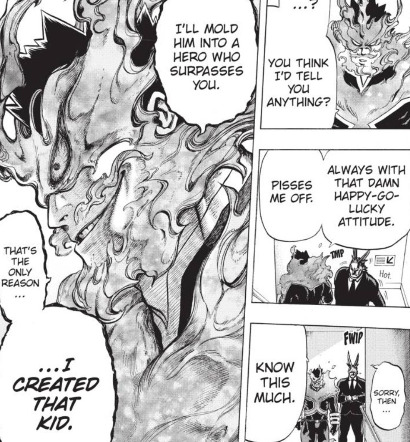
Endeavor’s mad science also literally has him treat the woman in his life as tools to use for his own amibition. He fores a marriage on a woman to use her as an unwilling accessory to his eugenics project.
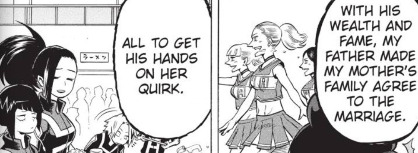
It is not specifically a story of ambition got wrong, it’s also a story of neglect and abuse of all the women in his life. Endeavor’s ambitions all center around personal greatness for him. Shoto will prove his worth as a hero, as a mentor to him, as a great father. The fact that his motives are entirely selfish, (Endeavor is not focused on being the best hero he can be, but rather his own desire to be the strongest) is something that has an affect on his family and children.
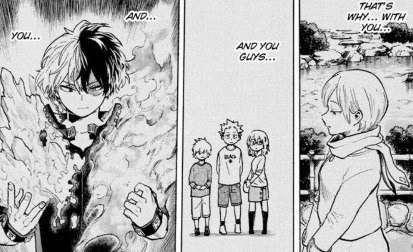
Fuyumi, Touya, and Natsuo are literally afterthoughts to Endeavor despite being just as much his children as Shoto. He literally only thinks of Rei in the context of “I needed her to give me a family.” Not only that but he’s also an extremely bad father to the one child that he does take an active role in trying to parent, acting extremely controlling towards Shoto and getting extremely angry whenever Shoto did anything that was outside of Endeavor’s wishes for Shoto to fulfill his ambitions.
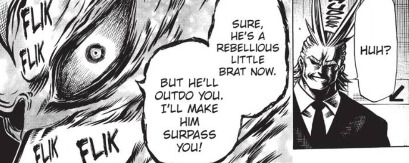
Endeavor just like Victor, inspires to greatness as a man and wants the signifiers of that as held up by society, accomplishment (Endeavor wants to be the number one rank even though he technically has far more resolved cases than All Might and the rank is literally just a number), family, and recognition despite having done none of the work. Once again why men great till they gotta be great. At the start of his arc, Endeavor feels entitled to Shoto’s love and obedience, and a role in his life, despite the fact that he’s hideously abused him for most of his life.
Endeavor like Victor, also abandons several children for failing to meet his expectations.

Part of Natsuo’s problem with Endeavor has exactly to do this sense of entitlement, Endeavor practically abandons his kids until they’re in their early twenties to the point where he wasn’t involved in their lives at all (and also separated them from their mother). Remember another point of the book is that Victor wants sole parenthood, to create life without involvement of a woman.
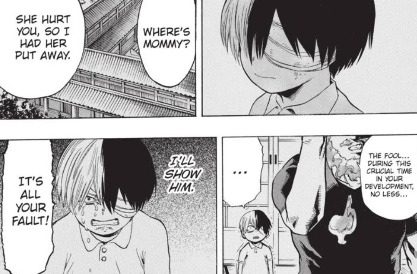
Endeavor does the exact same thing. He separates the children from their mother. Then while he is the only parent left in the household and effectively responsible for all of his children, he neglects most of them and completely fails to raise them.


It’s implied besides trying to teach Shoto to use his quirk, he’s literally pushed all of the housework, and actual parenting you know, labor that is involved in raising a child onto Fuyumi. Fuyumi has cooked most of Shoto’s meals, it’s Fuyumi who attends his school conference in the novels. Endeavor has effectively committed the same crime as Victor, creating life and then running away from it by failing to act in any way as the father to his own children. His sense of entitlement shows in his actions and the way he treats the people around him in his life, he uses them for his own ambitions and they get burned.
Endeavor is someone who has used all of the women in his life for his ambitions. Think Fuyumi, she grew up desperately wanting a family while having effectively no father and all contact cut off from her mother, and also had to take care of household chores and responsibility for both of her younger brothers. Think Rei, who has literally been institutionalized for ten years, and trauma from her experiences that haunts her to this day. Natsuo is someone who has no father, almost no relationship with his younger brother, and is still mourning his other dead brother. Shoto evens tates directly, he views Endeavor as someone to learn how to use his quirk from but hasn’t viewed him once as a father. Endeavor’s never been present as a father in Shoto’s life, despite controlling most of it and giving him all of the attention. He had ambition to pass his quirk from father to son, but never actually acted as a father.

Endeavor’s treatment of his family, and his reflection for his past actions is also shown using this metaphor for fire. All Might’s ambition to become the strongest hero for the sake of a more peaceful society, is also represented by fire. Especially a flame that he passes from one person to the next, that Nana passed to him, and he passed to Deku.

Endeavor is almost always associated with the more violent aspect of fire, when he thinks of the harm he’s done to his family it’s always juxtaposed to the fire on his face.



(The right side fire, the left side Rei’s suffering face.)
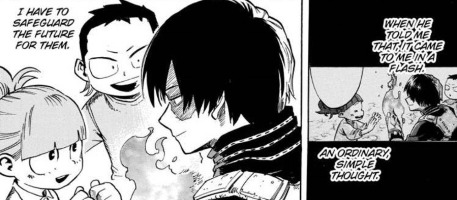
Whereas the more gentle associations with fire are almost made with Shoto. Once again the novel of Frankenstein doesn’t decry ambition, it merely explores the consequences of ambitions that were extremely self-interested from the start. Endeavor only wanted to be strong for his own sake. Shoto who wanted to become a hero like All Might who would never make his mother cry, and All Might who wanted to create a safer society are people with strong ambitions that are associated with gentler flames.
2. Dabi and Frankenstein’s Monster
Sins of the Father or Sins of the Fathers derives from biblical references primarily in the books Exodus, Deuteronomy, and Numbers to the sins or iniquities of one generation passing to another. Basically what it means is its a narrative trope where children are punished or suffer consequences for the action of their fathers. It can also mean that children inevitably reflect what their fathers have done to them, and even resemble their fathers.
Everything the monster does is a reflection of Frankentstein’s actions. Everything Dabi does is both a consequence and a reflection of Endeavor’s actions. They are both written as sons to be narrative foils to their creator. If anything Dabi is even more of a frankenstein’s monster than Shoto, because a key element to the narrative is that Frankenstein was abandoned for not being perfect according to his creator’s wishes, he was punished for a defect.

Touya just like frankenstein is a defective creation. One who suffers all of the consequences for what are his father’s sins. Endeavor deliberately took risks with his eugenics experiment that the child might have a quirk not compatible with their body, but it’s the child and not the parent who suffers all of the consequences. Toya literally died - whether he faked his death or not has yet to be revealed but he lost his home and family at a young age, spent most of his life homeless, and has to continually make use of a quirk that burns his entire body. Whether he wants them or not, his father’s sins are pushed onto Dabi.
The flame that Endeavor is so keen on passing to his children, has literally permanently disabled Dabi, and will negatively effect him for the rest of his life. Consequences that Endeavor ought to suffer are passed onto Dabi instead. Dabi is burned by Endeavor’s actions towards him.
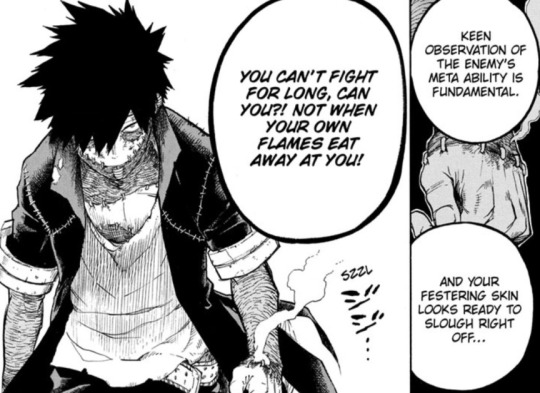
This is once again something deliberately brought up by the book Frankenstein. The doctor creates life, takes absolutely no responsibility and leaves his creature to starve to death in the wilderness, and then the first time they meet again calls upon his creation to die.
“I expected this reception,” said the dæmon. “All men hate the wretched; how, then, must I be hated, who am miserable beyond all living things! Yet you, my creator, detest and spurn me, thy creature, to whom thou art bound by ties only dissoluble by the annihilation of one of us. You purpose to kill me. How dare you sport thus with life?
The decision to create life irresponsibly was Victor’s, but the person who suffers the brunt end of the consequences is not Victor, but rather the creature itself who just like Dabi has no home, and is constistently hurt by the environment around him.
Dabi is also a symbol of the worst possible aspects of Endeavor’s ambitions.
To compare Victor and the monster briefly.
Victor
Has family / friends
Home / Money / Wealth
Arrogant / Well Educated
Self-Destructive
A tool
The Monster
Abandoned
Ignorant (at first)
Homeless
A tool, but a more sympathetic one.
As you can see they are societally complete opposites. This can be said for Endeavor as well, he still gets to keep his family, his place in society despite what he’s done, he’s wealthy, succesful and well-liked in his community. Dabi is permanently disabled because of something his father did, is legally dead, homeless, separated from his family, and is a villain.
While they are completely opposite in status, the monster and Victor are eerily similiar. They are both highly intelligent people who carry a strong ambition within them. The Monster basically learns speech, and reading all on his own, and as soon as he can be becomes as well-read as possible.
Fortunately the books were written in the language, the elements of which I had acquired at the cottage; they consisted of Paradise Lost, a volume of Plutarch’s Lives, and the Sorrows of Werter. The possession of these treasures gave me extreme delight; I now continually studied and exercised my mind upon these histories, whilst my friends were employed in their ordinary occupations.
The monster also shares several of his father’s sin. He repeats the sins that have been done on to him, in the name of vengeance. Frankenstein’s claim is that he was hurt when he was still an innocent, punished before he had done anything wrong, but he also does the exact same thing to VIctor’s youngest brother killing him when he was just a child.
Victor’s worst sin by far is selfish entitlement, forgetting to consider the feelings of his creation. Yet, the monster knowing how much he suffered by just being created in a world where there’s no one else like him also demands Victor create another creature. This is out of his own personal sense of entitlement, he believes he’s entitled to have someone love him, and if he had this he would be a good person again.
He believes quite literally he deserves an Eve to share his loneliness in. His own personal feelings of grief and hurt matter more than those of: one the people he kills, and two a potential woman who would be created only to love him.
But it was all a dream; no Eve soothed my sorrows nor shared my thoughts; I was alone. I remembered Adam’s supplication to his Creator. But where was mine? He had abandoned me, and in the bitterness of my heart I cursed him.
The monster also feels entitled to punish Frankenstein, but in this reccuring sins of the fathers he punishes people who are completely innocent of the crime that Frankenstein did to him and have nothing to do with his creation, just to get back at Frankenstein. Including, an innocent boy, a maid who he framed for murder, Frankenstein’s friend, and also Elizabeth.
Dabi inevitably reflects his father and the environment he was raised in, and resembles him. Dabi who was raised by a quirk supremacist and thrown out because his quirk wasn’t good enough, kills people he doesn’t find worthy. Dabi’s methods are almost entirely based around his his individual strength because he was raised to believe that was the only good part of him. The same way Dabi was thrown out like burnable trash for failing to live up to his standards, Dabi will enact harsh vigilante justice and kill minor crimminals and heroes who fail to live up to his justice.

Just like for the monster’s actions in punishing Victor, Dabi is called to consider the feelings of family’s of the people he kills. He is also punishing people completely unrelated to what happened to him, in his efforts to hold his father accountable.

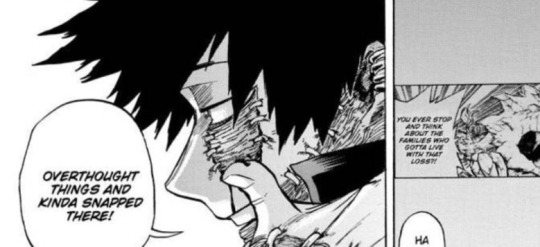
Dabi reflects his father, and quirk society the same things that burned him. He continually believes he has to be the strongest individually, accomplish everything on his own, and spurn others around him. Even those who try to make genuine connections with him like the league of villains. Dabi believes that the world has to be changed with the strength of ambitions of a single person, and his ambitions are far more important than the sense of family within the league.
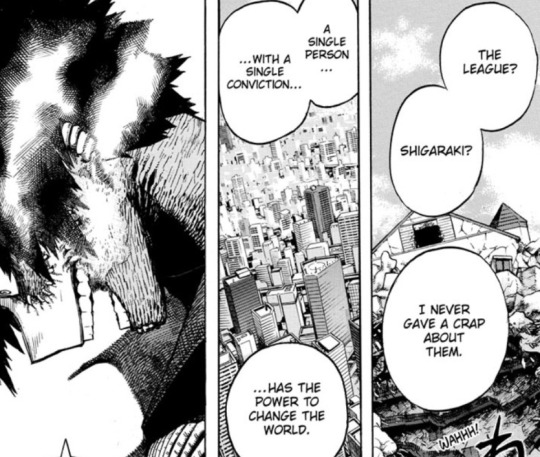
Dabi effectively distances himself from two families, the found family of the league, and also his original biological family. Think about how much it might save Natsuo to lean that his brother is still alive. Shoto at least, doesn’t want to see his father roasted alive on live television.
Dabi’s ambitions are as self destructive as his fathers, as he only knows how to fight by completely burning his body up. He harms himself over and over again by using his quirk to try to change things.
3. Endeavor and Ujiko
The book ultimately poses the question who is responsible for the actions of the monster, Frankenstein or the Monster itself. However, I think an element missed in a lot of analysis is that the mosnter accepts that most of what he has done is wrong, he just wants people to be held equally accountable for their actions.
“You, who call Frankenstein your friend, seem to have a knowledge of my crimes and his misfortunes. But in the detail which he gave you of them he could not sum up the hours and months of misery which I endured wasting in impotent passions. For while I destroyed his hopes, I did not satisfy my own desires. They were for ever ardent and craving; still I desired love and fellowship, and I was still spurned. Was there no injustice in this? Am I to be thought the only criminal, when all humankind sinned against me? Why do you not hate Felix, who drove his friend from his door with contumely? Why do you not execrate the rustic who sought to destroy the saviour of his child?
The monster’s problem is not that he shouldn’t be held accountable for his actions, but rather that he’s the only one whose ever held accountable for his actions. The Monster also spends most of the narrative being treated as a monster, whereas Frankenstein faces no real consequences for what he’s done from the people around him, never loses his standing in society, never is cast out for his wrongs. Frankenstein continually avoids any and all responsibility towards the monster up until his death, and only takes responsibility in violently trying to kill his creation.
There are also oppurtunities for Frankenstein to take responsibility, which he chooses not to do anything. An innocent maid is about to be executed for a crime that Frankenstein knows she did not commit, and instead of trying to help her by explaining to everyone his creation of the creature, and also that the creature is likely responsible for the murder he says nothing. While not responsible for the women’s death, he is culpable in that he could have taken action to save her but didn’t.
Franketnstein’s actions are again and again always to run away from the monster and avoid responsibility. From the beginning he runs away from the monster due to it simply being ugly. Both the monster (and also Toya) were punished when they were innocent children who had not committed any kind of crime, by the person who was responsible for raising them, educating them, and giving them everything they needed to become happy adults.
“Remember that I am thy creature; I ought to be thy Adam, but I am rather the fallen angel, whom thou drivest from joy for no misdeed. Everywhere I see bliss, from which I alone am irrevocably excluded. I was benevolent and good; misery made me a fiend. Make me happy, and I shall again be virtuous.”
While Frankenstein and the Monster both entitled, their reasons for entitlement come from entirely different places. Frankenstein’s comes from his own arrogance, believing that he’s destined to do great things, and be a man of status and accomplishment. Why men great till they gotta be great.
The monster believes he’s entitled to a family, because his father abandoned him, and he’s been homeless most of his life. The monster is violent, but only after he’s endured violence from people several times over. The monster is ultimately a victim of circumstance, and Frankenstein is the one who created that circumstance.
Considering Frankenstein and the monster are foils, there’s a reason that Frankenstein fears and abhors the monster before it’s even awake. It’s because the monster reflects the ugliness of his own actions. The ugliness in himself that he is completely unable to face. He is a negative character foil in a character sense, and a shadow created by Frankenstein’s actions.
The monster shows Victor what he is, selfish, entitled, and violent. Victor can’t ever confront the monster, because he can never confront those flaws within himself.
Dabi is a reflection of Endeavor’s violent, abusive nature. He is also the direct consequence of all of Endeavor’s actions. So the question is, has Endeavor confronted the monstrous side of his actions? The answer is most likely no, because despite doing things as bad as any villain in the story he still views himself as the hero.
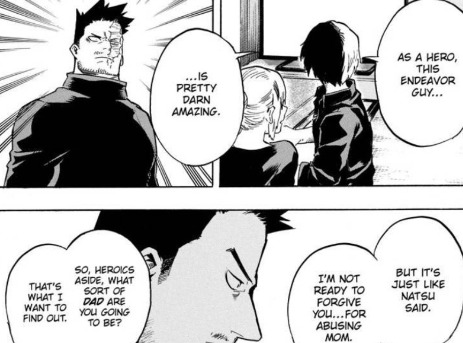
Shoto even tells us directly. Endeavor the hero and Endeavor the father are so different they’re almost like two different people. Endeavor continuing to be a hero on the television and coming home to his family is not taking repsonsibility for his actions, not truly, because he still hasn’t accepted the worst of what he’s done.

In the narrative Endeavor currently feels guilt, and also a desire to atone but we’re also told again and again that atoning means taking responsibility and carrying everything. No building a house where his family doesn’t have to be around him and taking steps to distance himself isn’t taking full resposnibility because Dabi is still running around. Dabi is the embodiment of the absolute worst of Endeavor’s actions, the toxic environment that literally killed Toya, burned Shoto, and hospitalized Rei. I would say Endeavor still hans’t seen the worst of his actions because he still views himself as the hero, just the hero who has made mistakes. We’re shown this in foiling, the same way Fankenstein rejects the monster, Endeavor doesn’t recognize Dabi even though he is literally his own son.
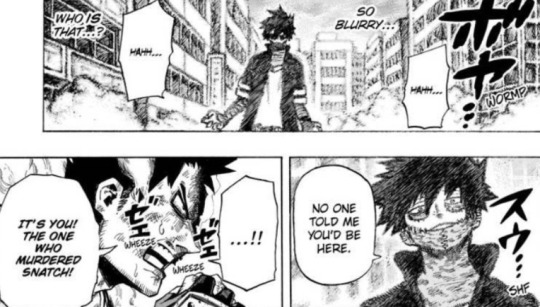
The strongest evidence of this is Endeavor and Ujiko’s foiling. They are two characters who have a lot in common, they both used children as experiments in their attempts to create stronger quirks including their own family members (Ujiko experimented on his own nephew).
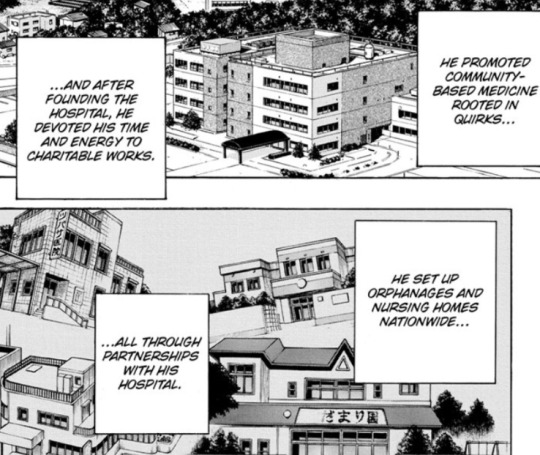
They’re both men of incredible wealth and status in society, who have deliberately used their status to cover up their cimes. Endeavor used his status to hospitalize his wife for years, he used his status to marry her in the first place, Ujiko uses all of his money and resources to find people to experiment on, and deliberately takes advantage of people in need by using his orphanage and hospitals to farm for materials to make his Nomus with.
They’re both motivated by their own personal ambitions. They also feel entitled, Ujiko’s specific issue is that the scientific community failed to give him the respect and funding for his research that he thought he was owed.
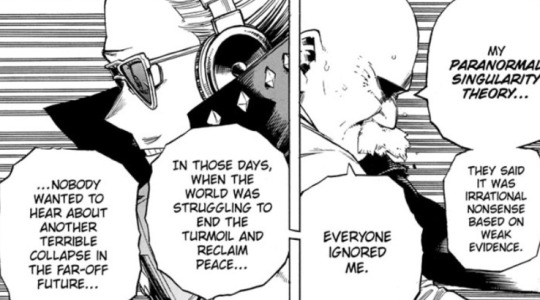
The source of Endeavor’s pain is that no matter how hard he works he’ll never become the strongest. The source of Ujiko’s pain is that nobody recognizes his work and achievements in his scientific community. They both want their hard work to turn into achievement, for their efforts to pay off, which again is not a bad thing until they get angry when they’re not given what they think they’re owed.
Ujiko and Endeavor both become so desperate to accomplish their ambitions that they manipulate people to become tools to fulfill their ambitions for them. Shoto has to carry on his legacy, and learn to use his flame side like Endeavor always wanted. They both create children that they are technically the parent of, but don’t act as fathers. Endeavor is responsible for Fuyumi, Natsuo, Touya, and Todoroki but fails to live up to that responsibility. Ujiko creates the Nomu, which just like the monster in Frankenstein are new life created from the corpses of other people, and then just uses them and disposes them as tools.
Ujiko even utters a line that is incredibly similiar to Endeavor in the regards to the way they treat Shigaraki and Shoto.


However how does Endeavor react to Ujiko? Does he understand the harm that he’s done in a new light? No, he falls back on his hero narrative. I am the hero, and Ujiko is the utlimate evil.

Endeavor so far, like Frankenstein, fails to truly confront the monster. Even when he finally realizes the destructive nature of his desire to be stronger than anyone else when he fights the Nomu, his response is to burn it alive. What is Endeavor’s response? To play hero, and defeat a villain.
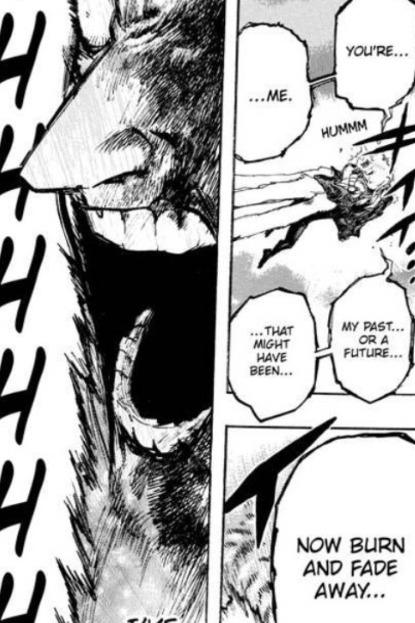
The thing about jungian shadow arcs is that you don’t destroy your shadow, you reintegrated it. Endeavor can’t symbolically murder his past self because that won’t make his past actions go away, he can only accept them. The question now is: will he do the same thing to Dabi?
When confronted with who Dabi is and his role in creating Dabi, what will Endeavor’s choice be? Is he going to play the hero, and destroy the villain he sees in front of him. The same way he did with the Nomu, the same way he did with Ujiko, the same way he’s trying to do with Shigaraki (who is, you know a heavy parallel to his own son Toya, and another abused child).

Will Endeavor act as a hero, or the remorseful father he also is? That choice is utlimately what Endeavor’s entire character is written around, does he want to finally be a father or does he want to keep being endeavor the hero? What is more important to him his own ambitions as a hero, or the people he’s harmed?
Just like Victor, Endeavor’s entire arc revolves around Dabi. He is a hero directly responsible for the creation of a villain. Dabi would not exist if it were not for Endeavor’s direct actions. Not only that but his future will be determined by how he chooses to interact with Dabi once he knows the truth. Endeavor cannot truly take responsibility until he takes responsibility for Dabi.
#mha meta#mha dabi#dabi is touya#dabi#enji todoroki#endeavor#frankenstein#mary shelley's frankenstein#Sometimes you gotta wake up in the morning and decide to spend your entire day writing an incredibly long essay about classic literature
227 notes
·
View notes